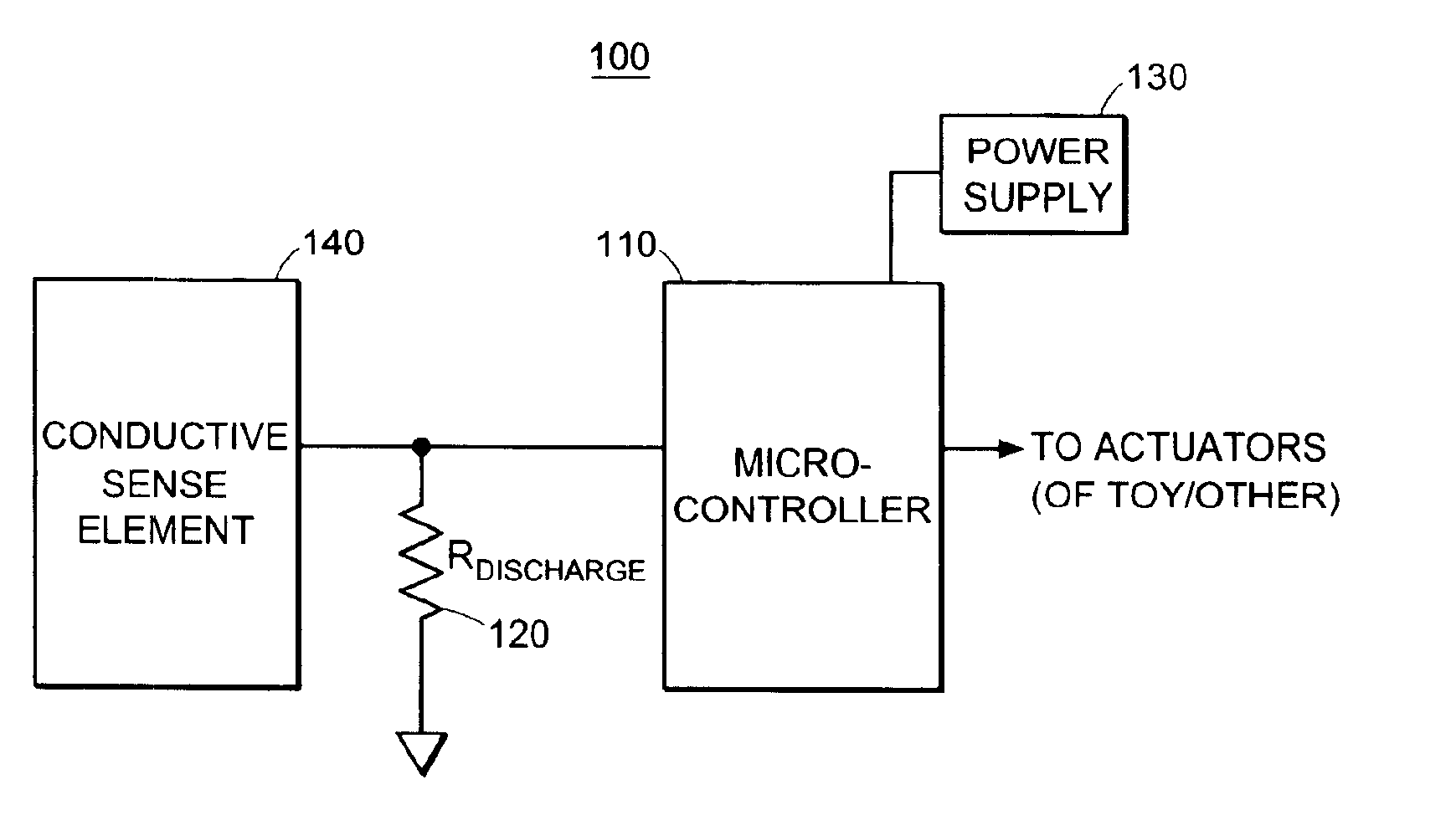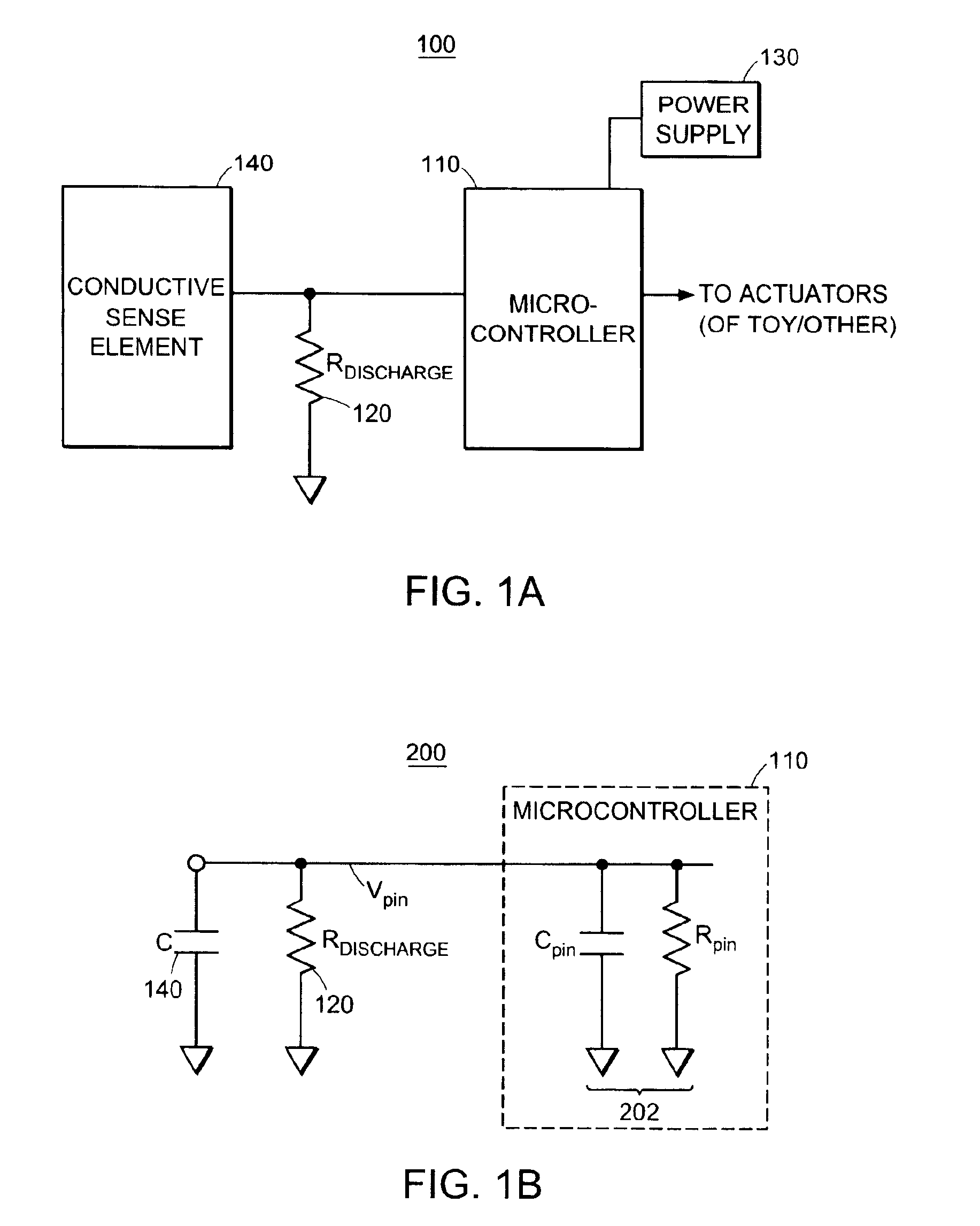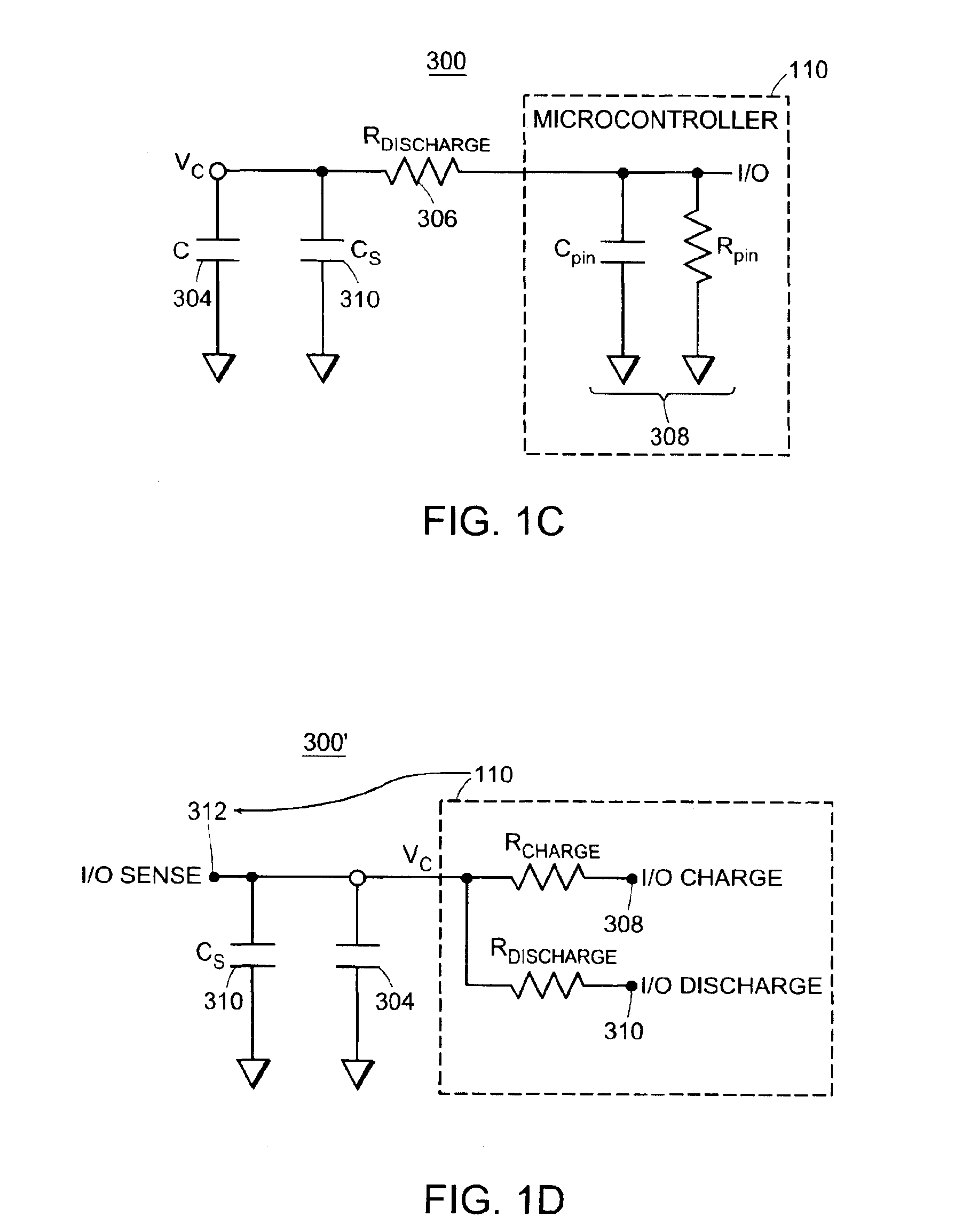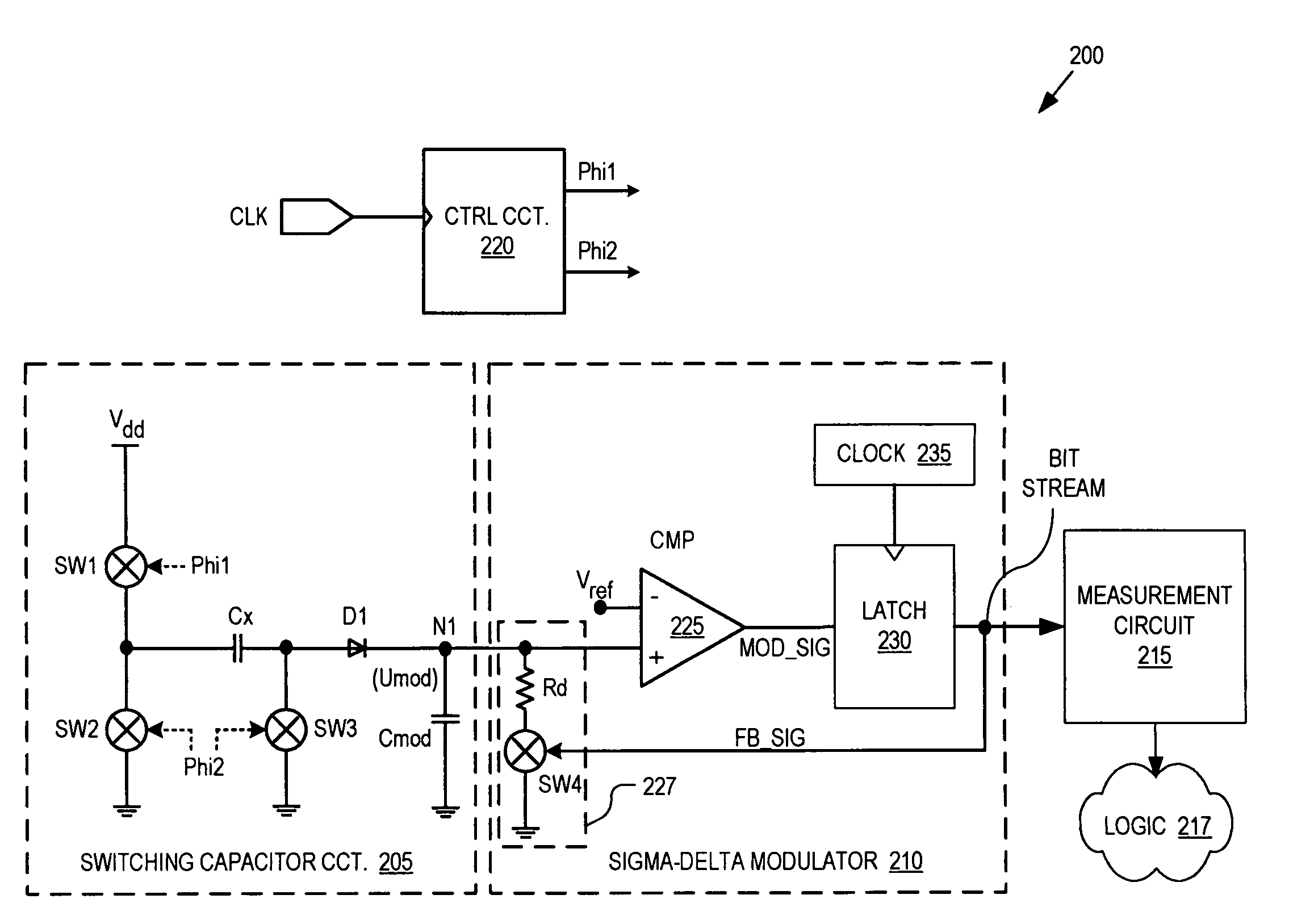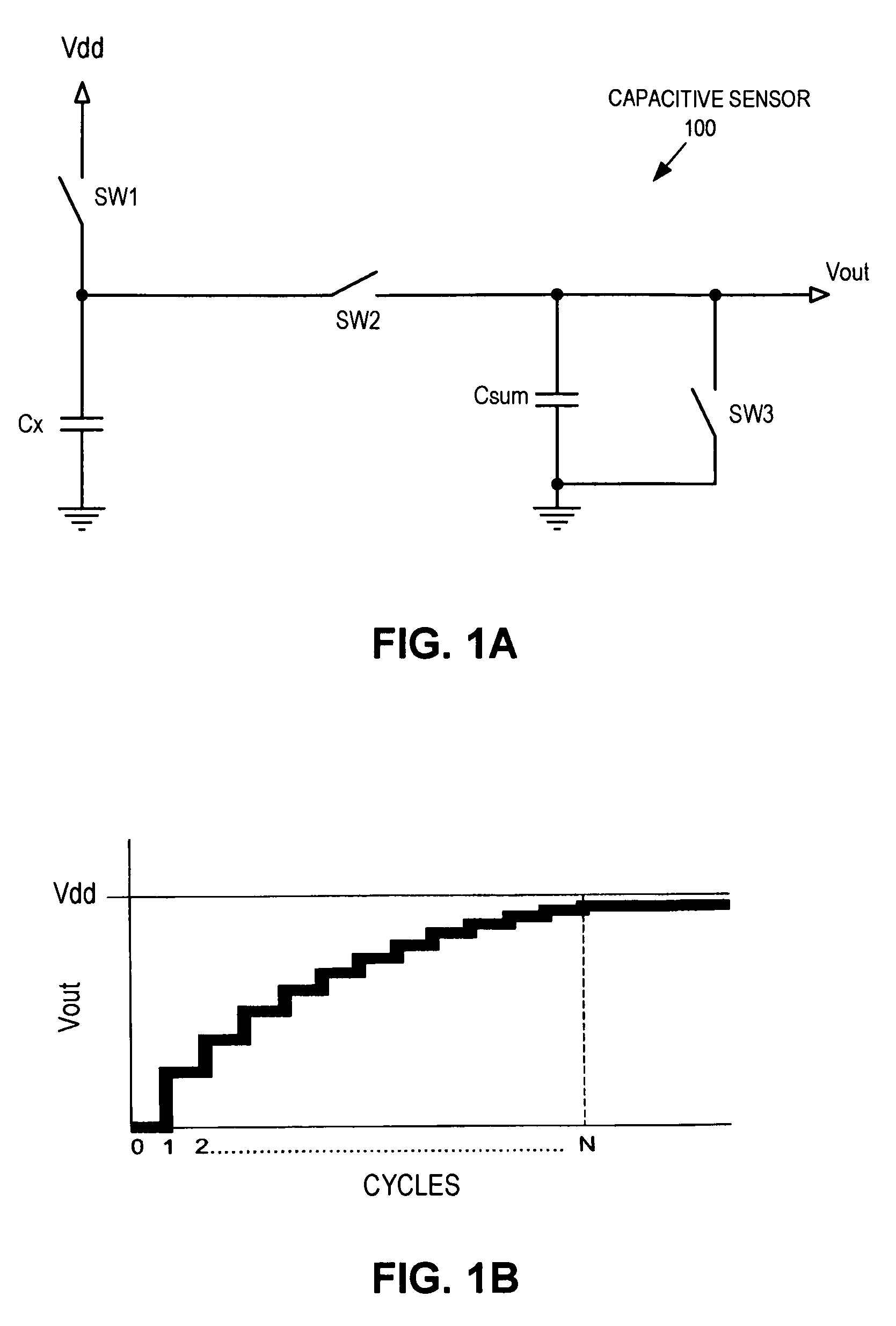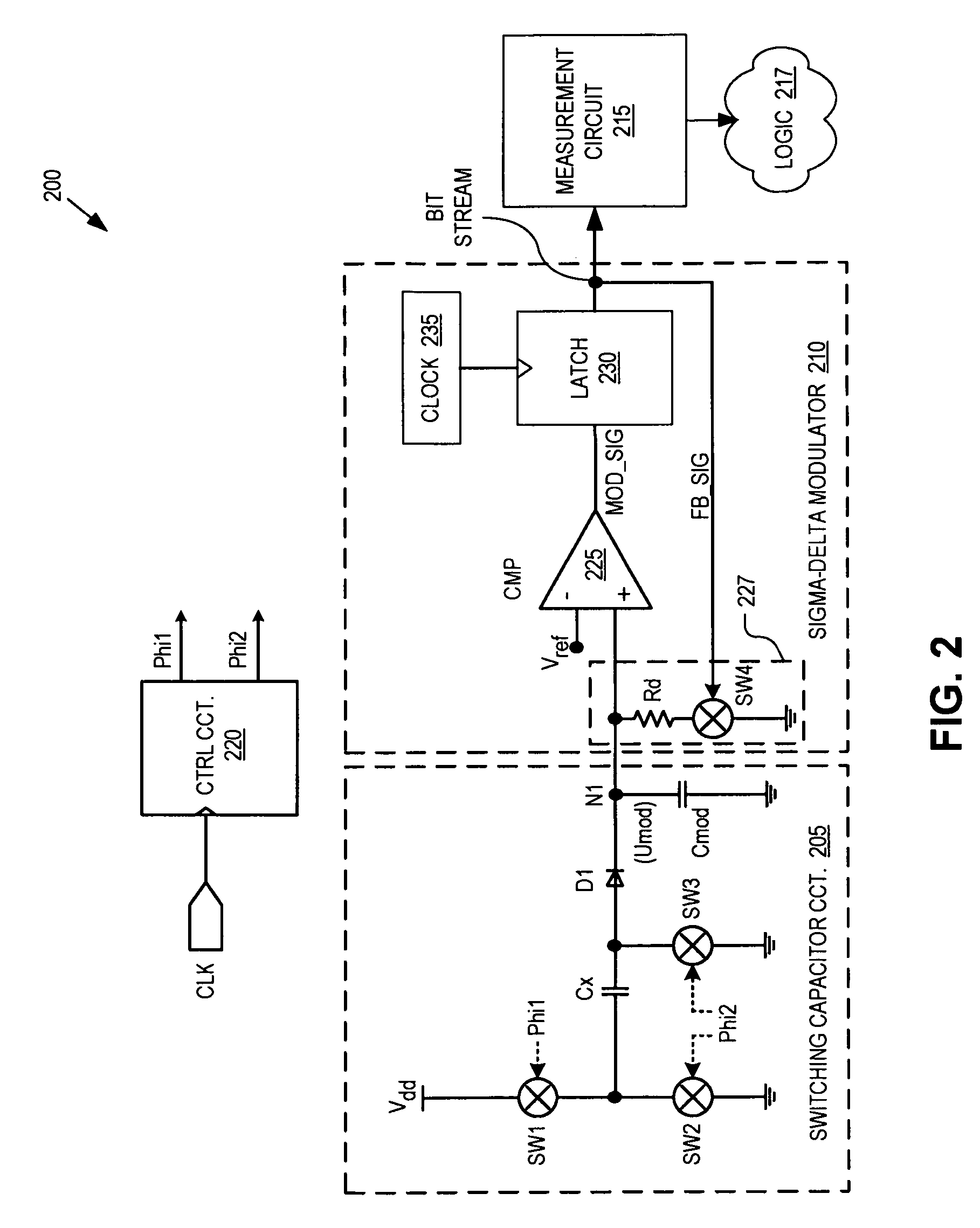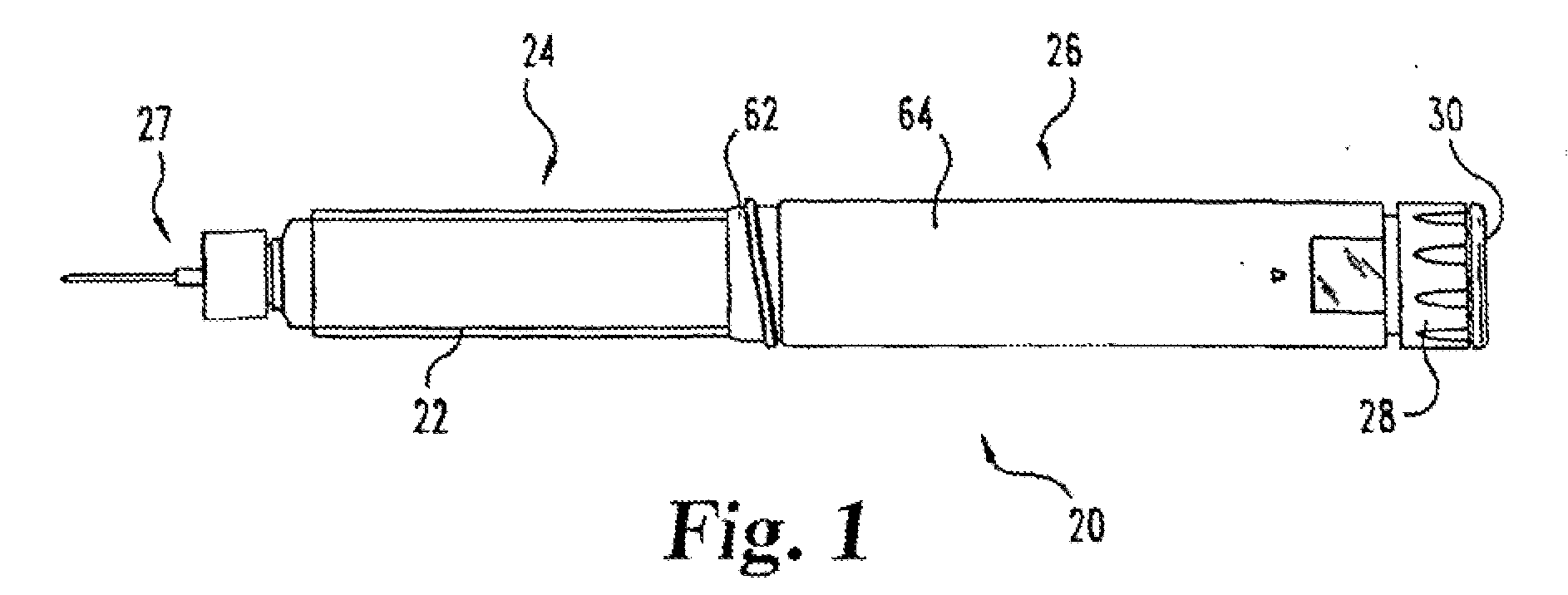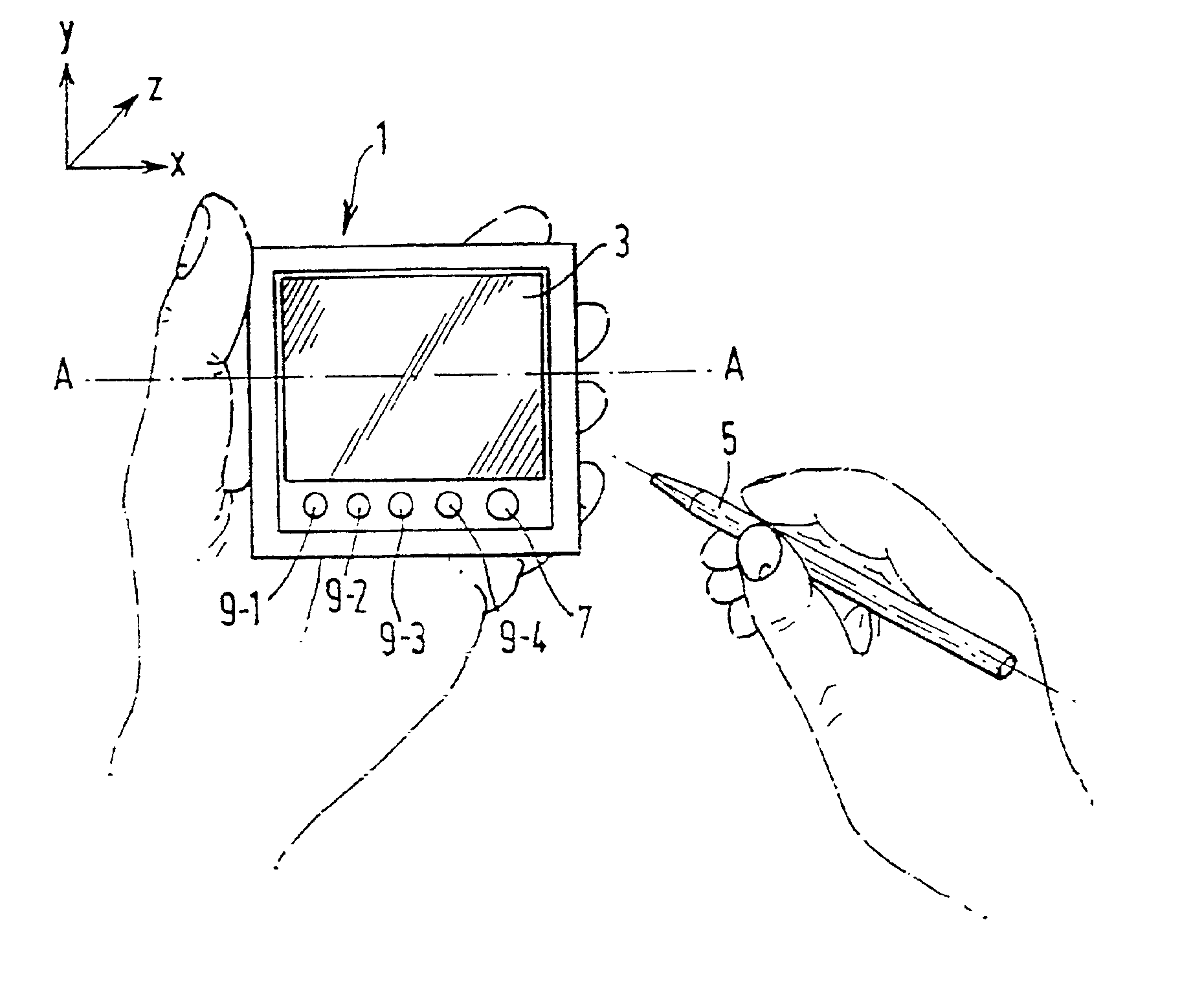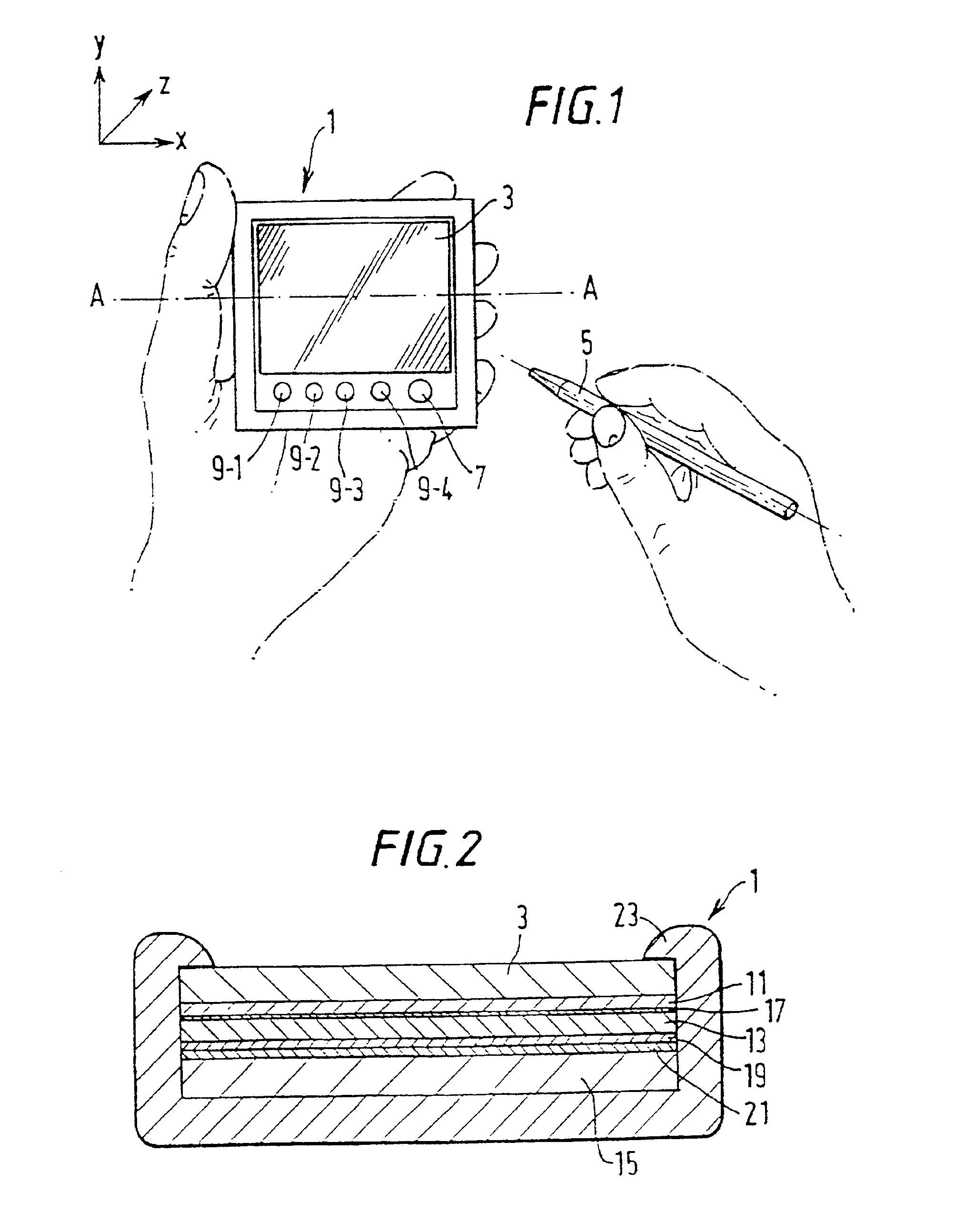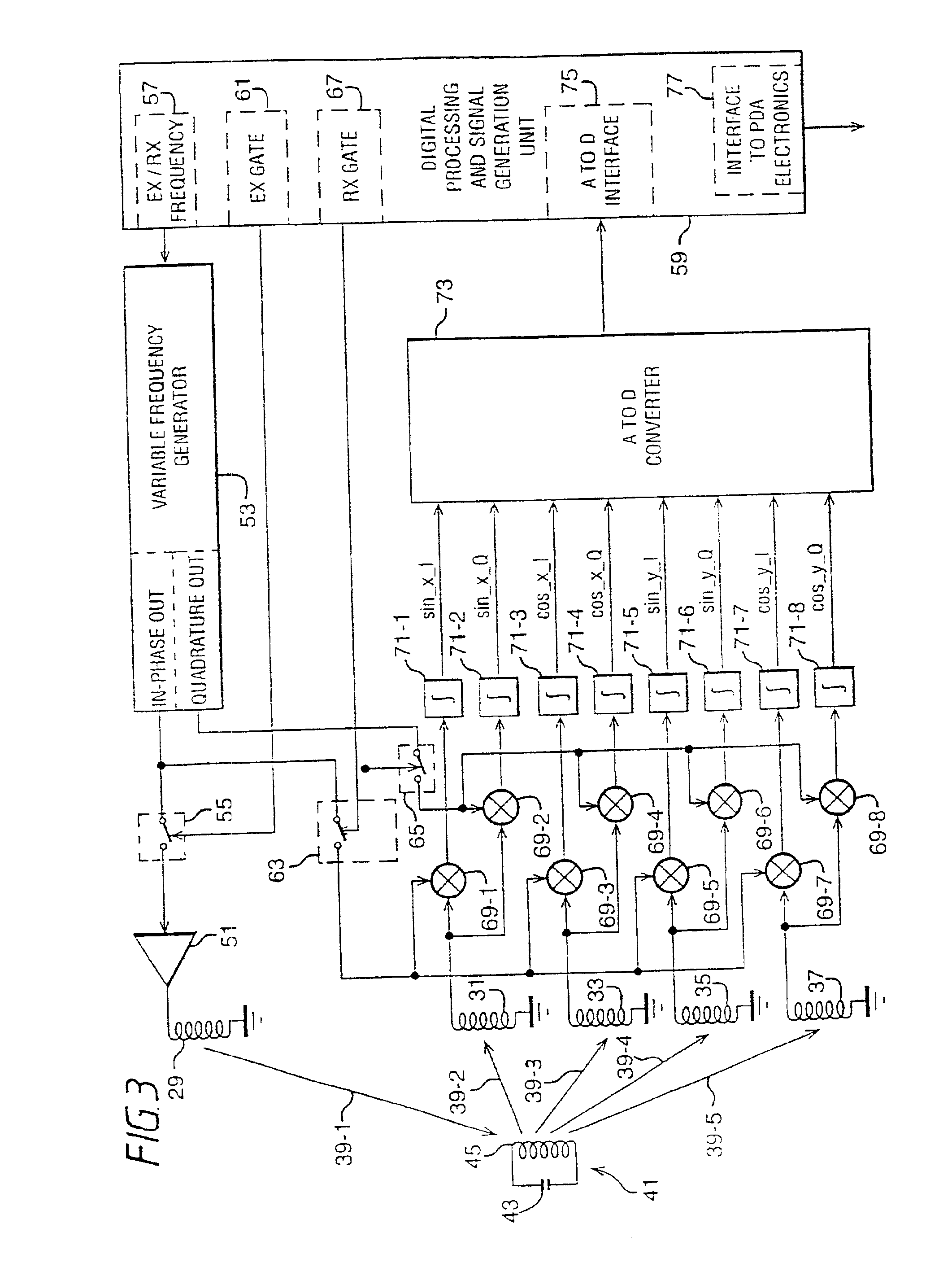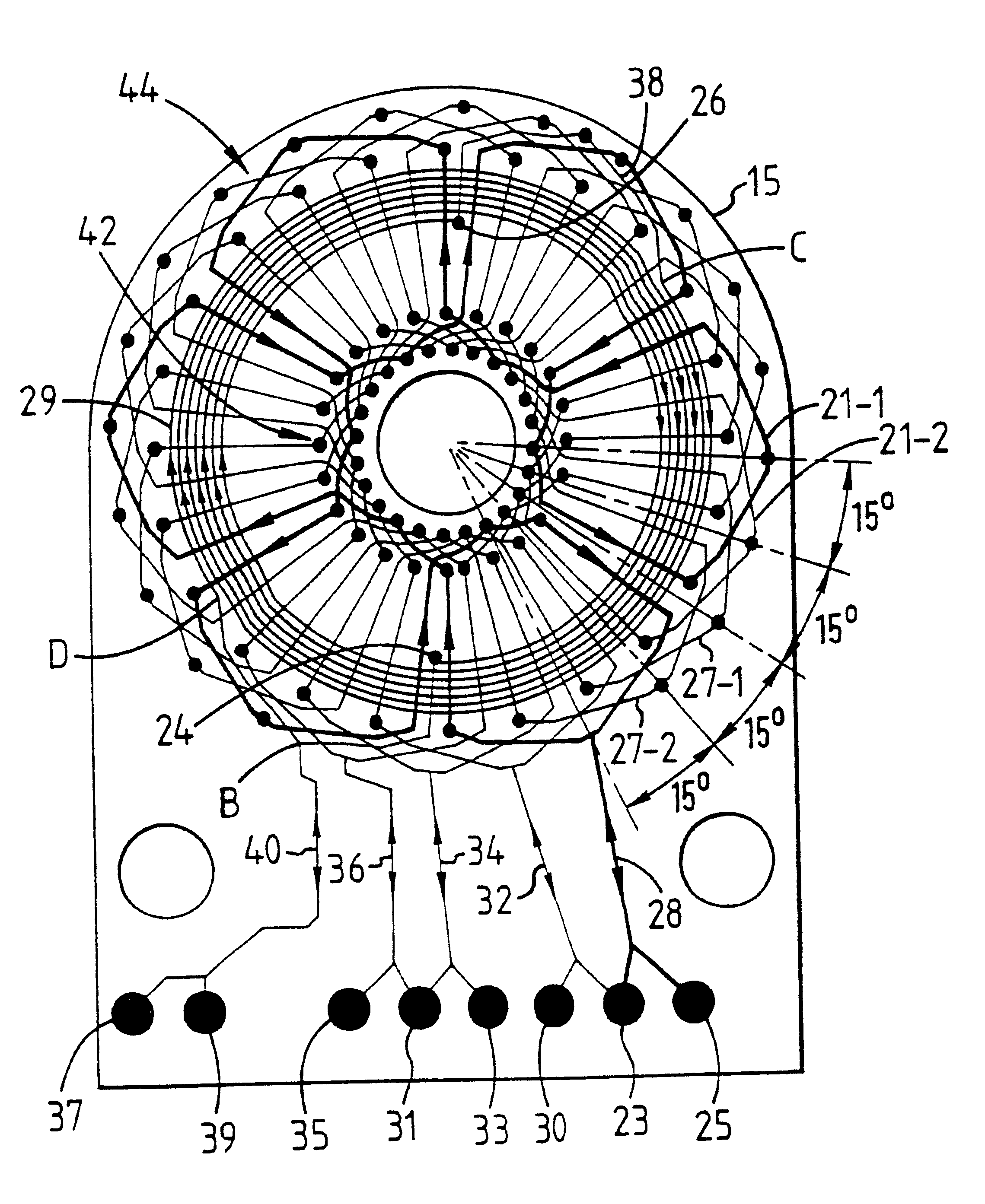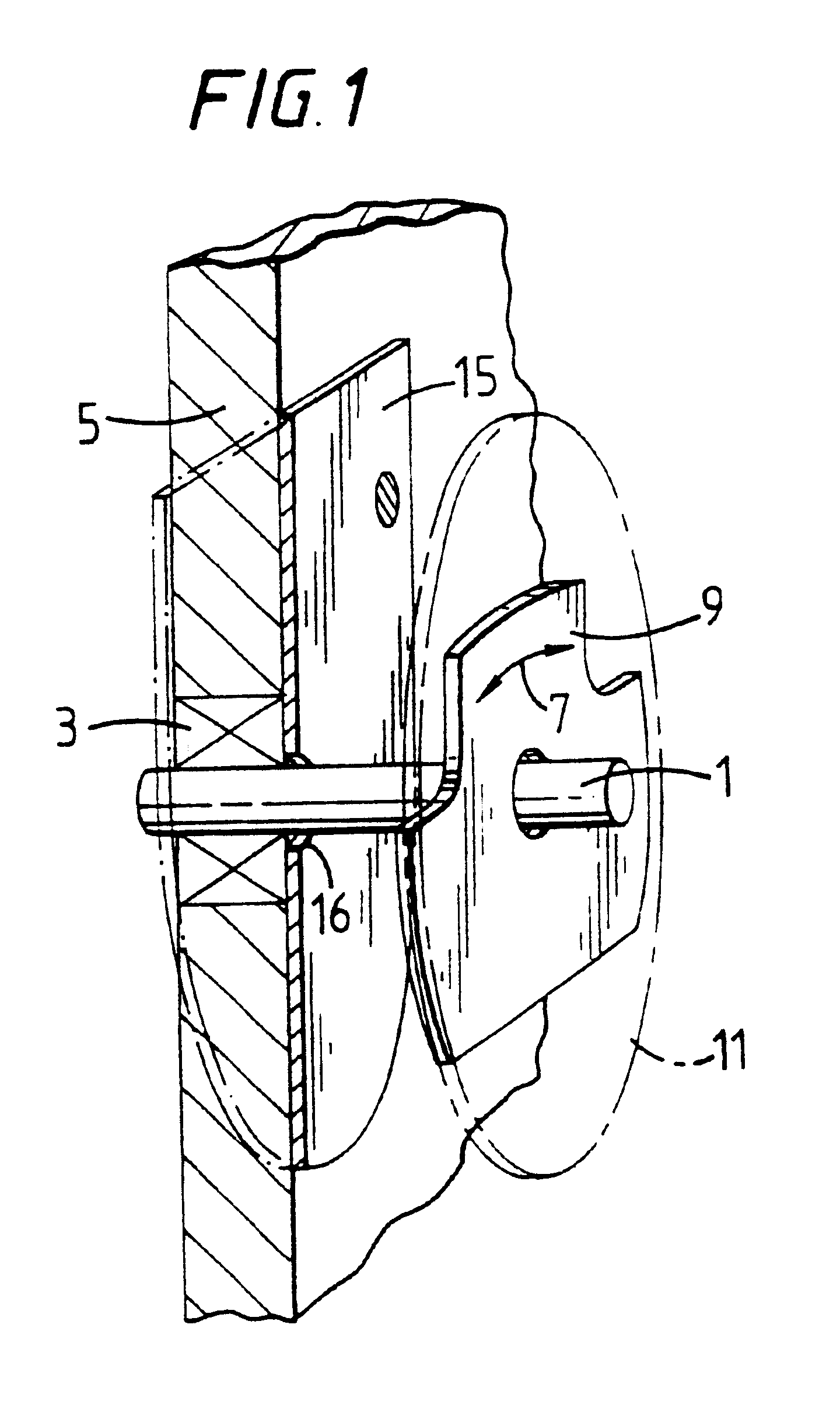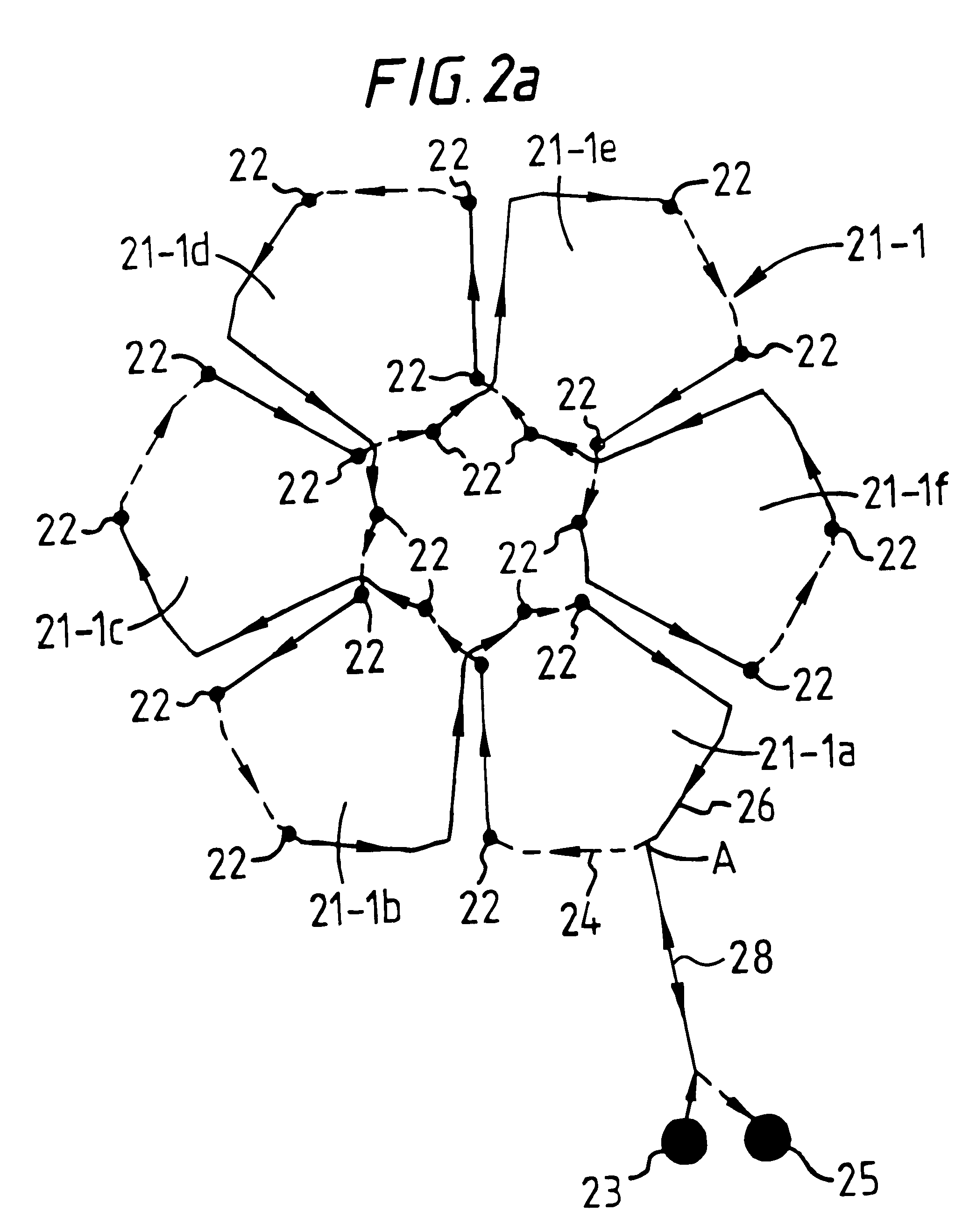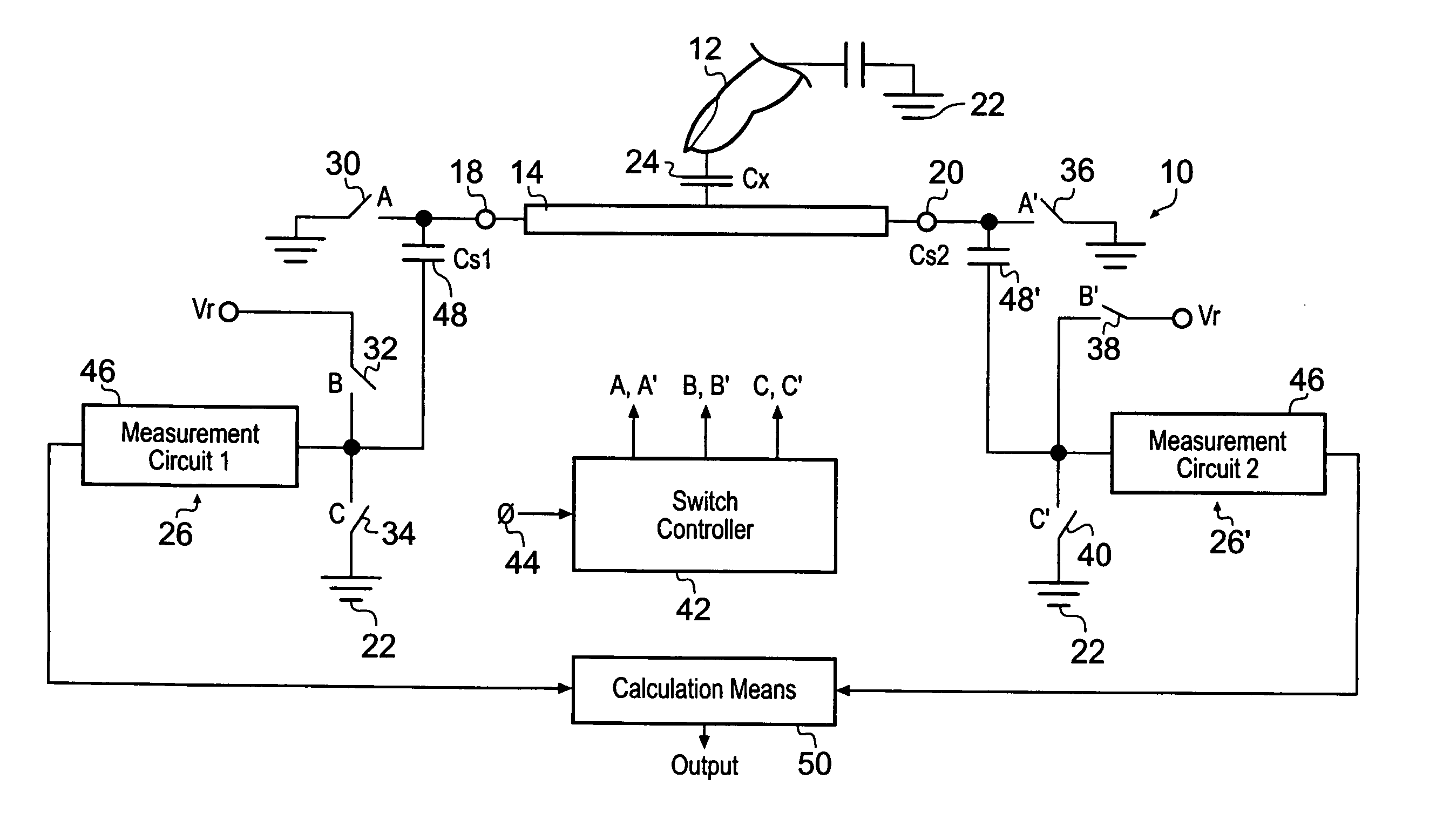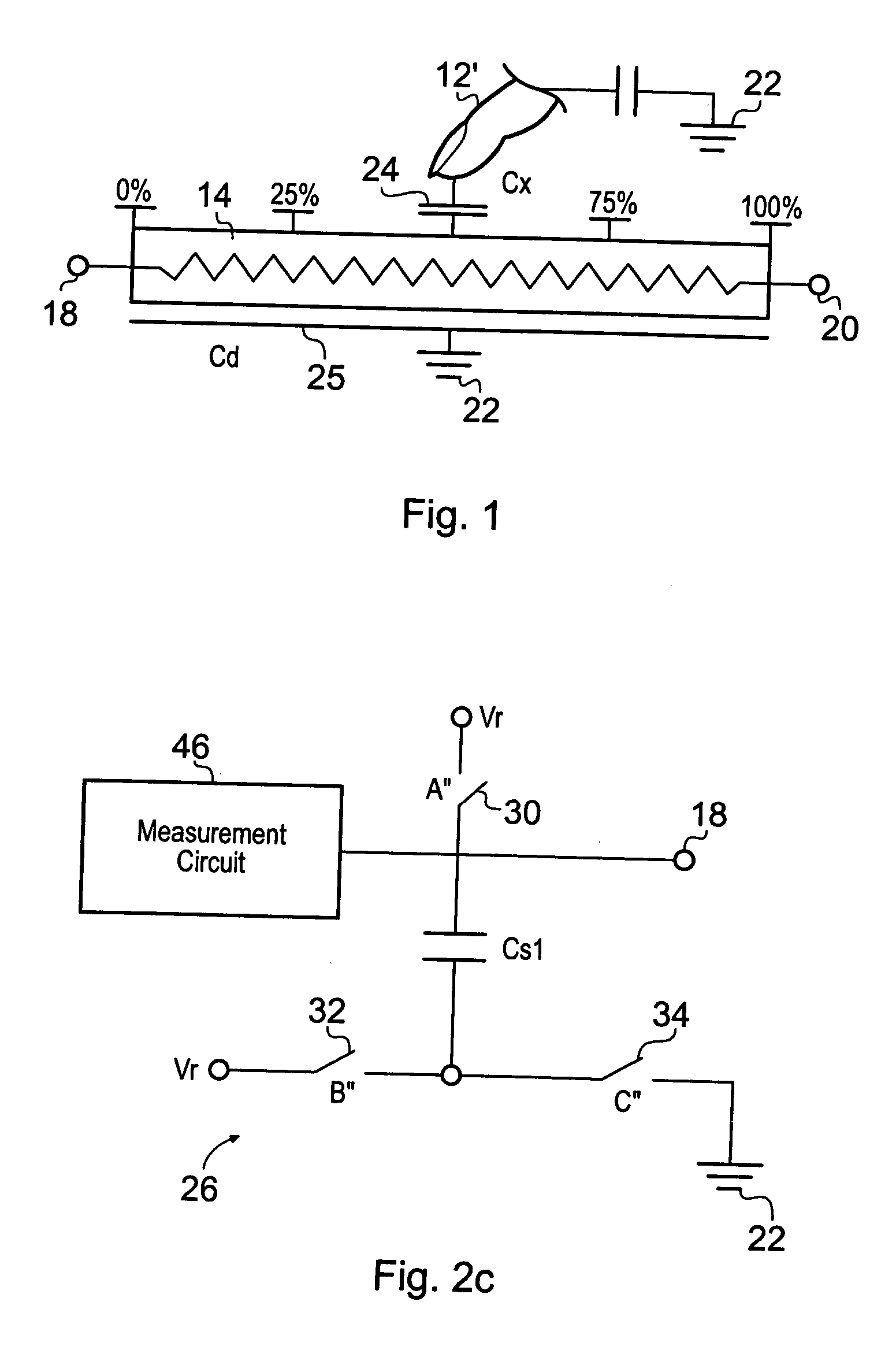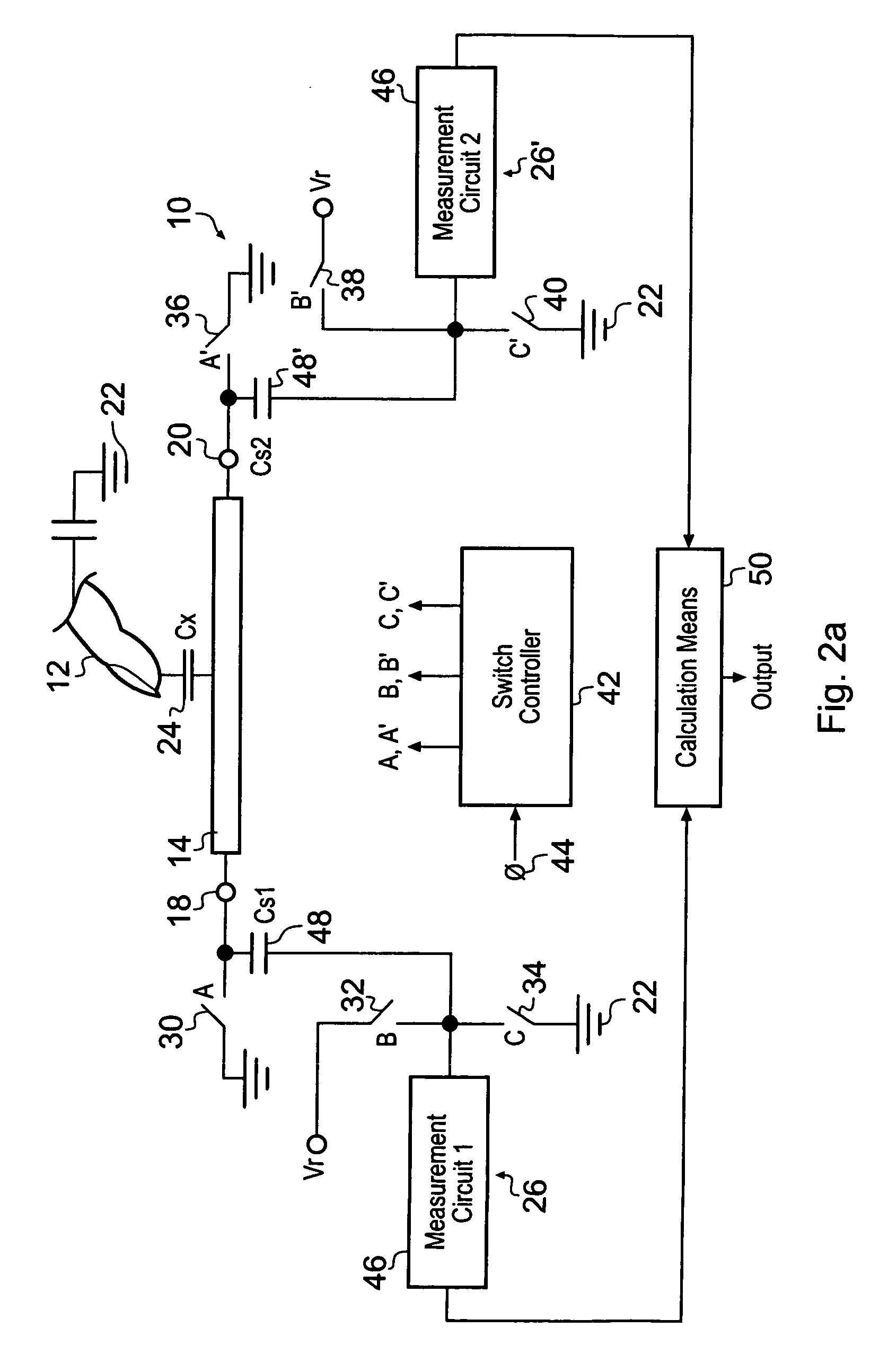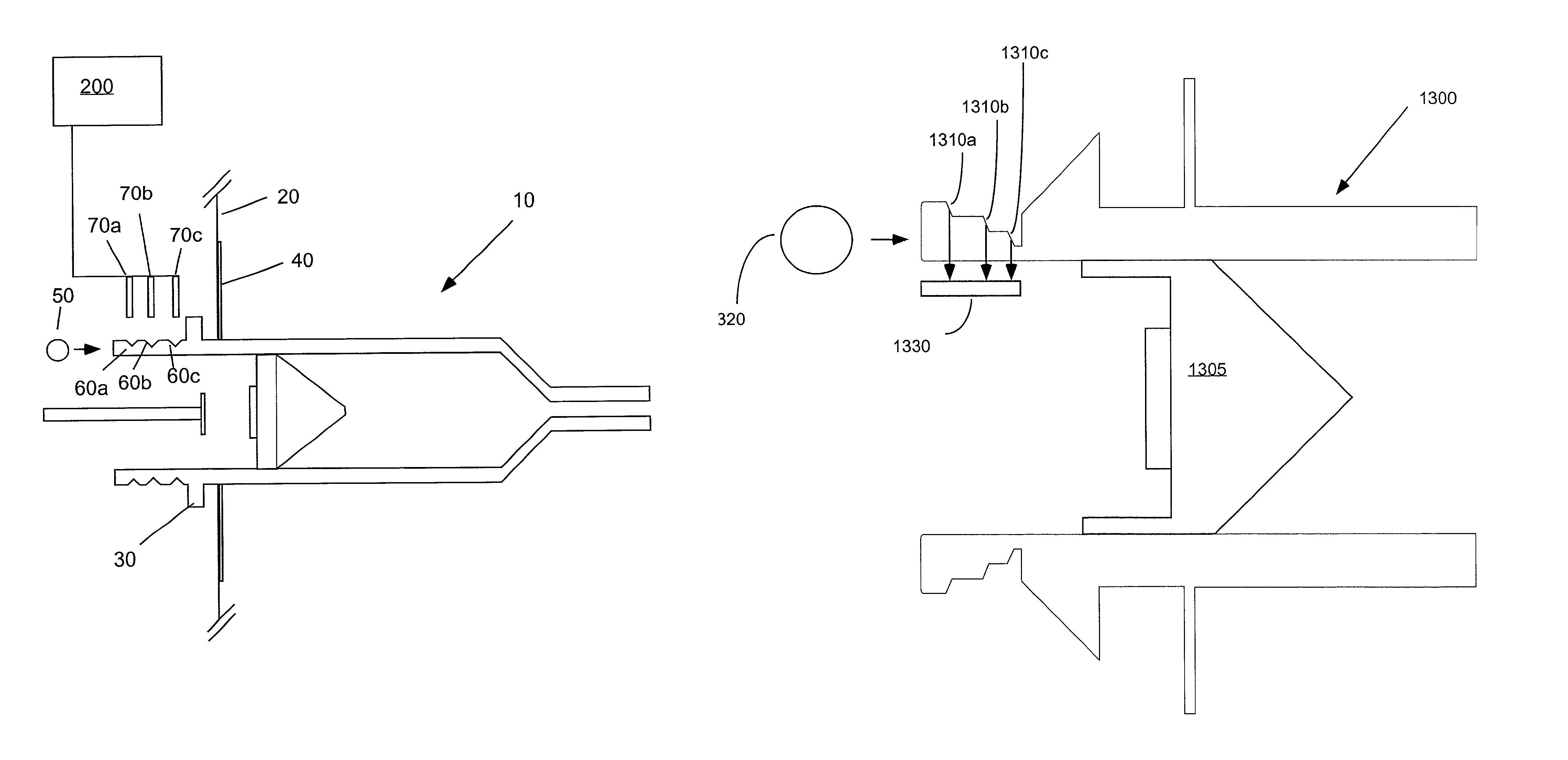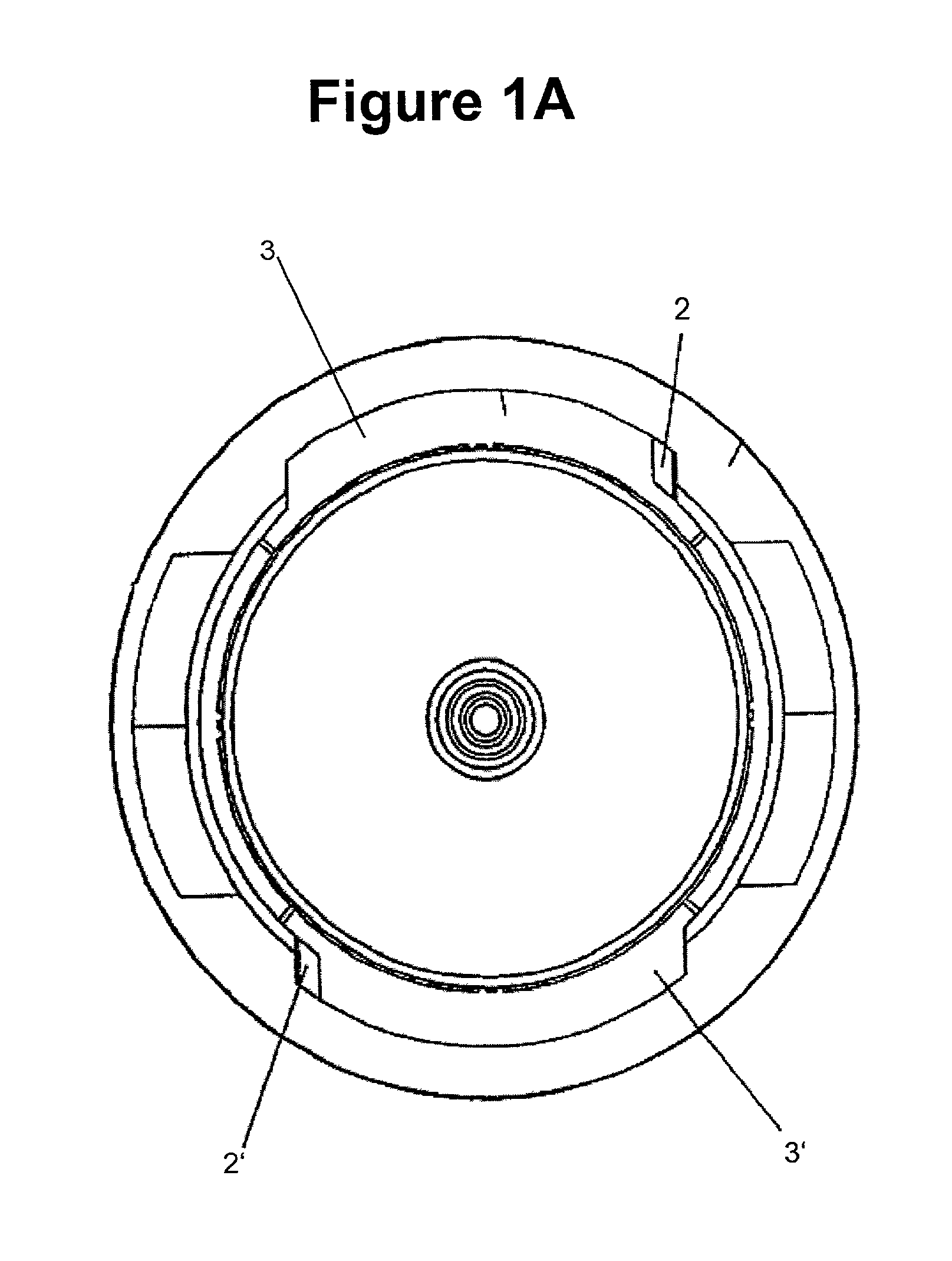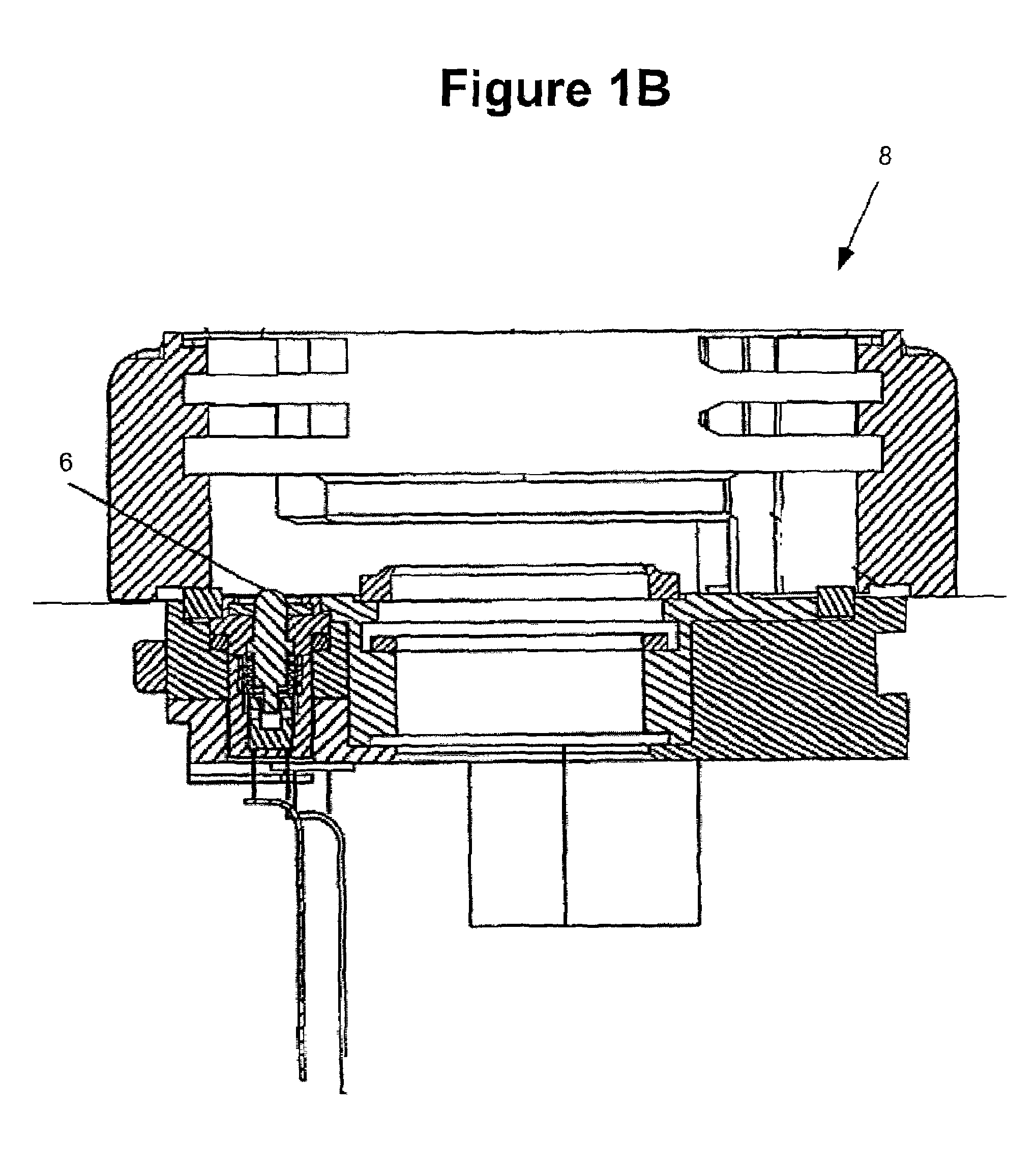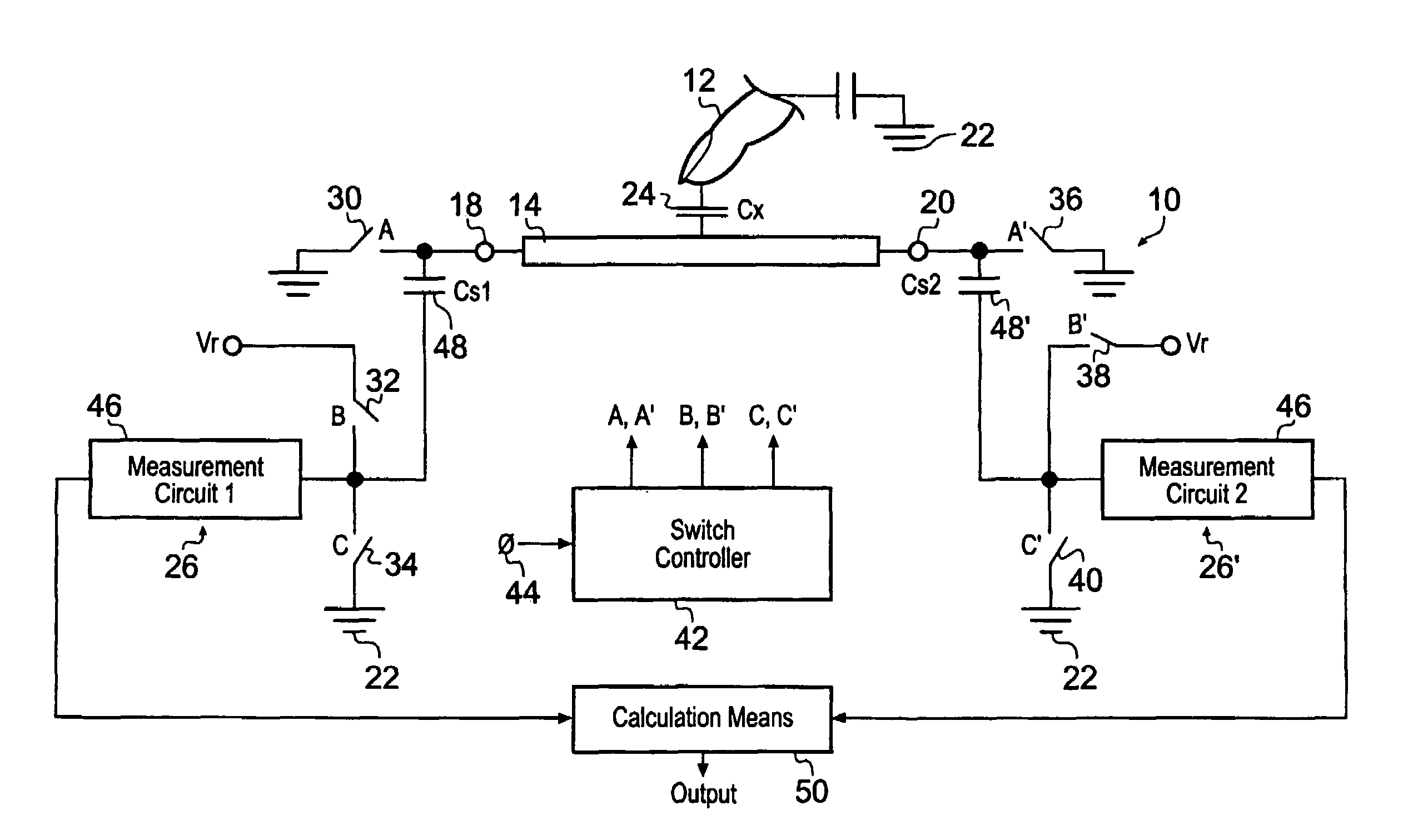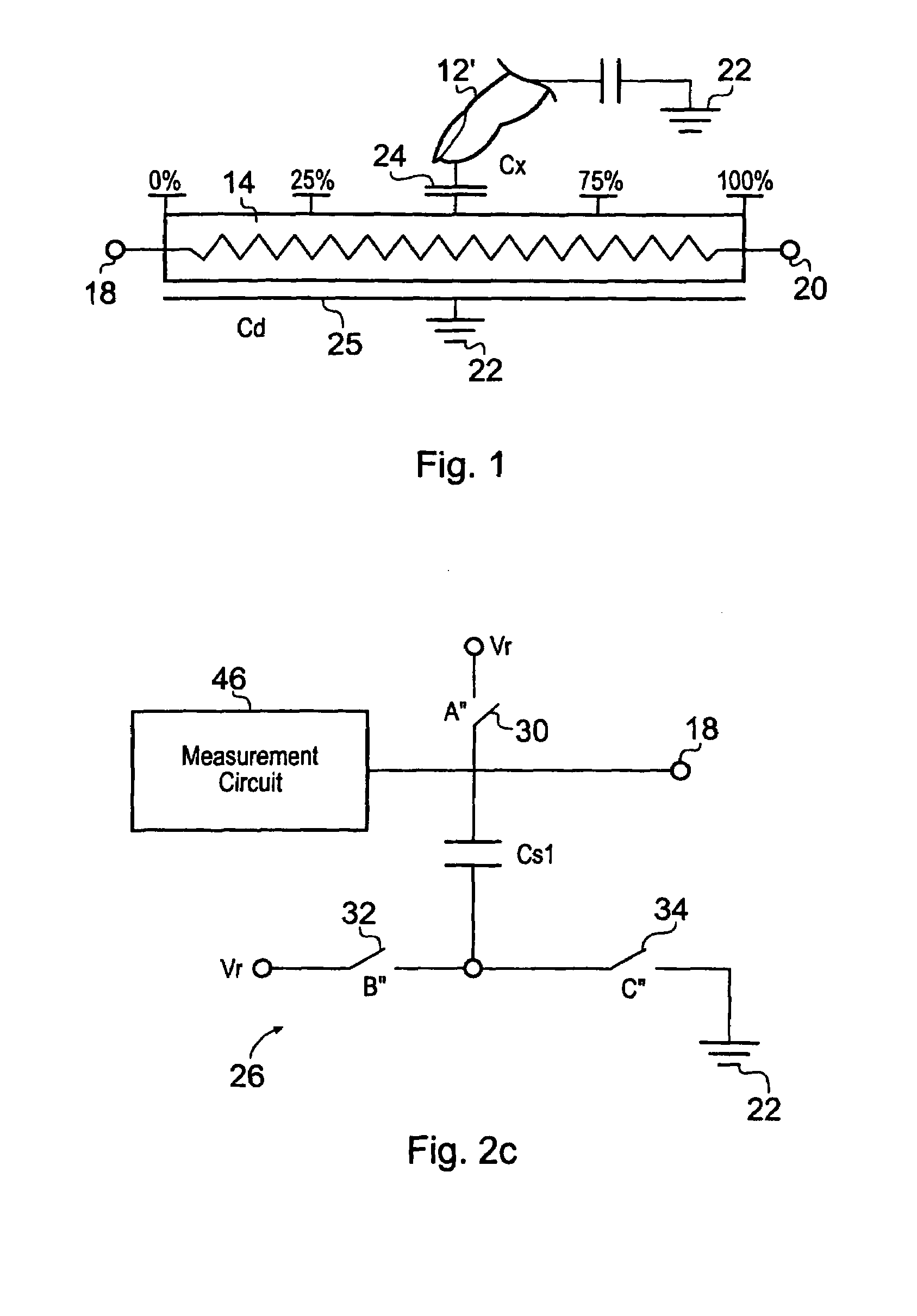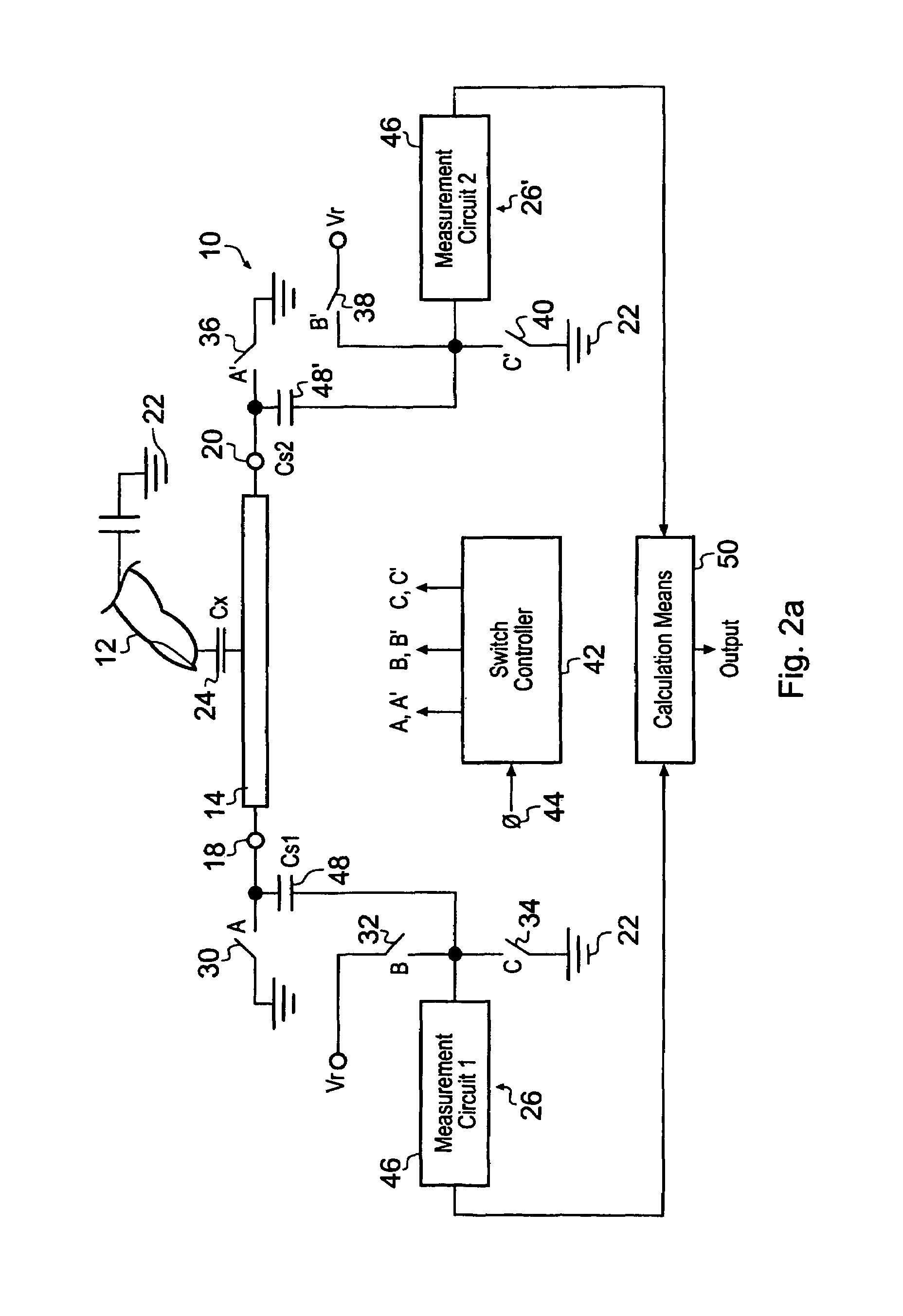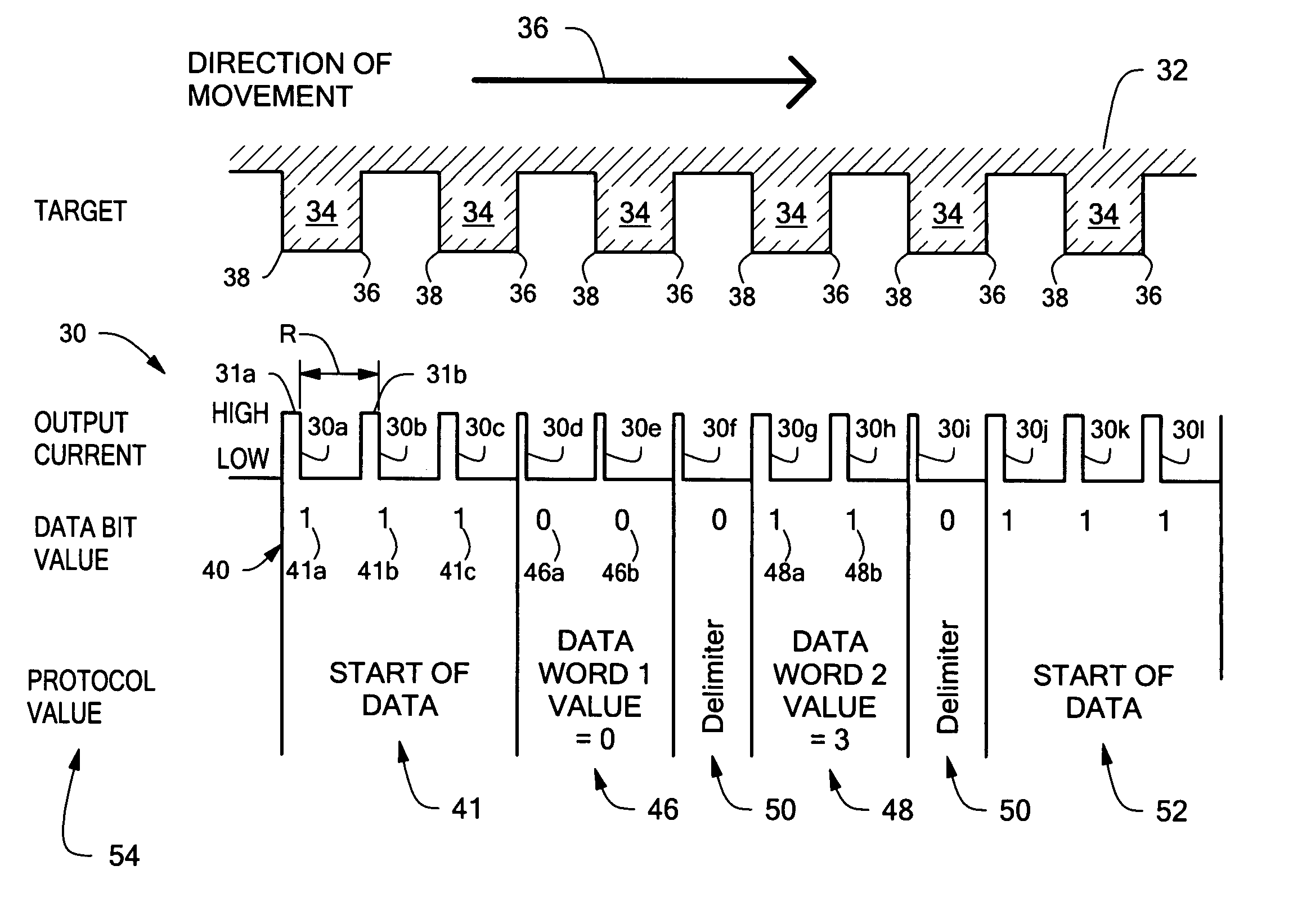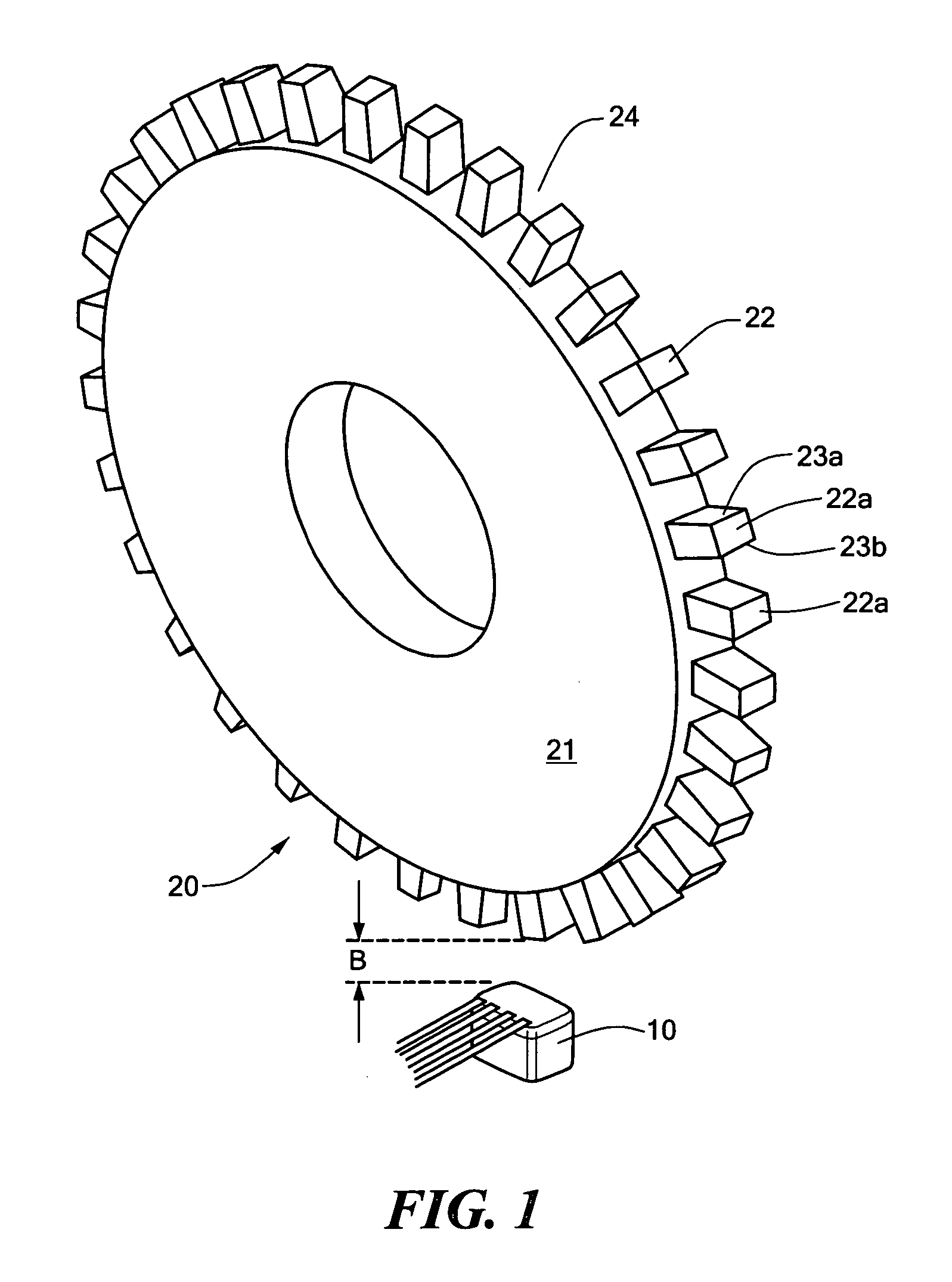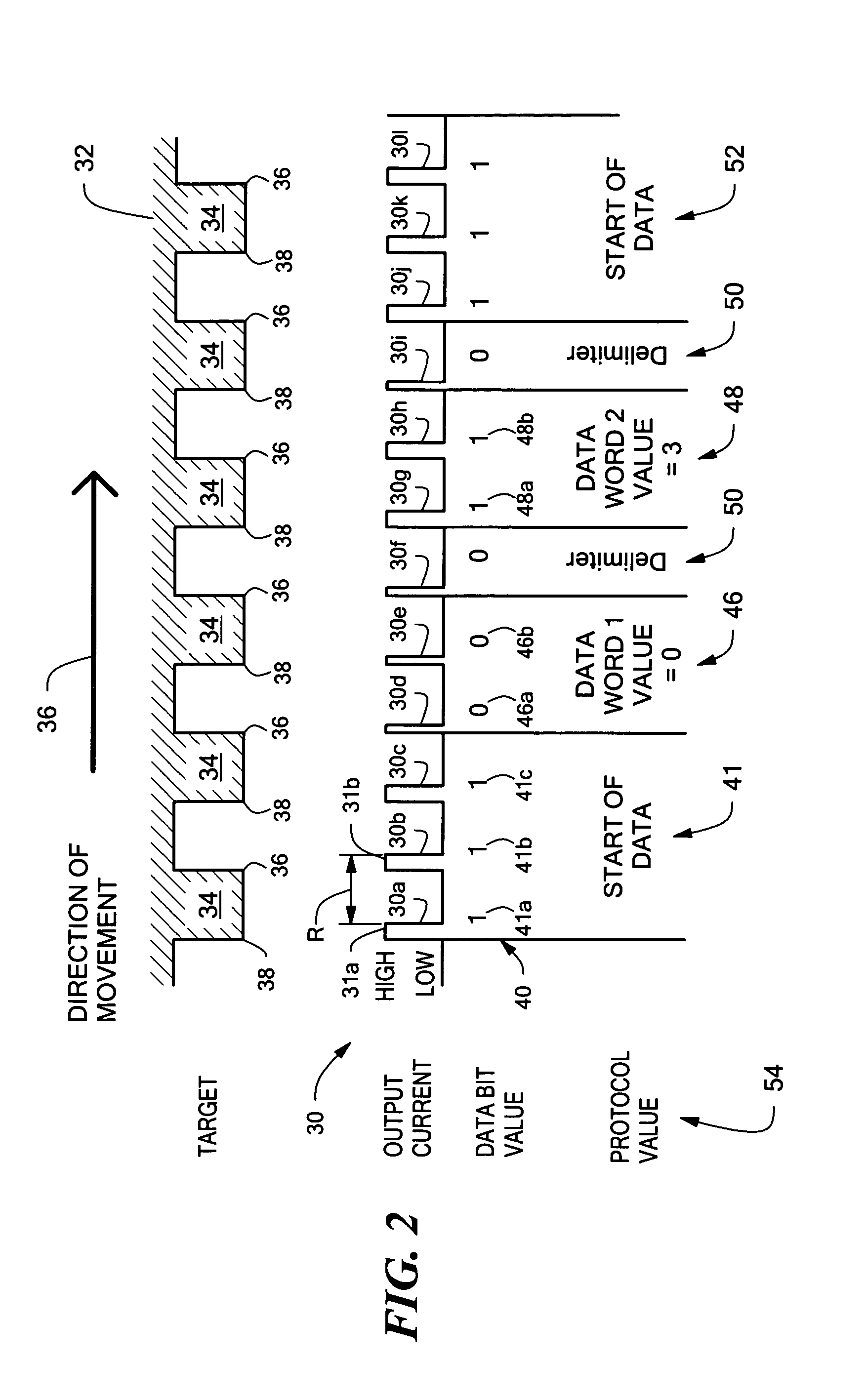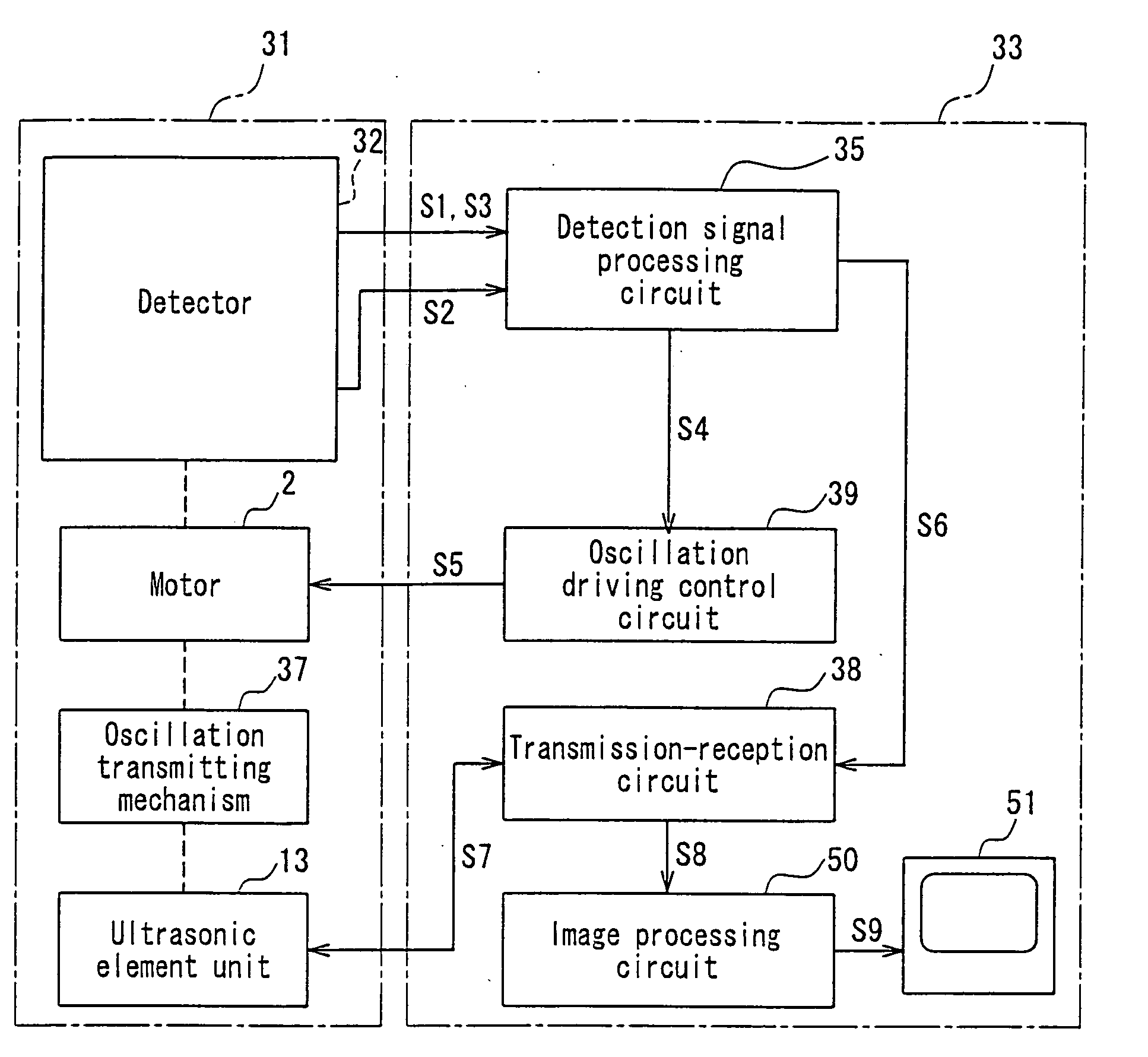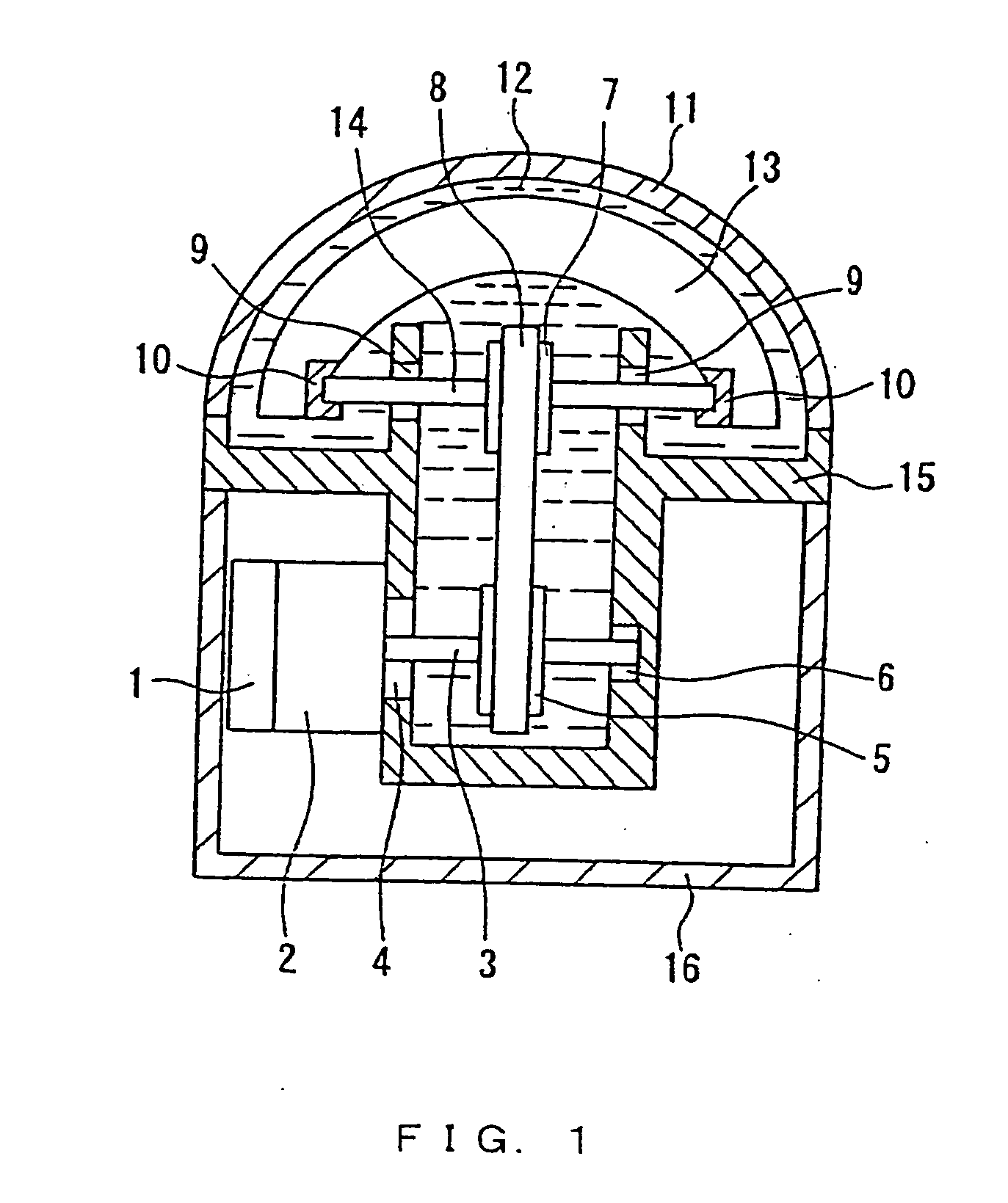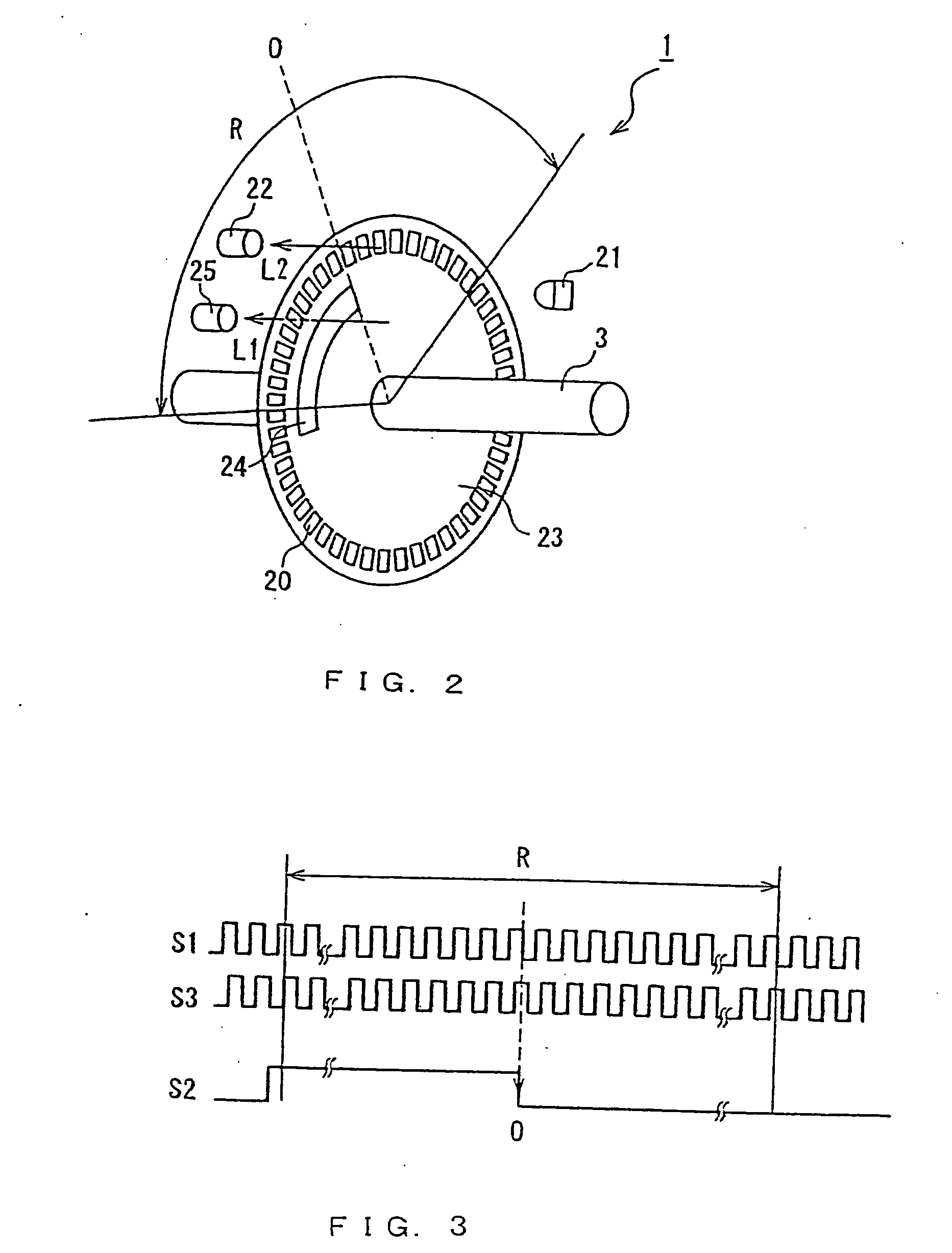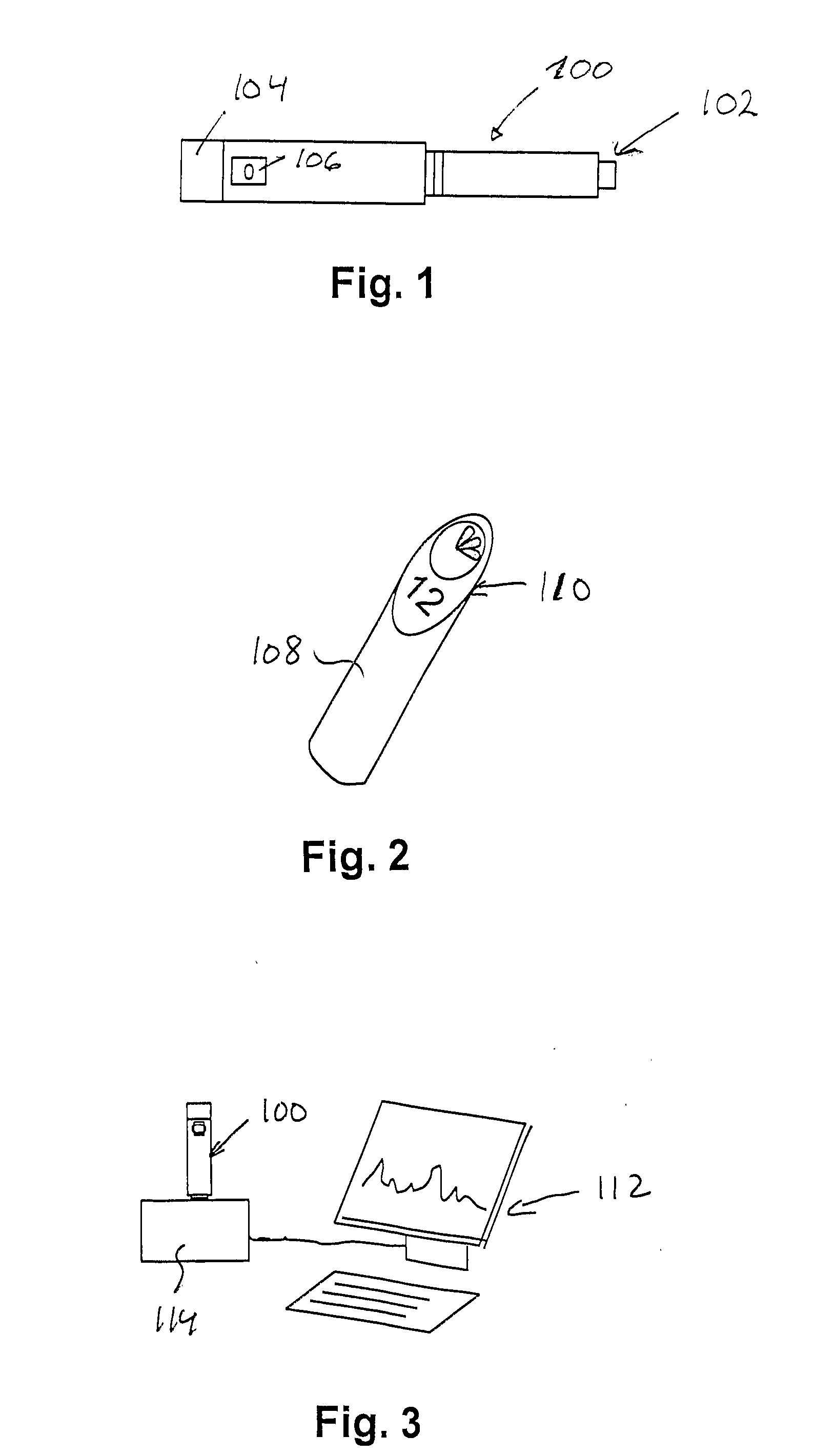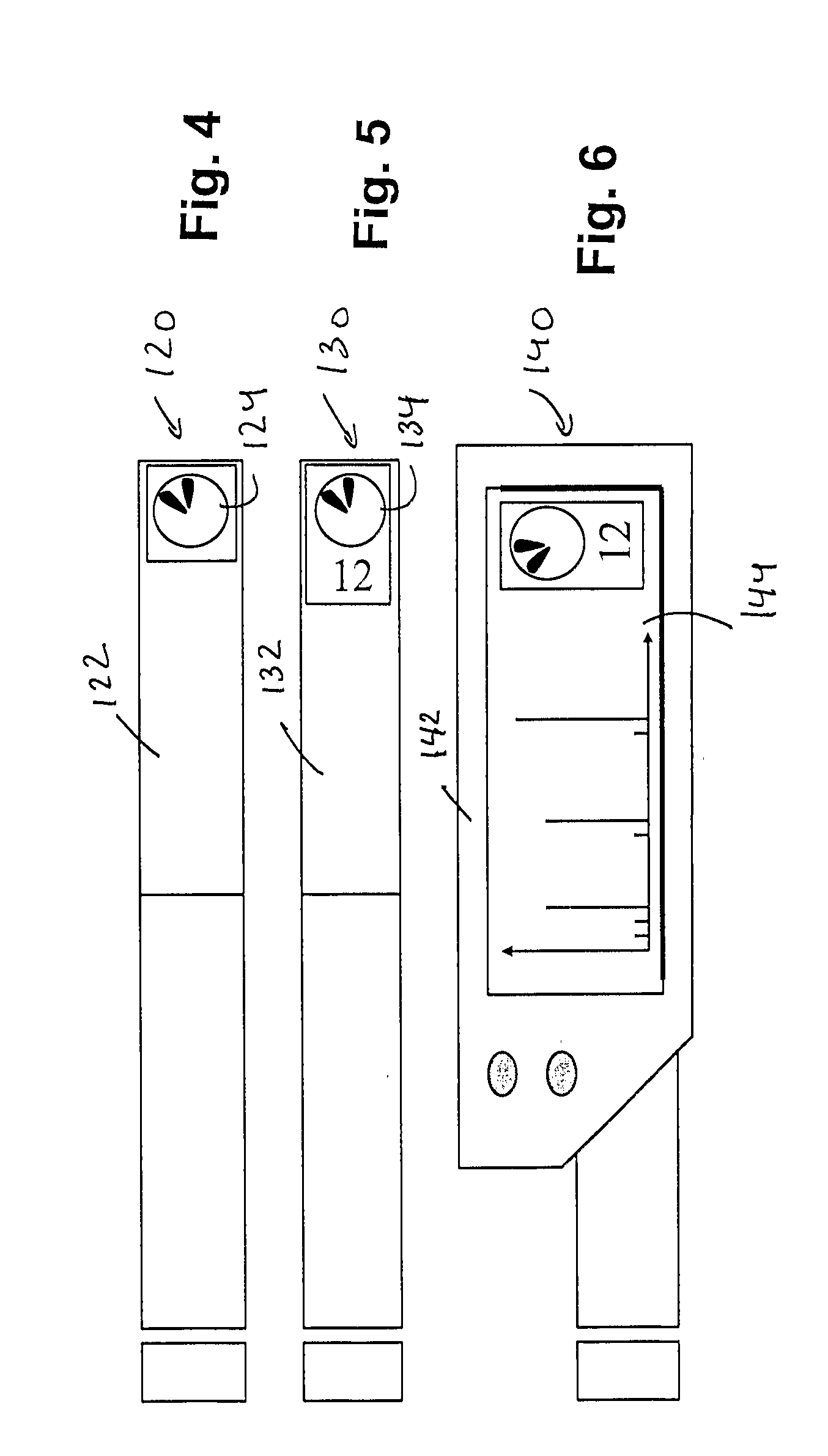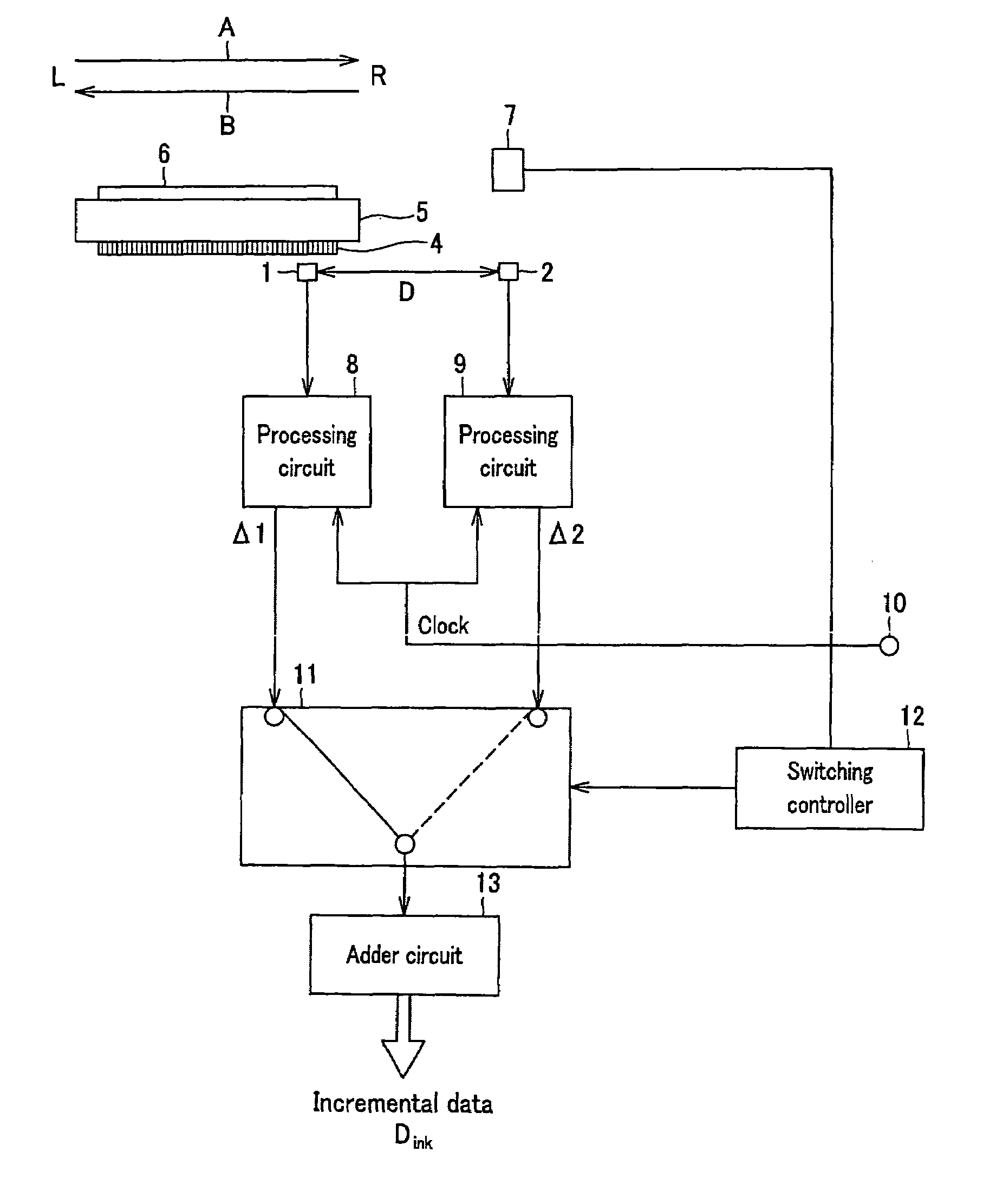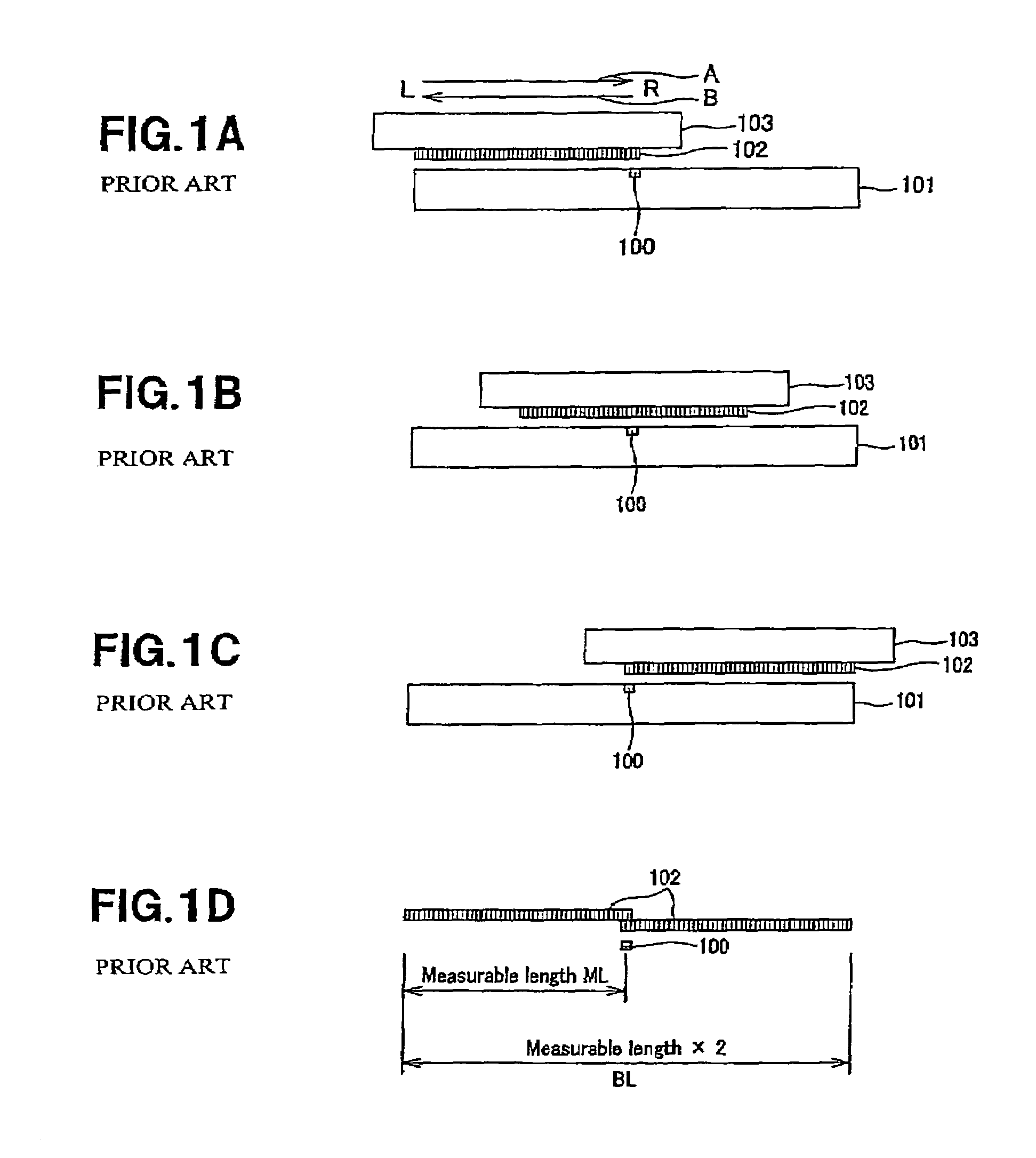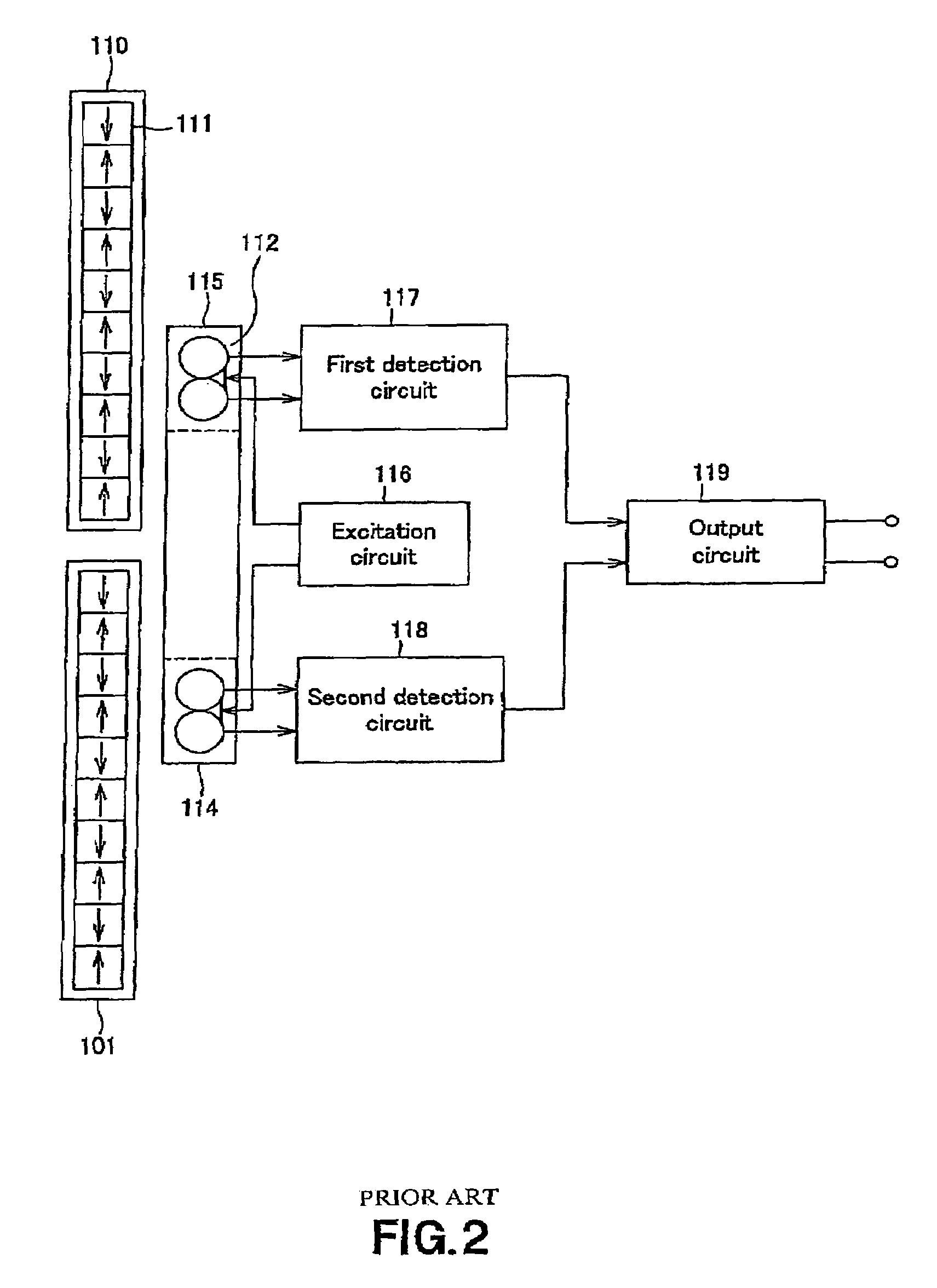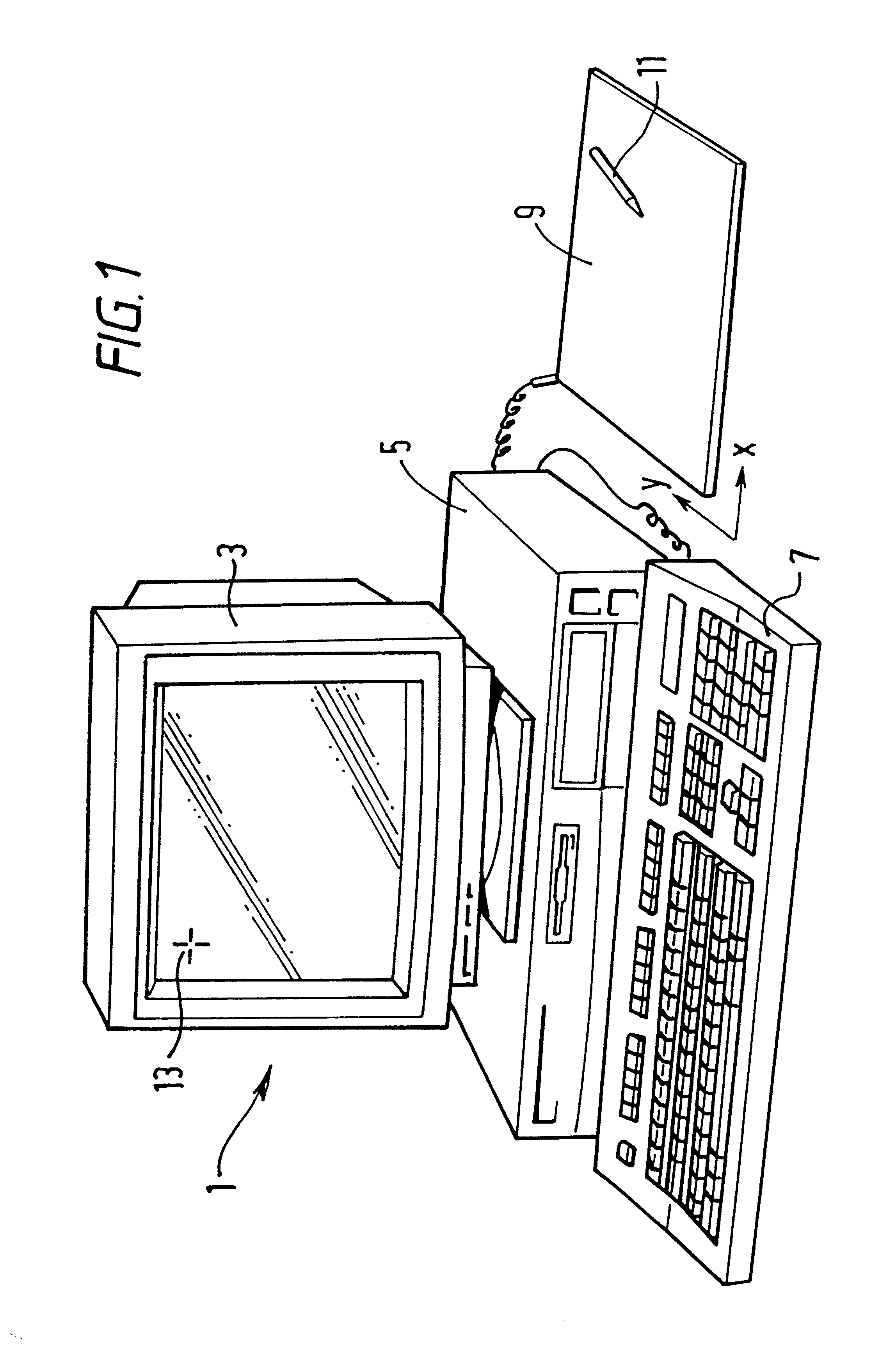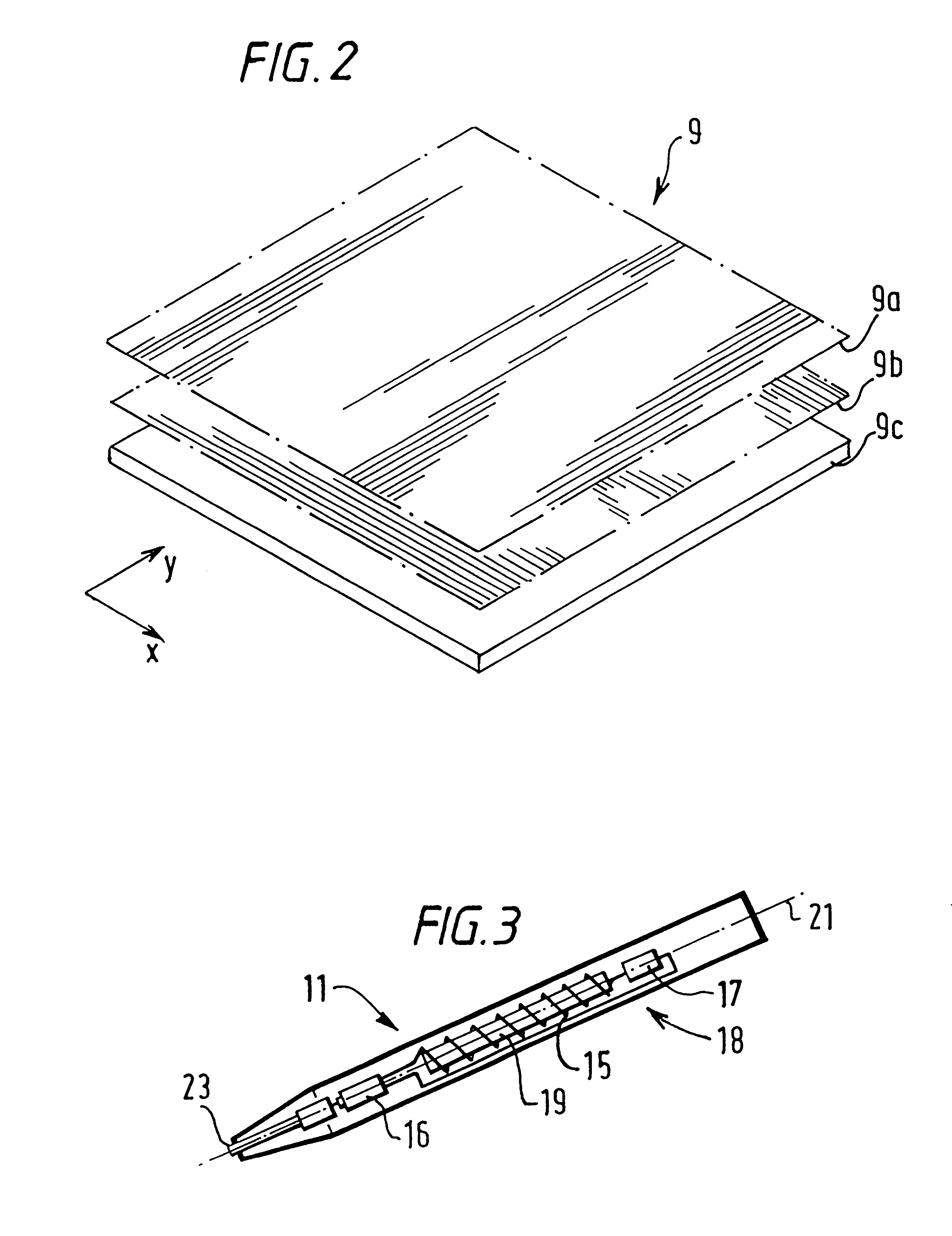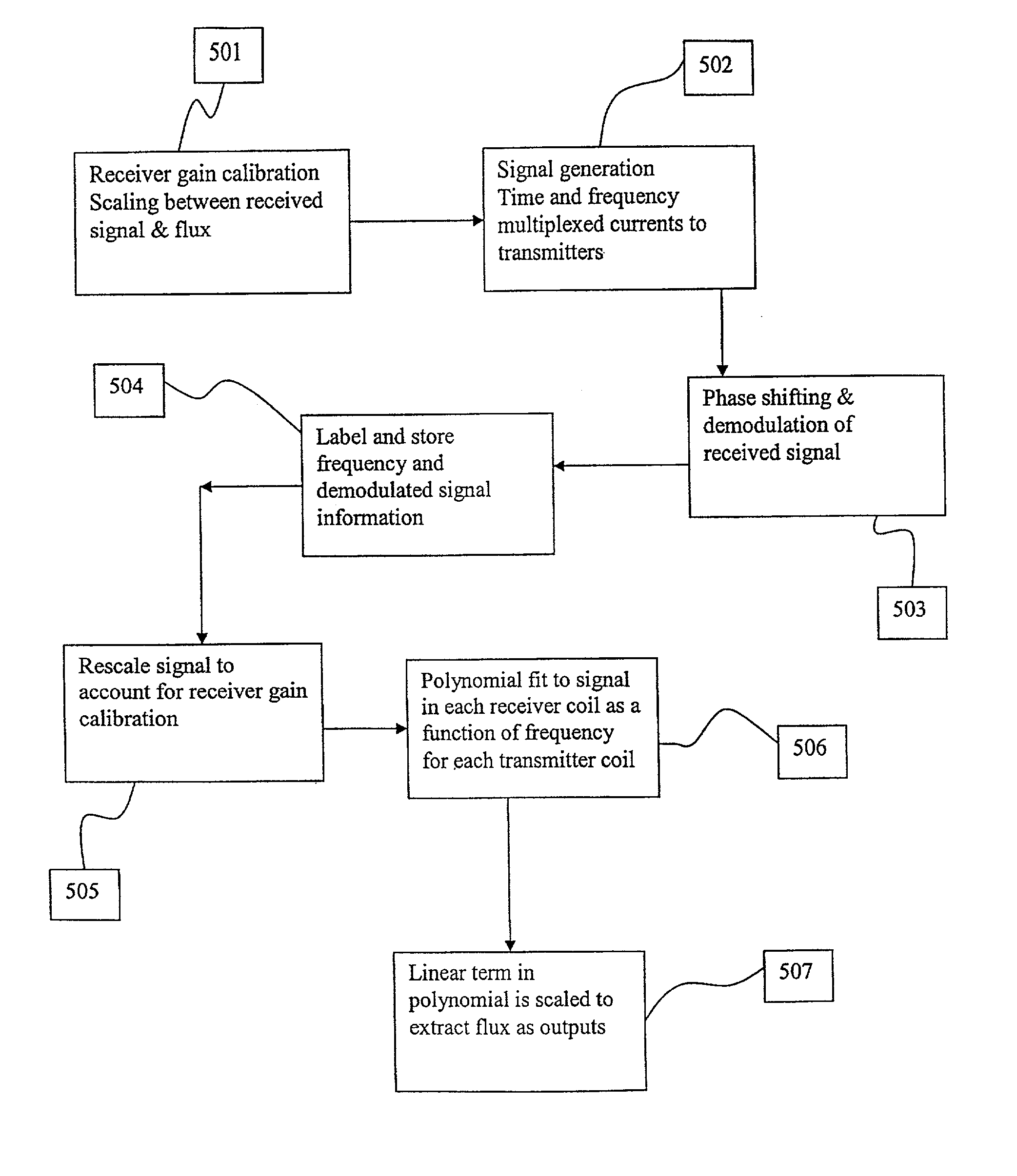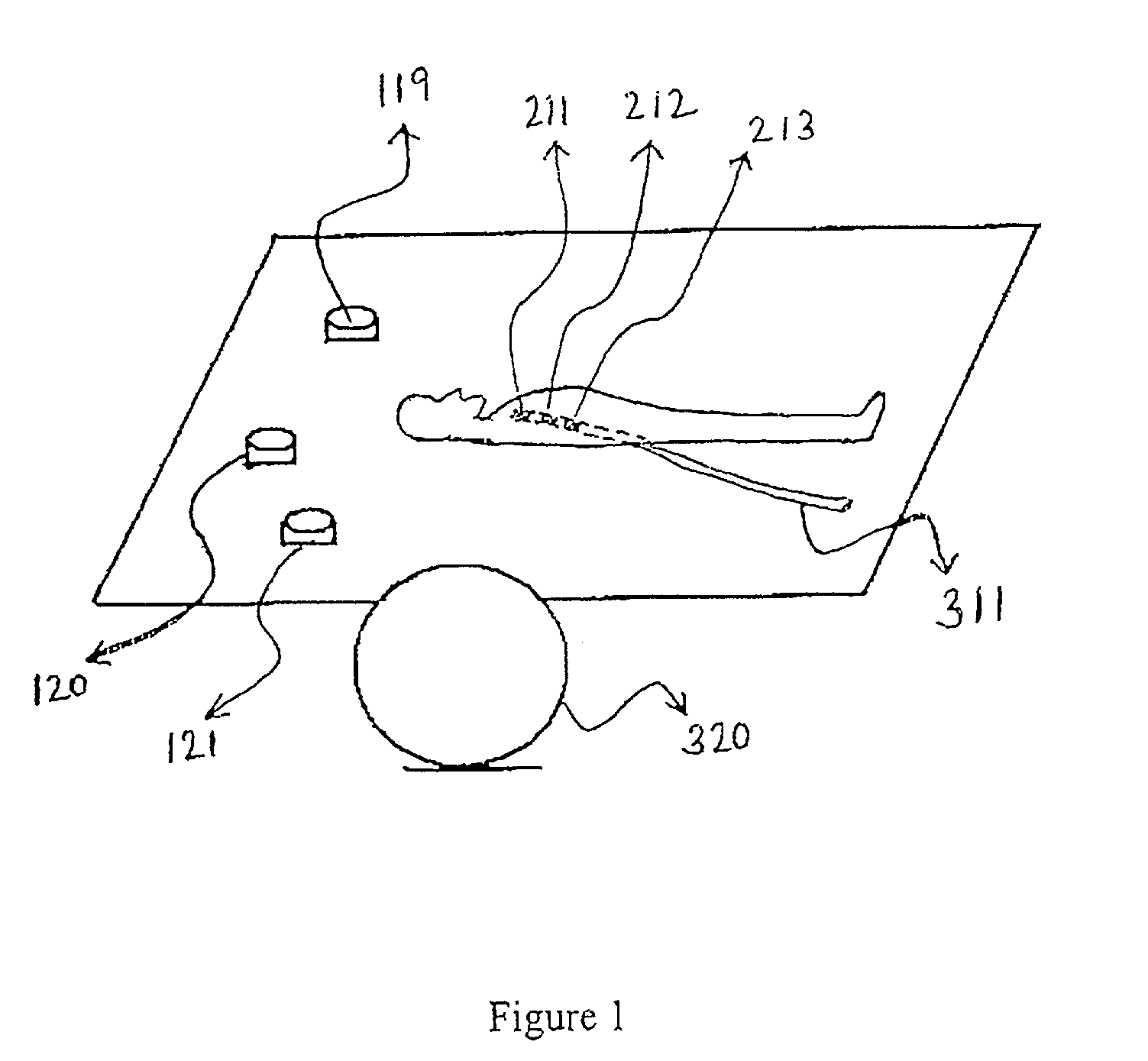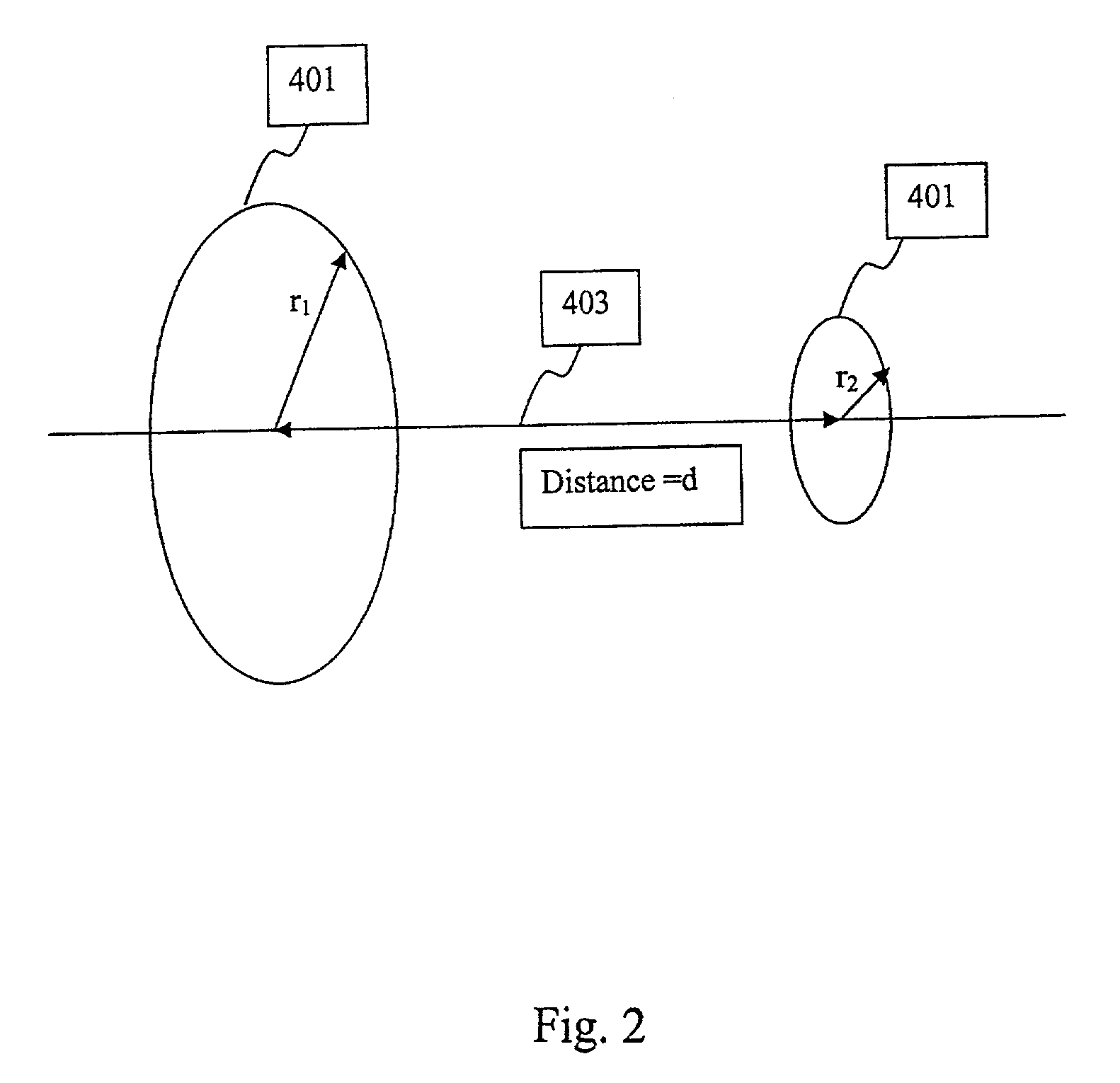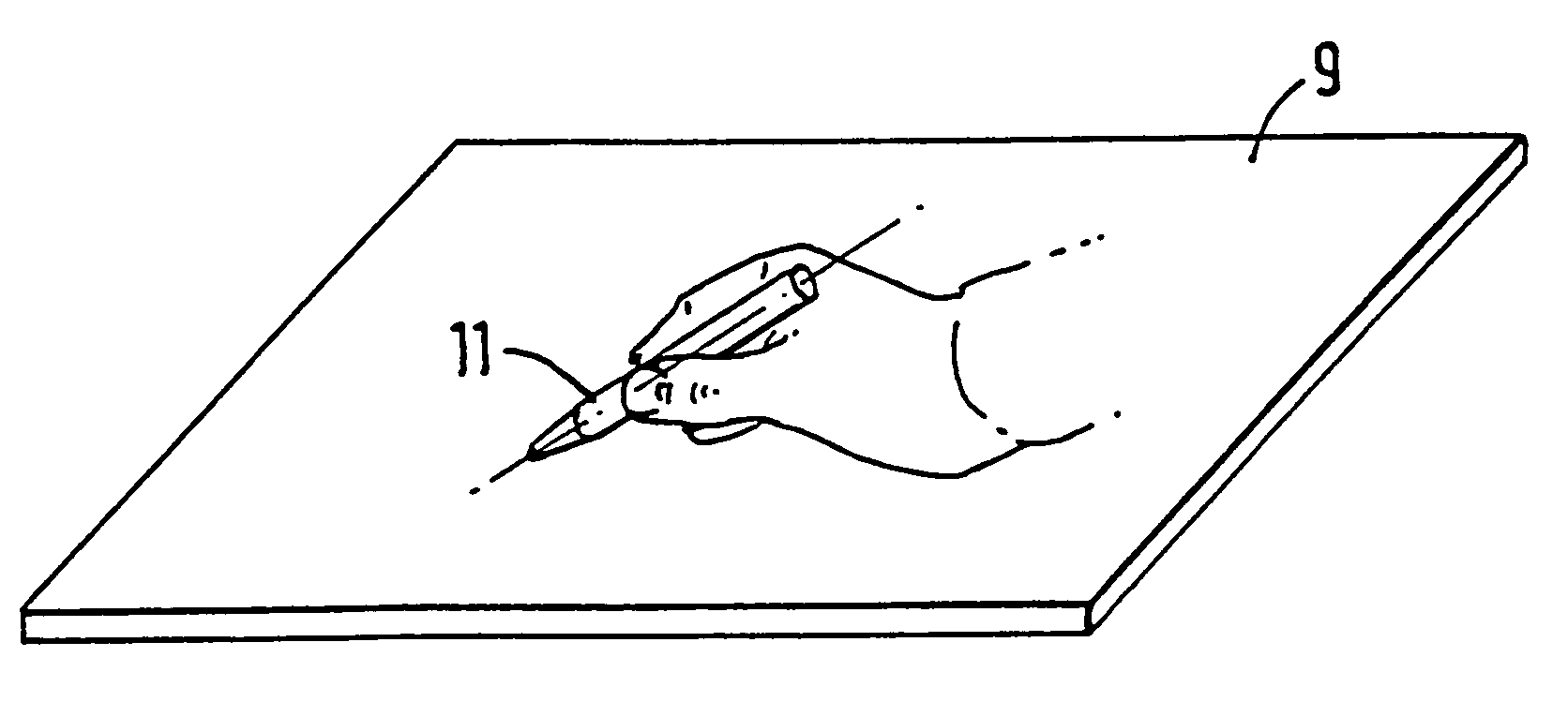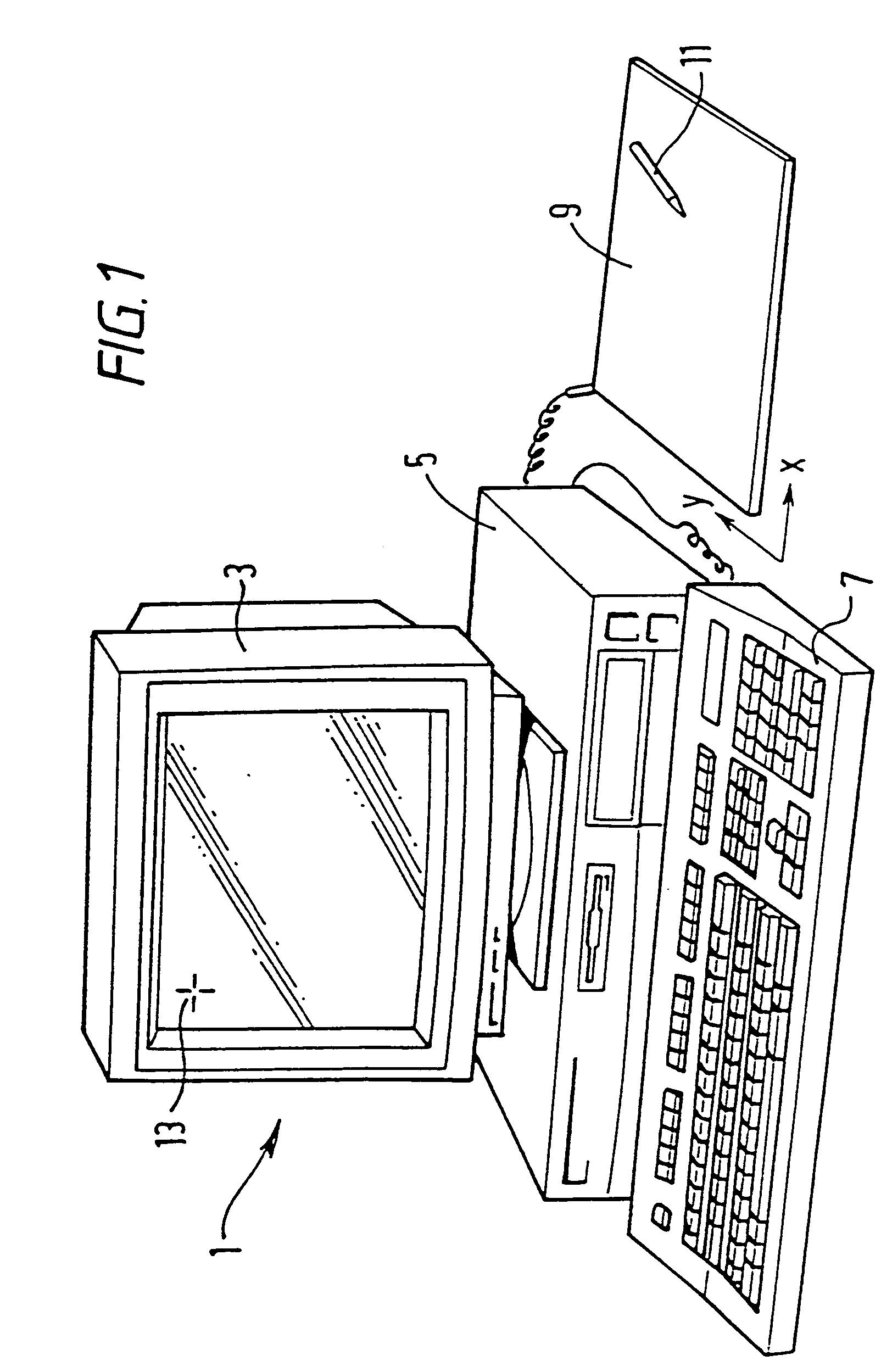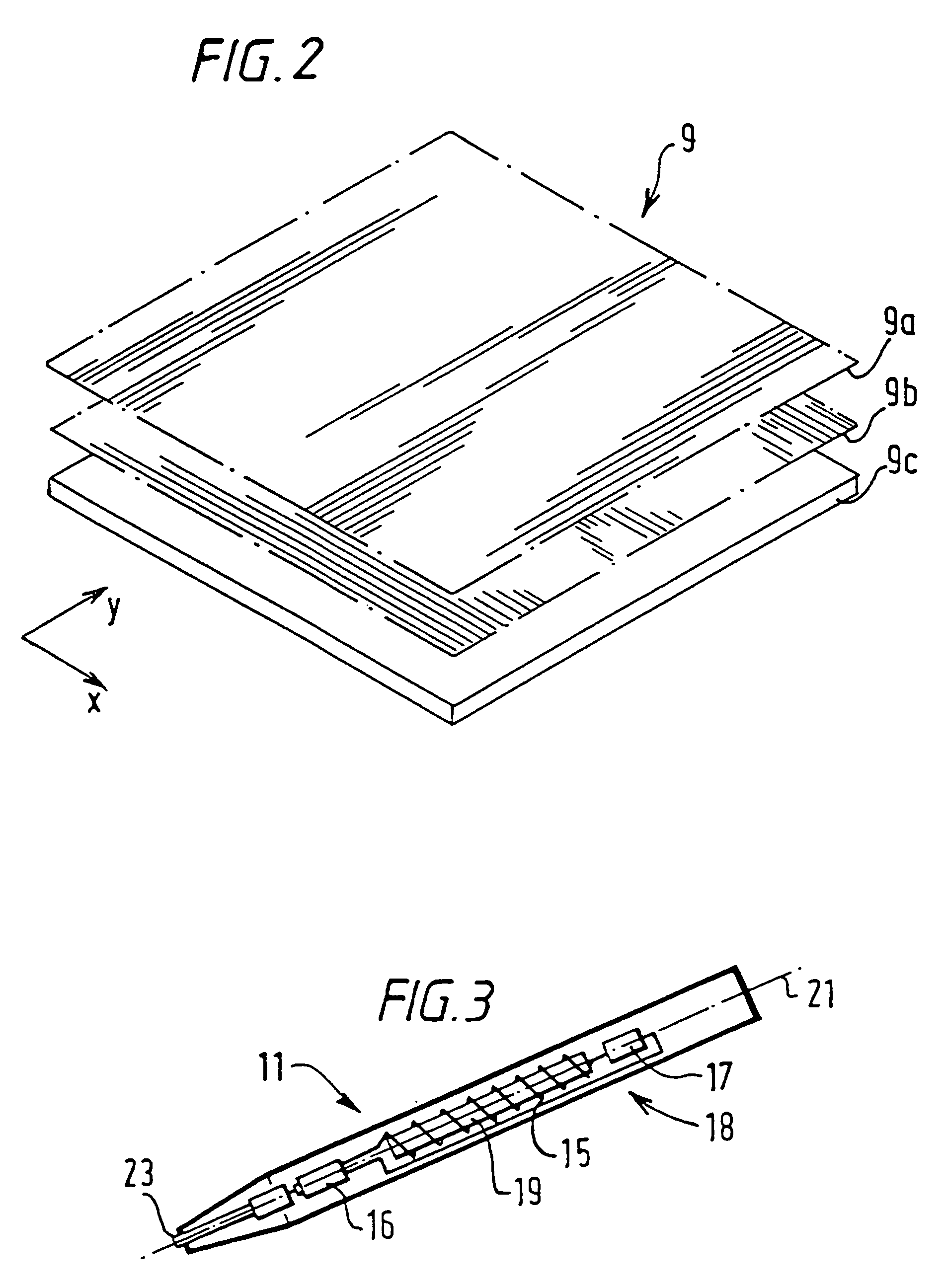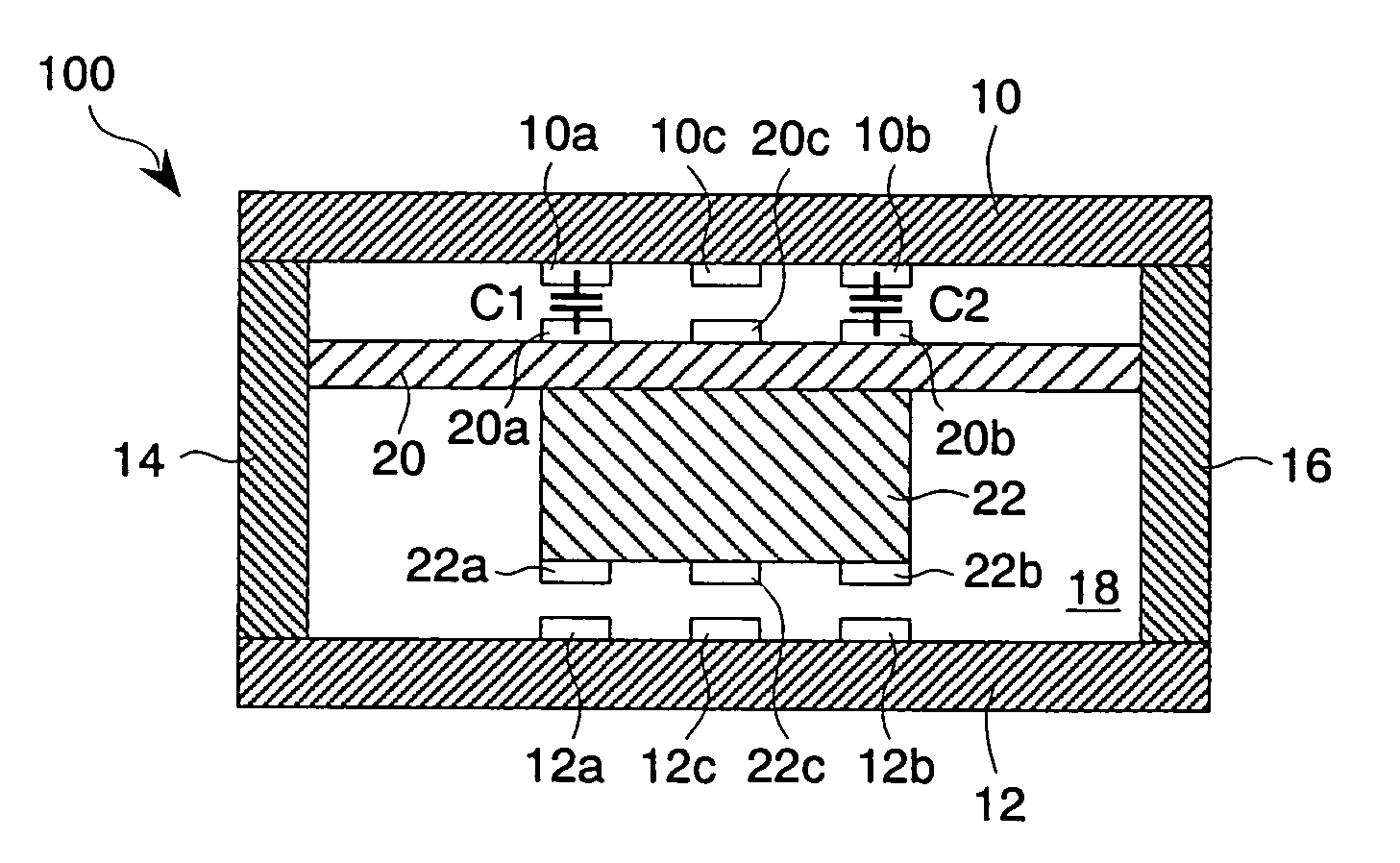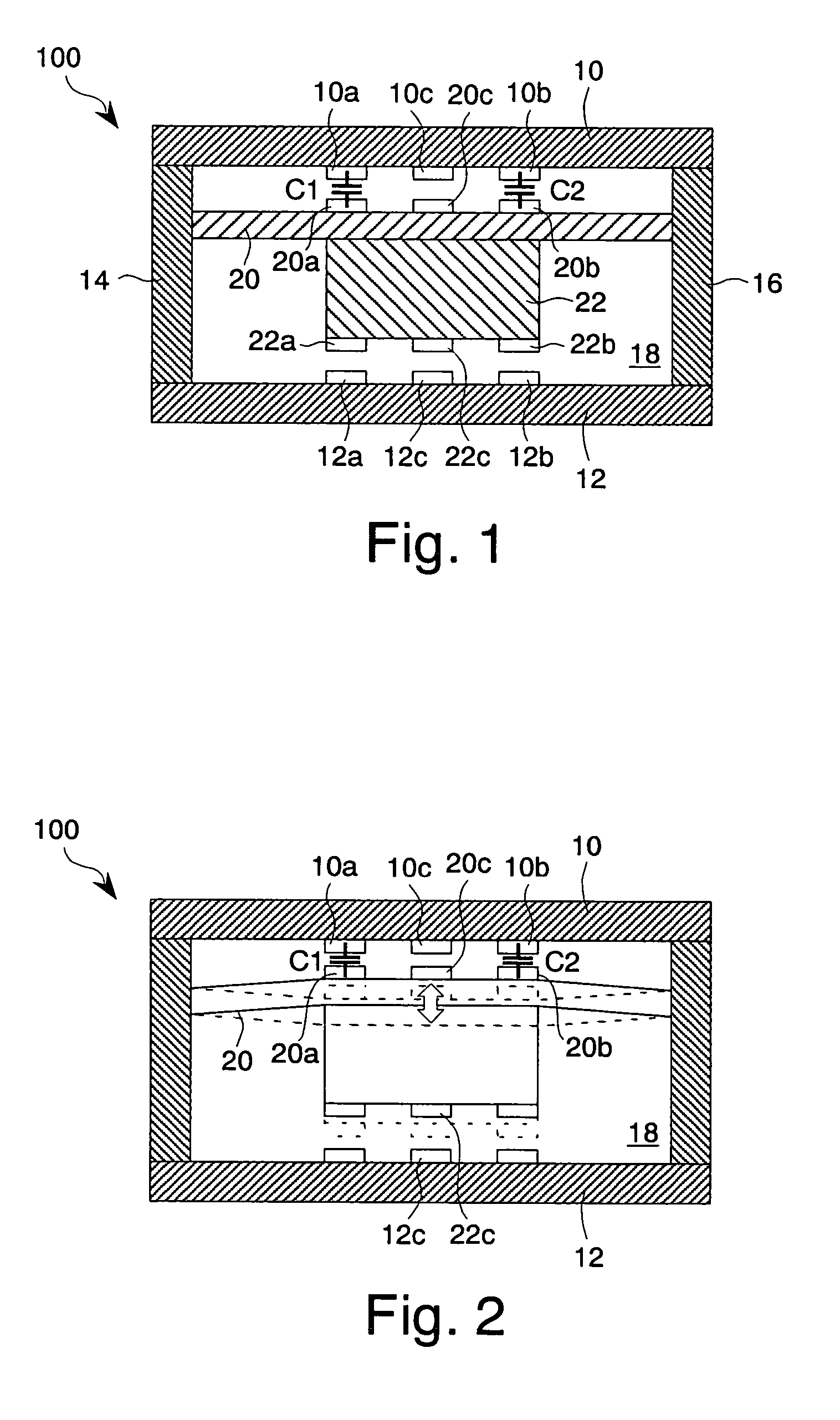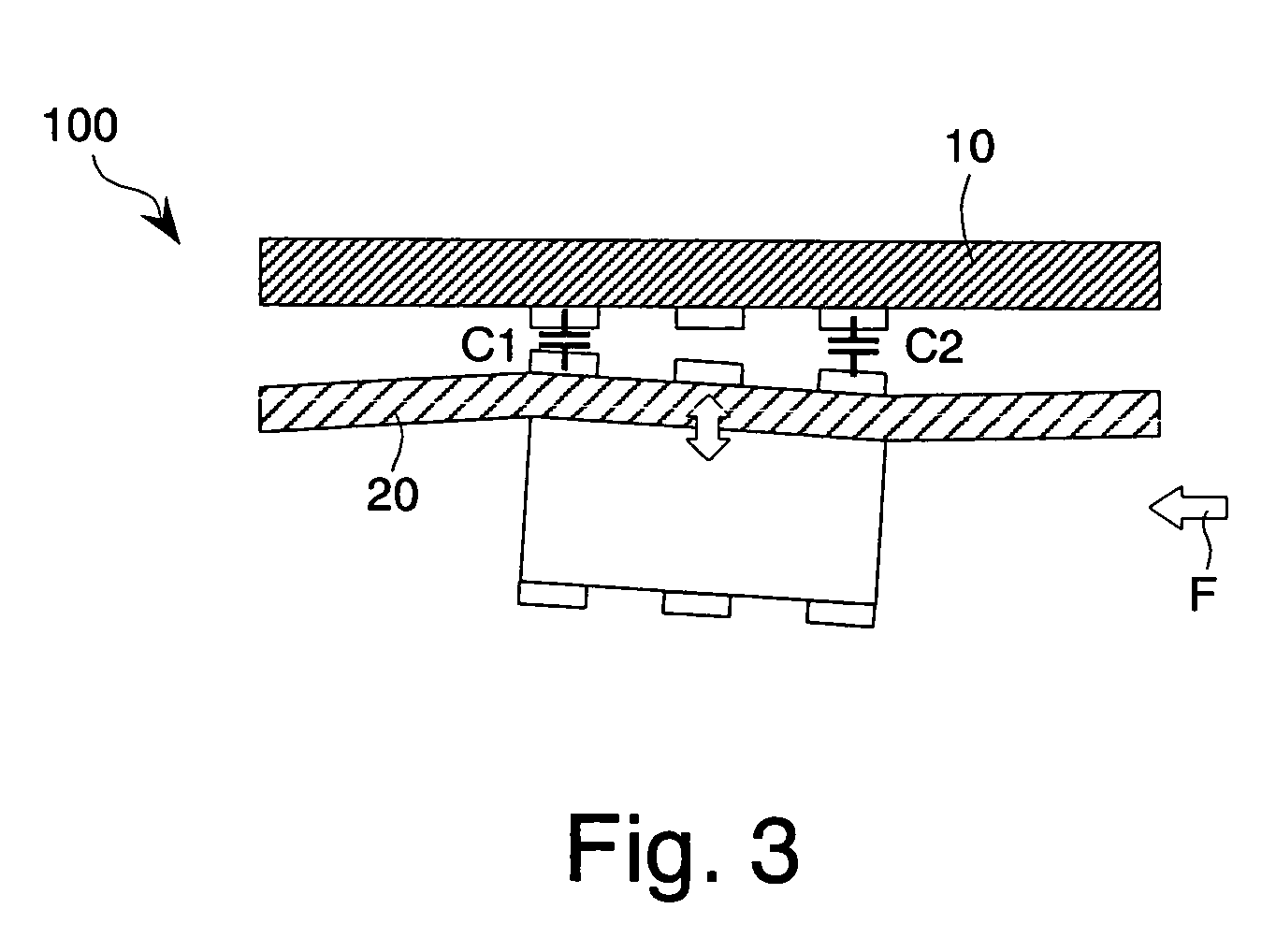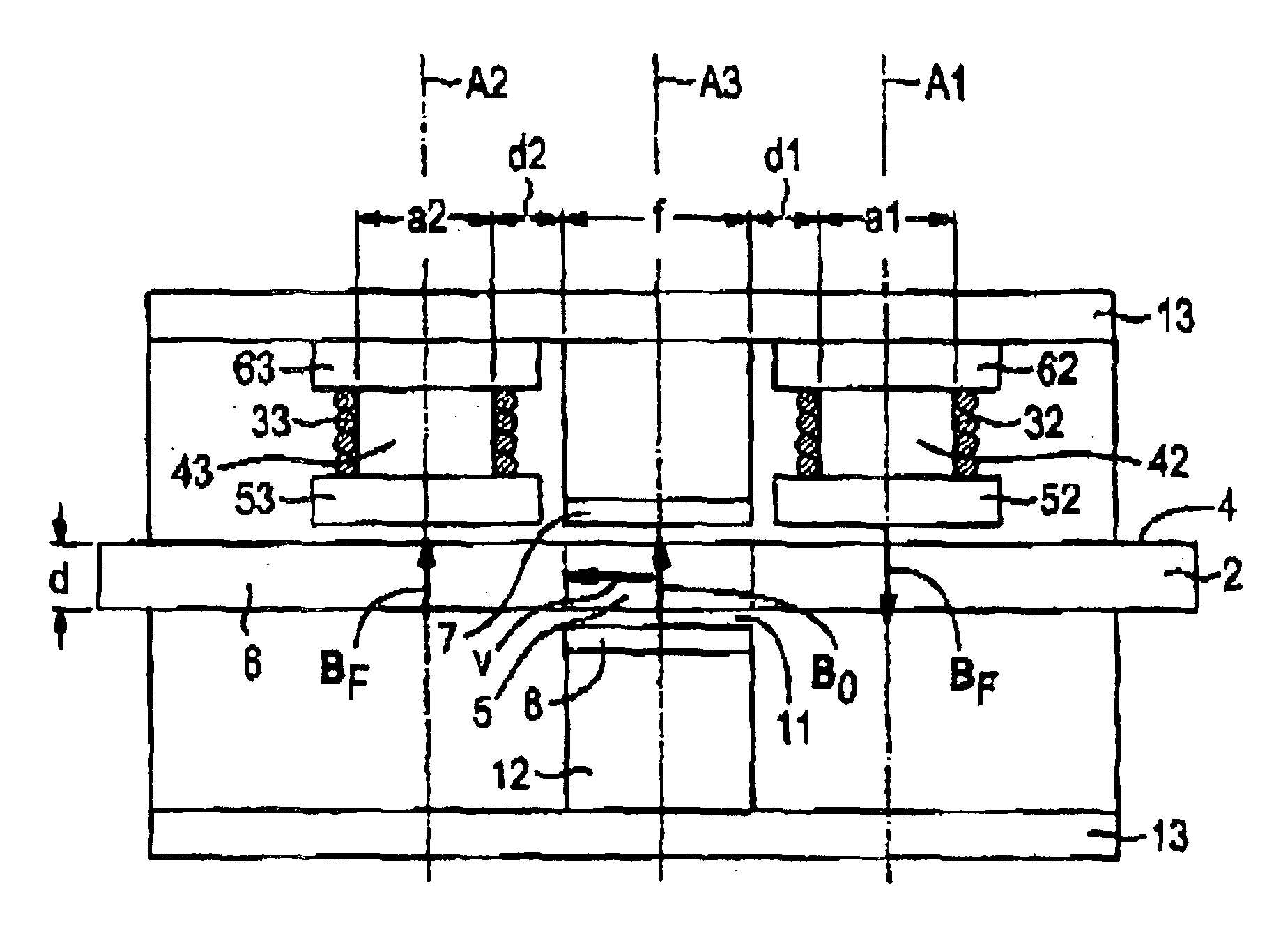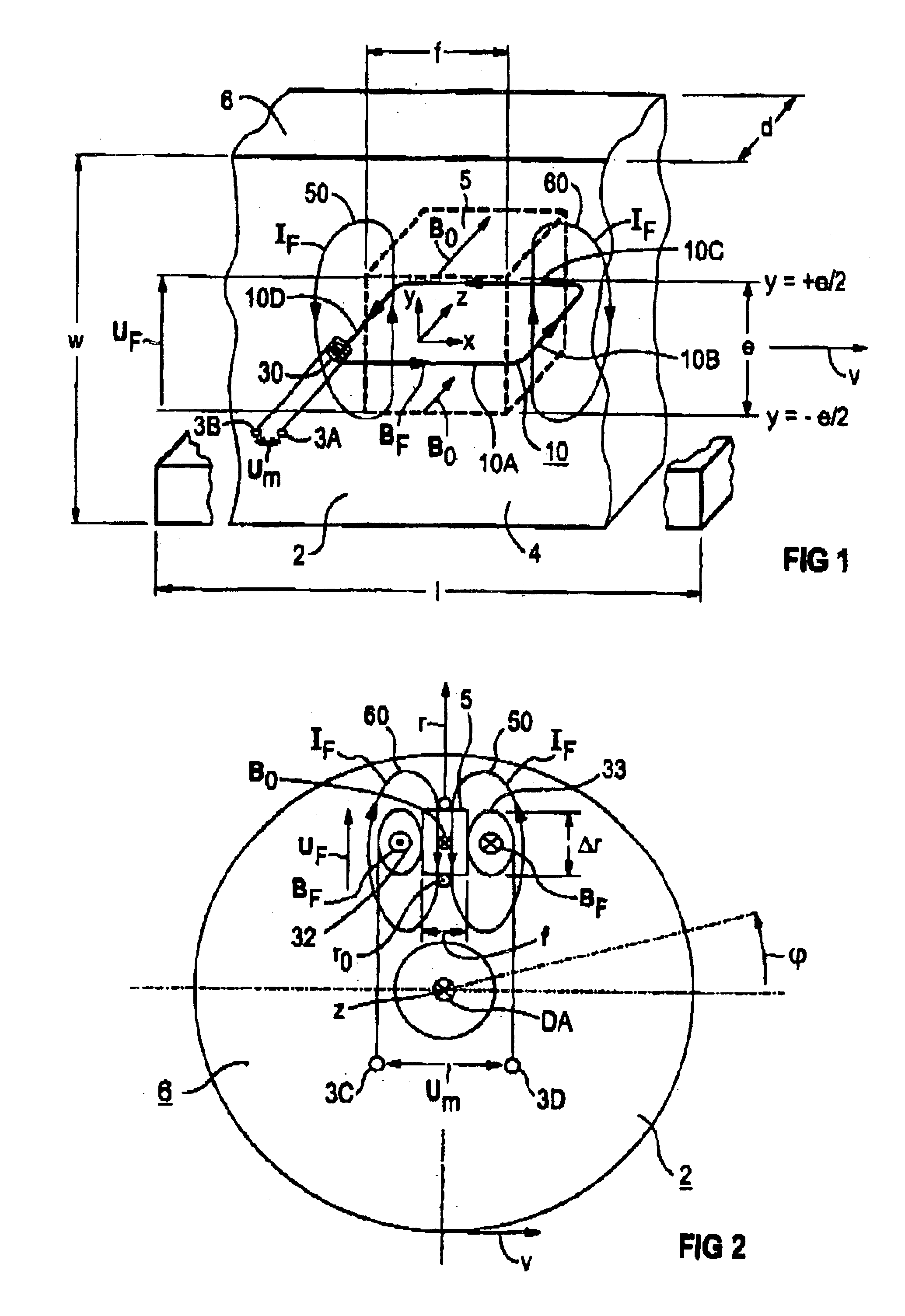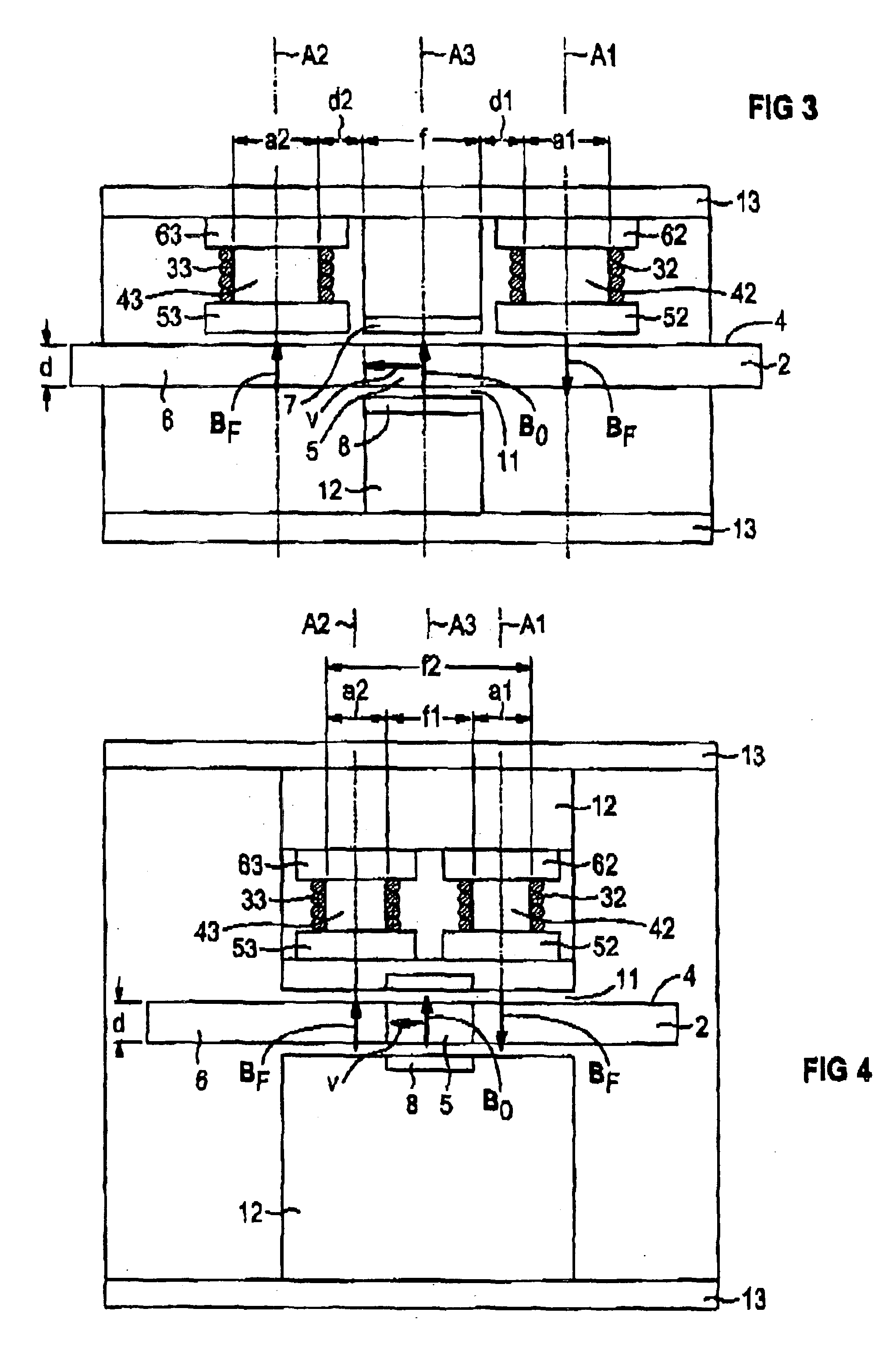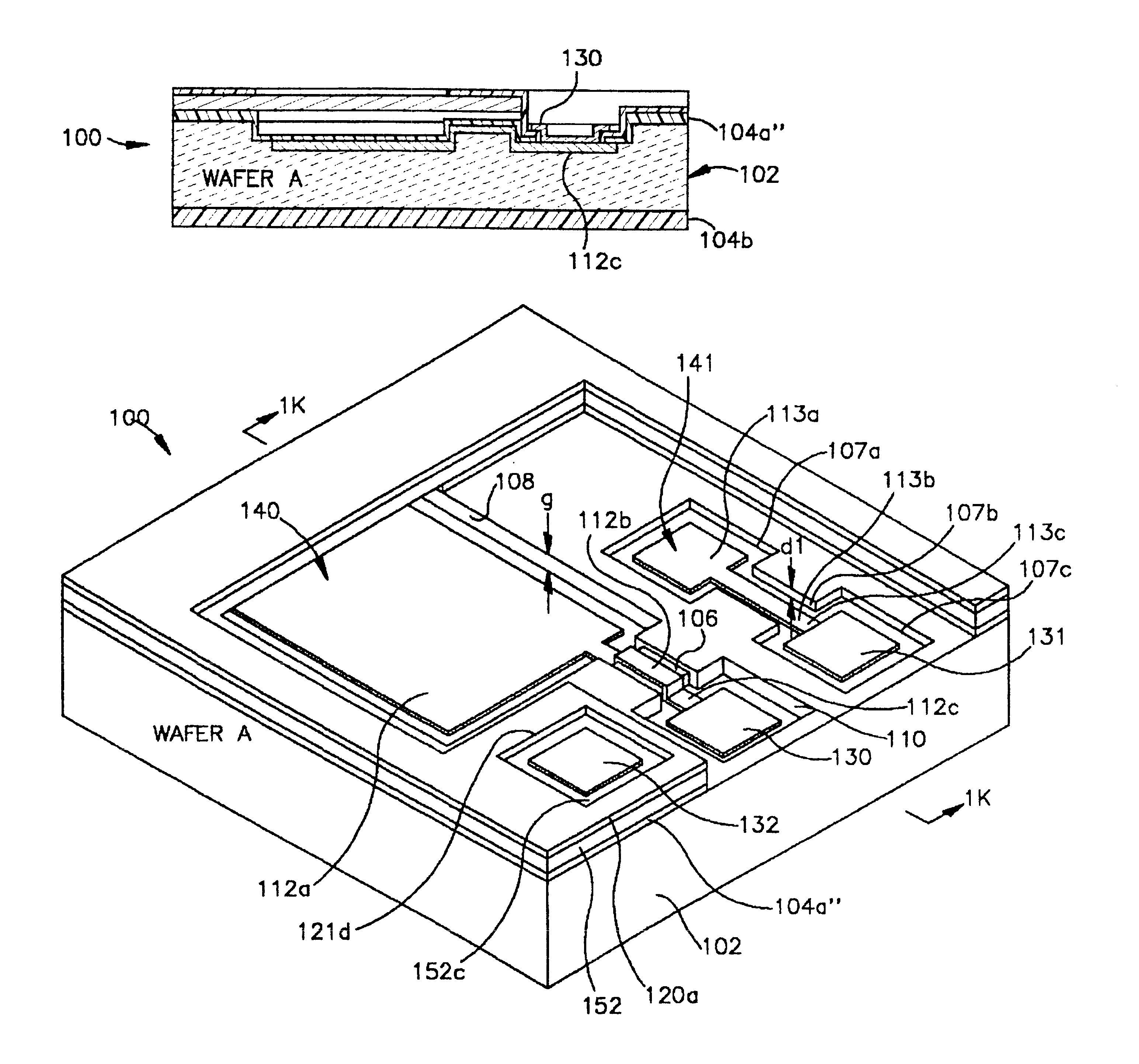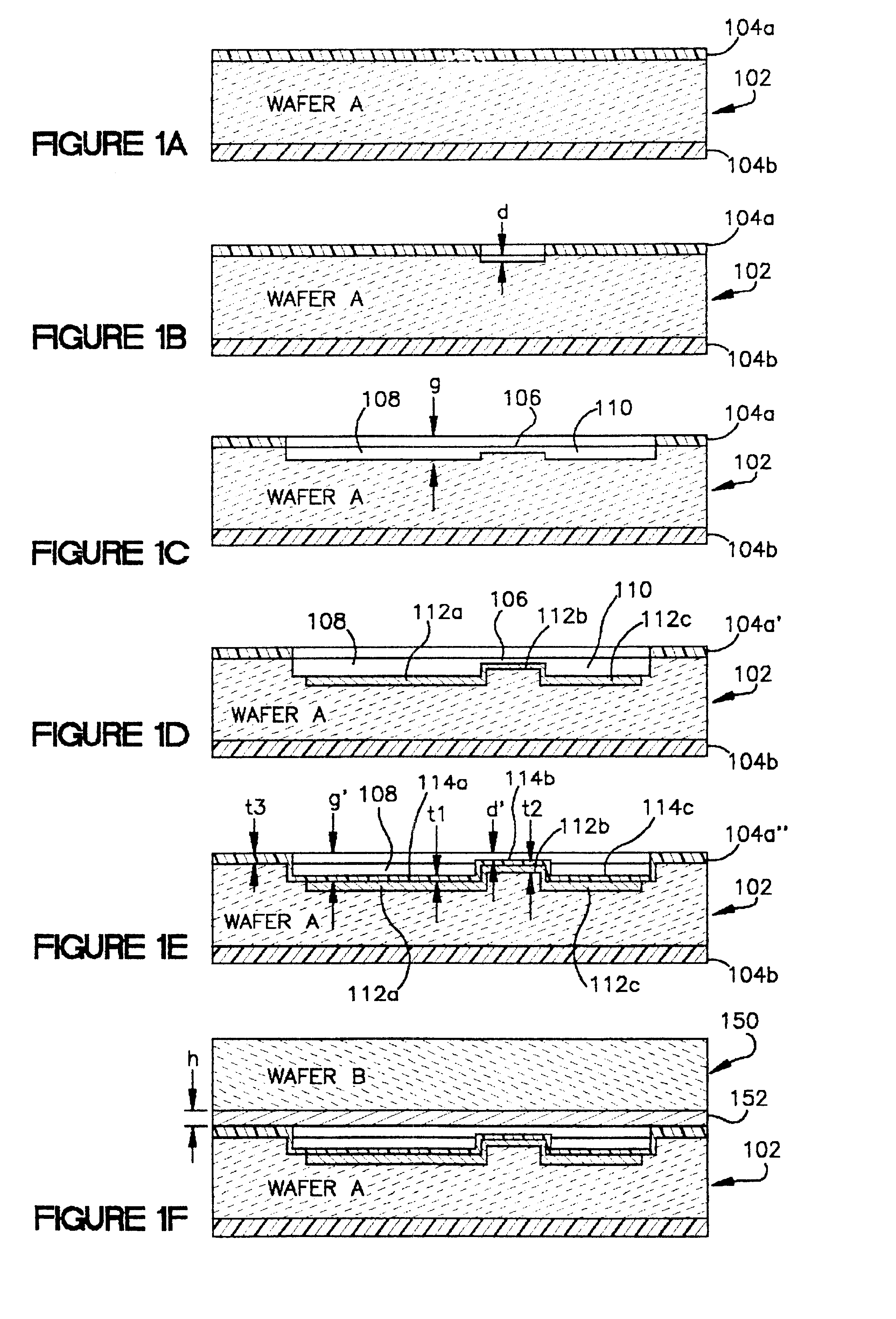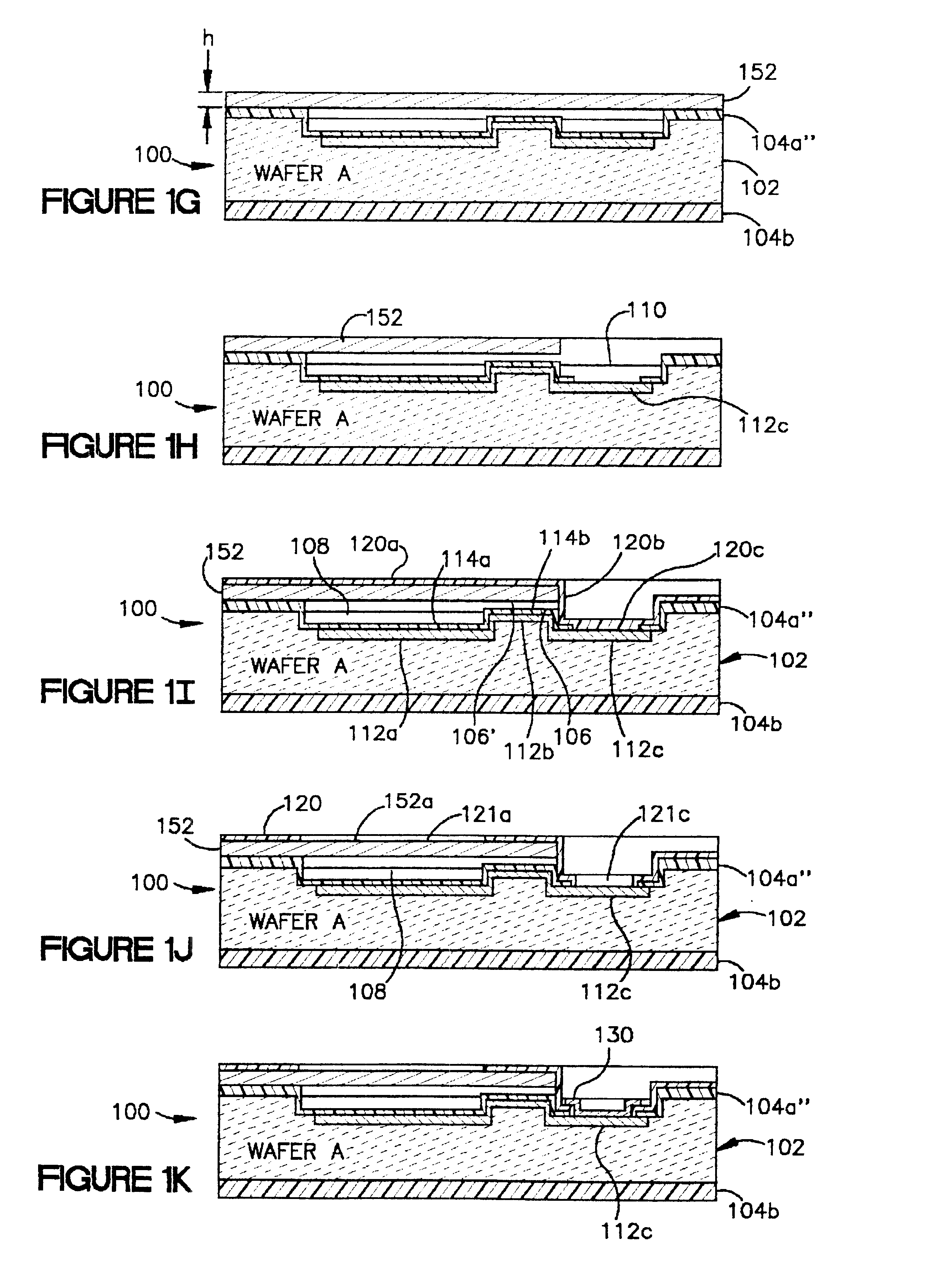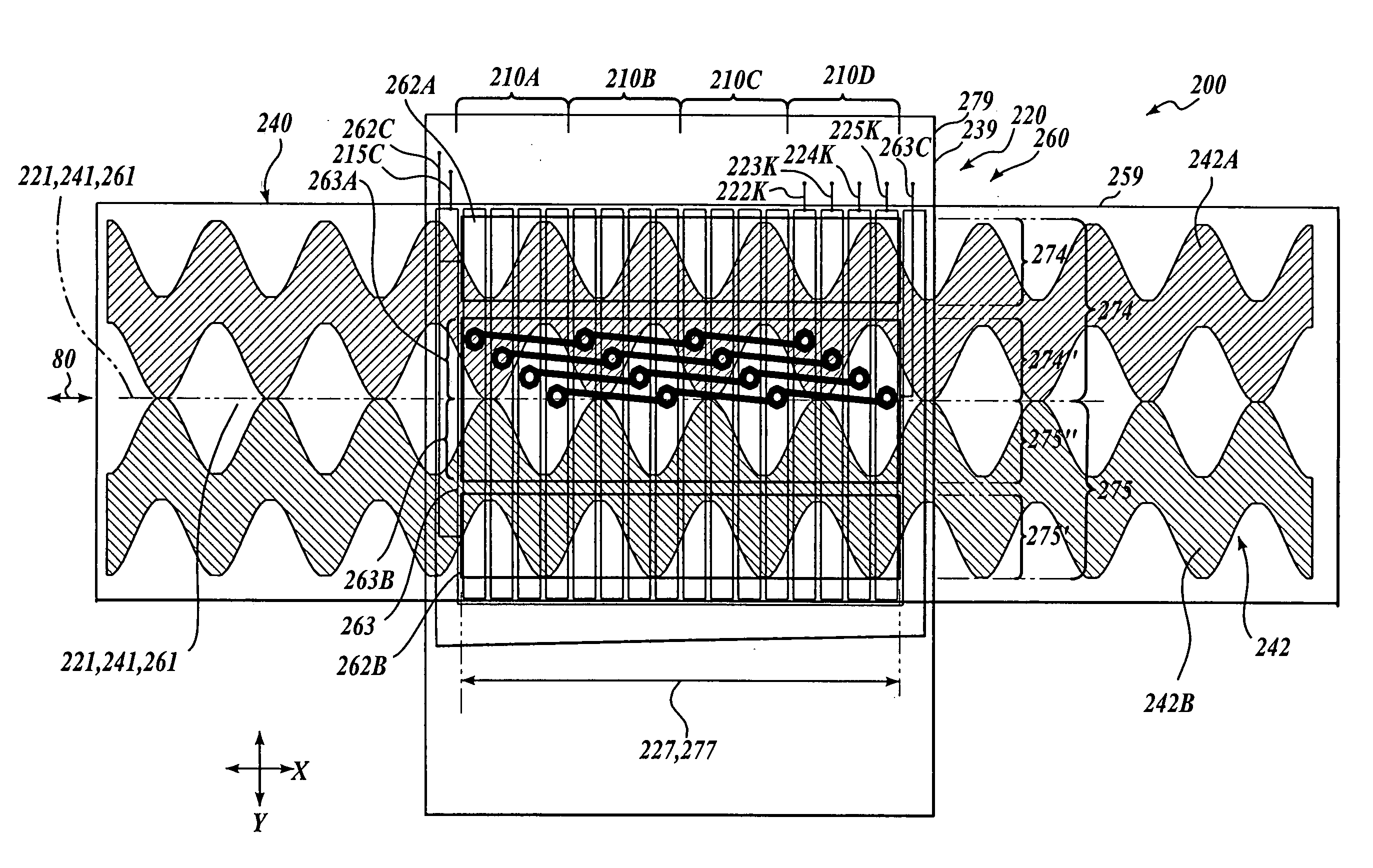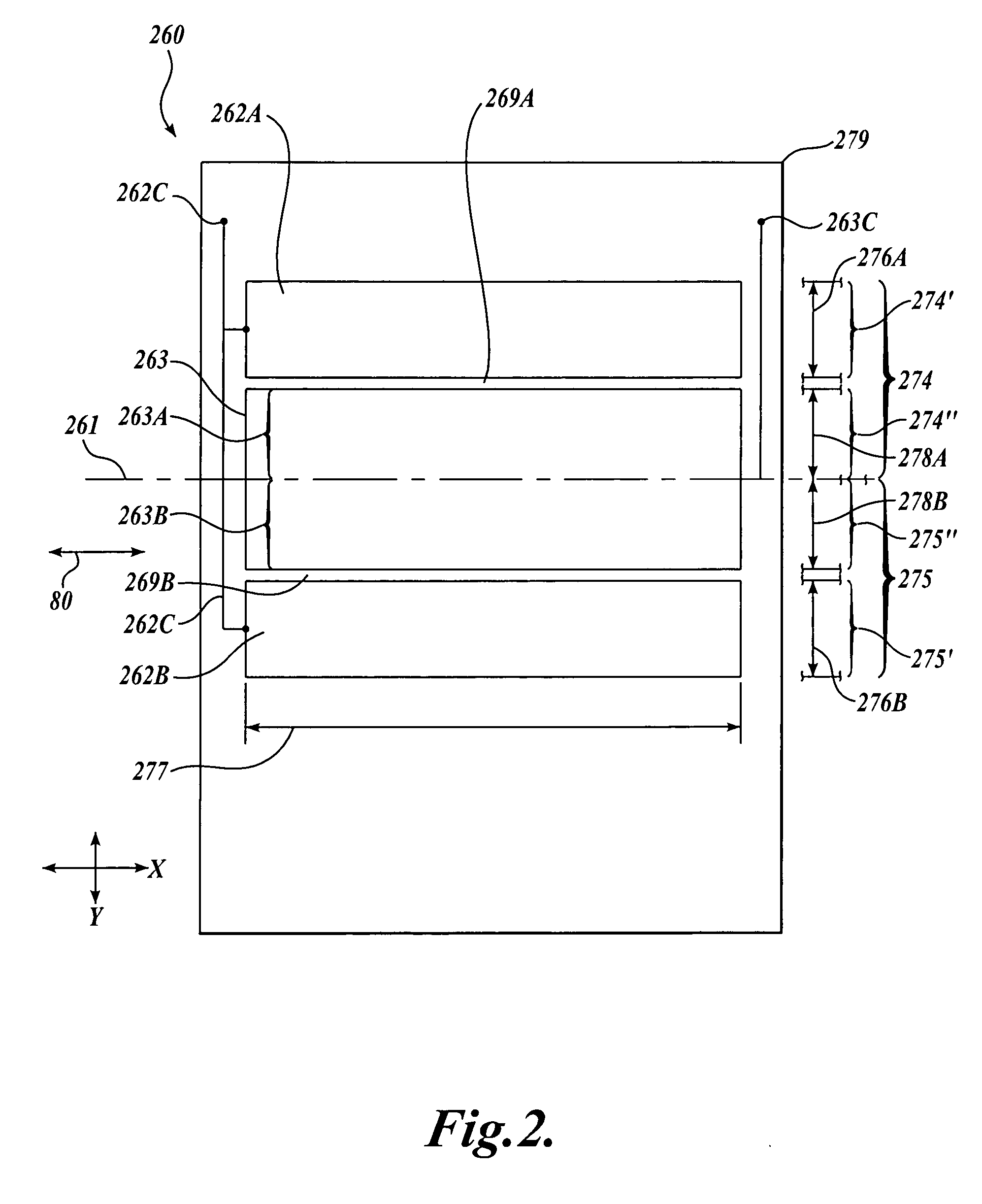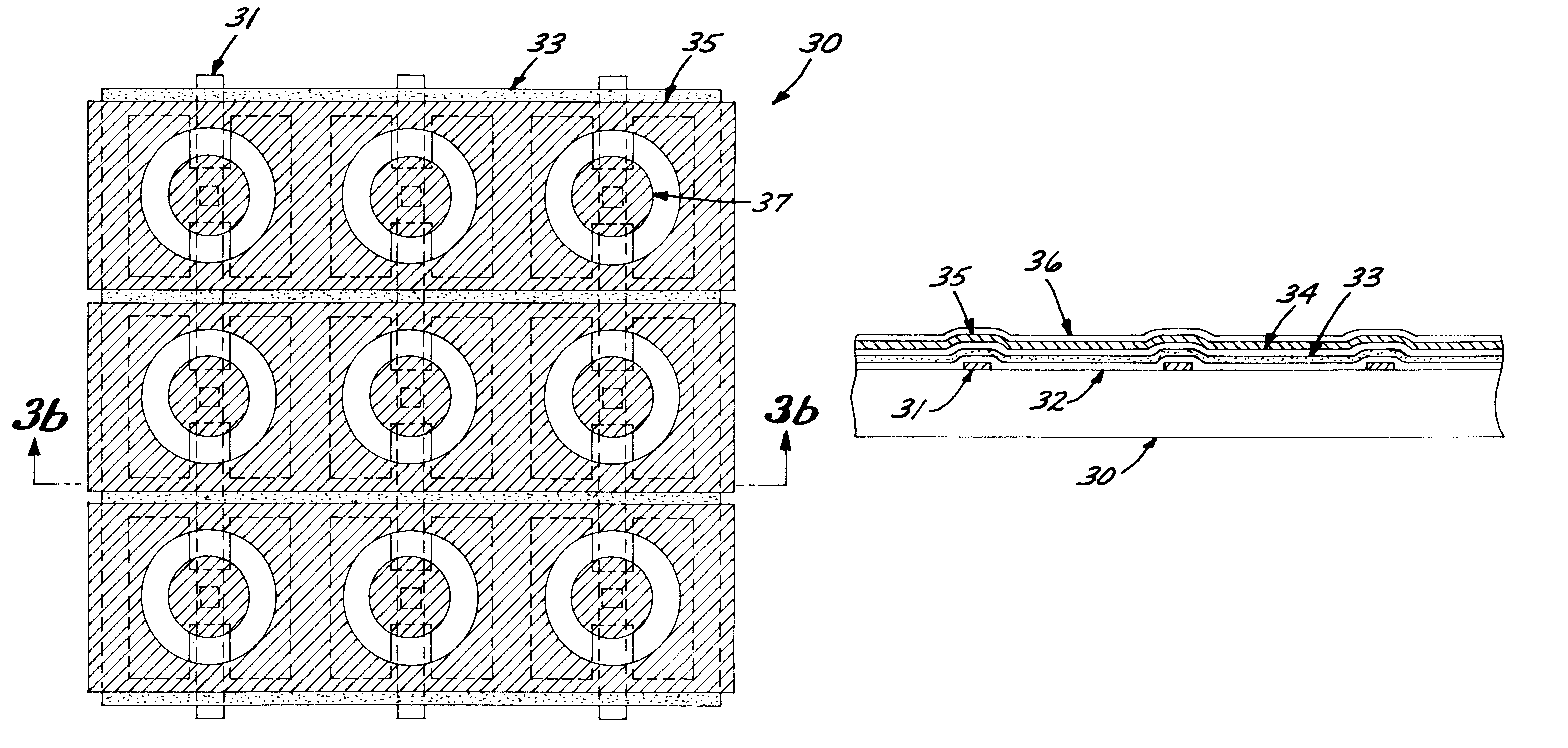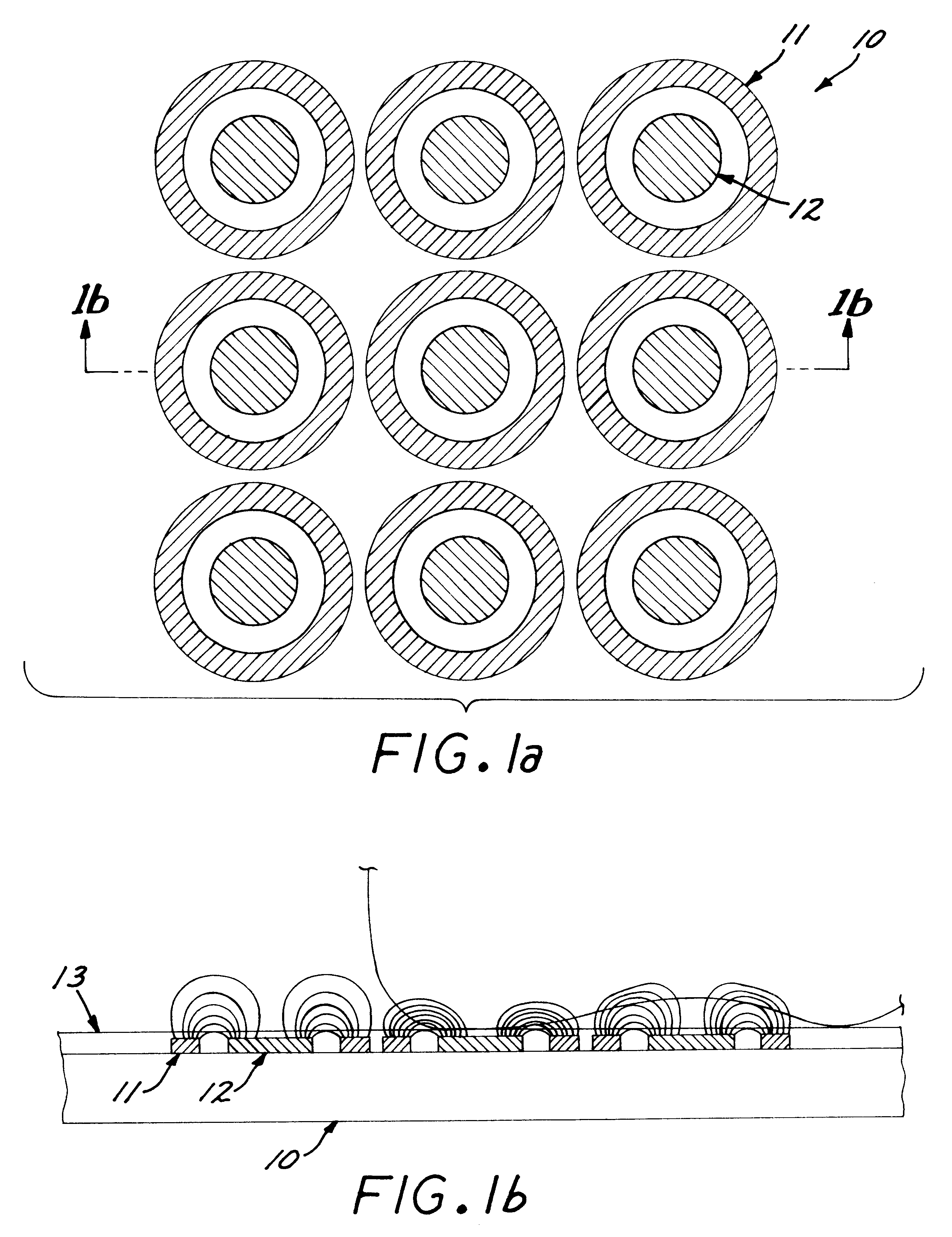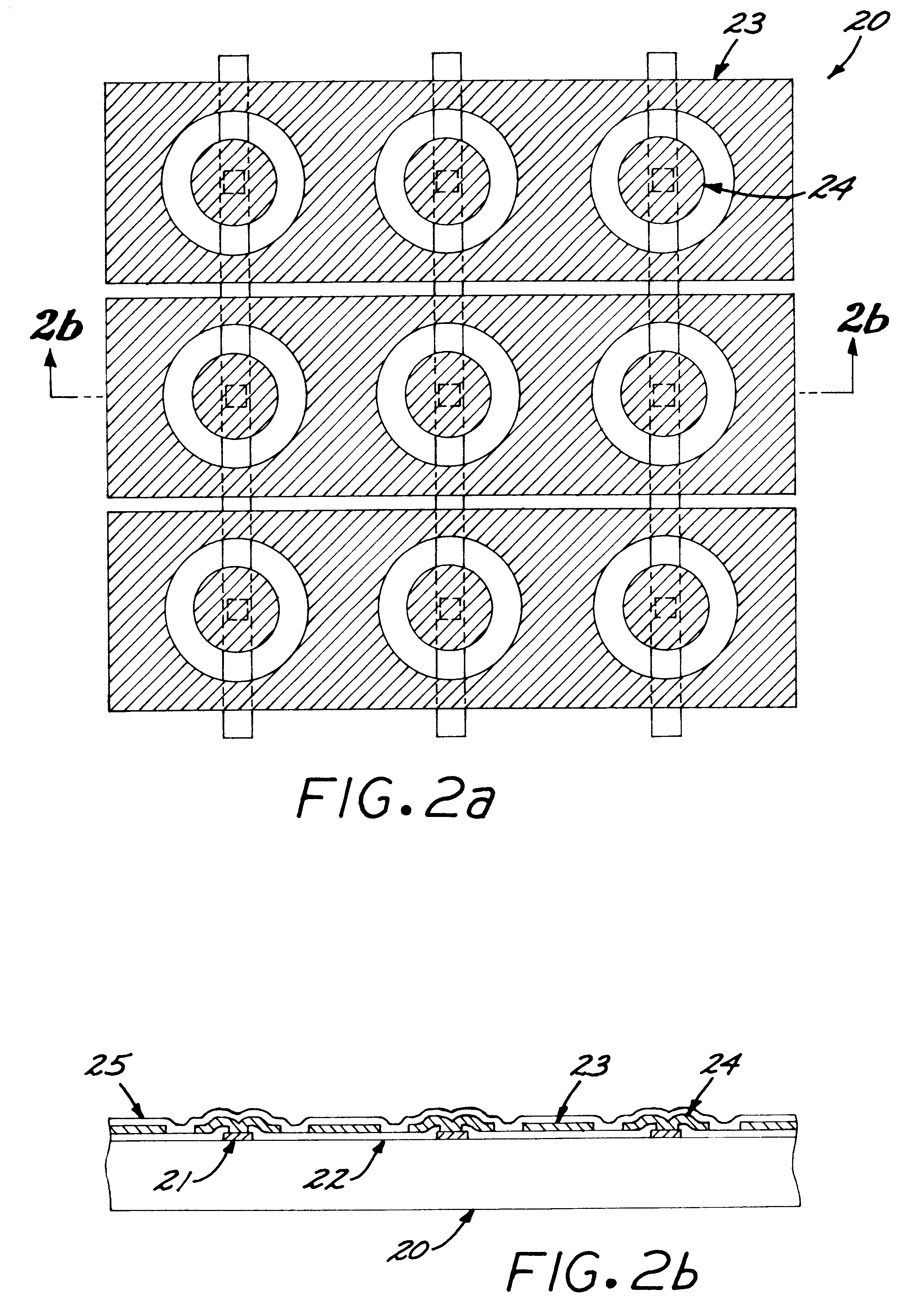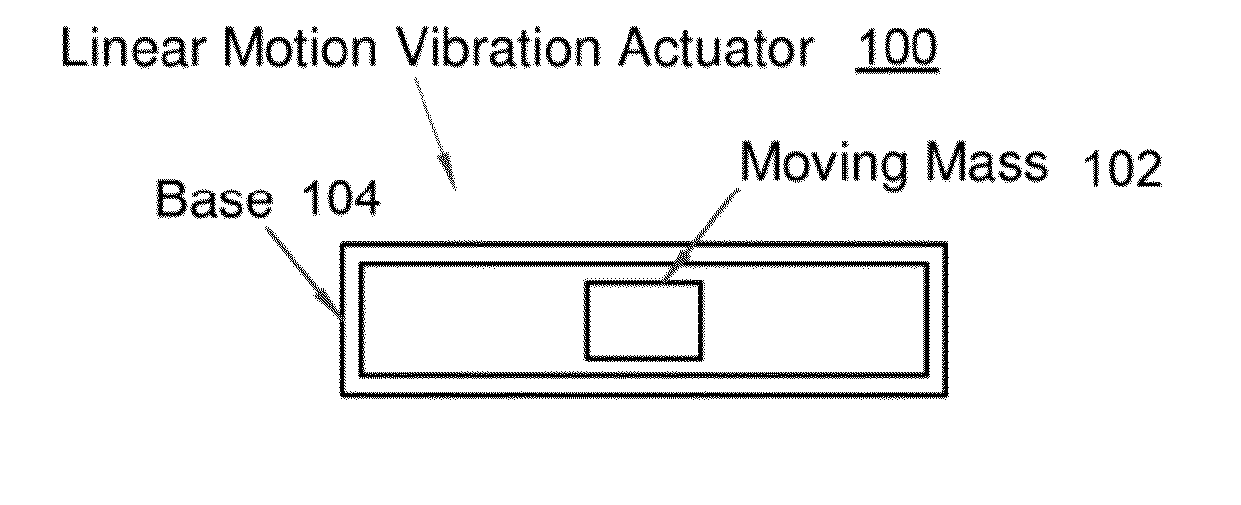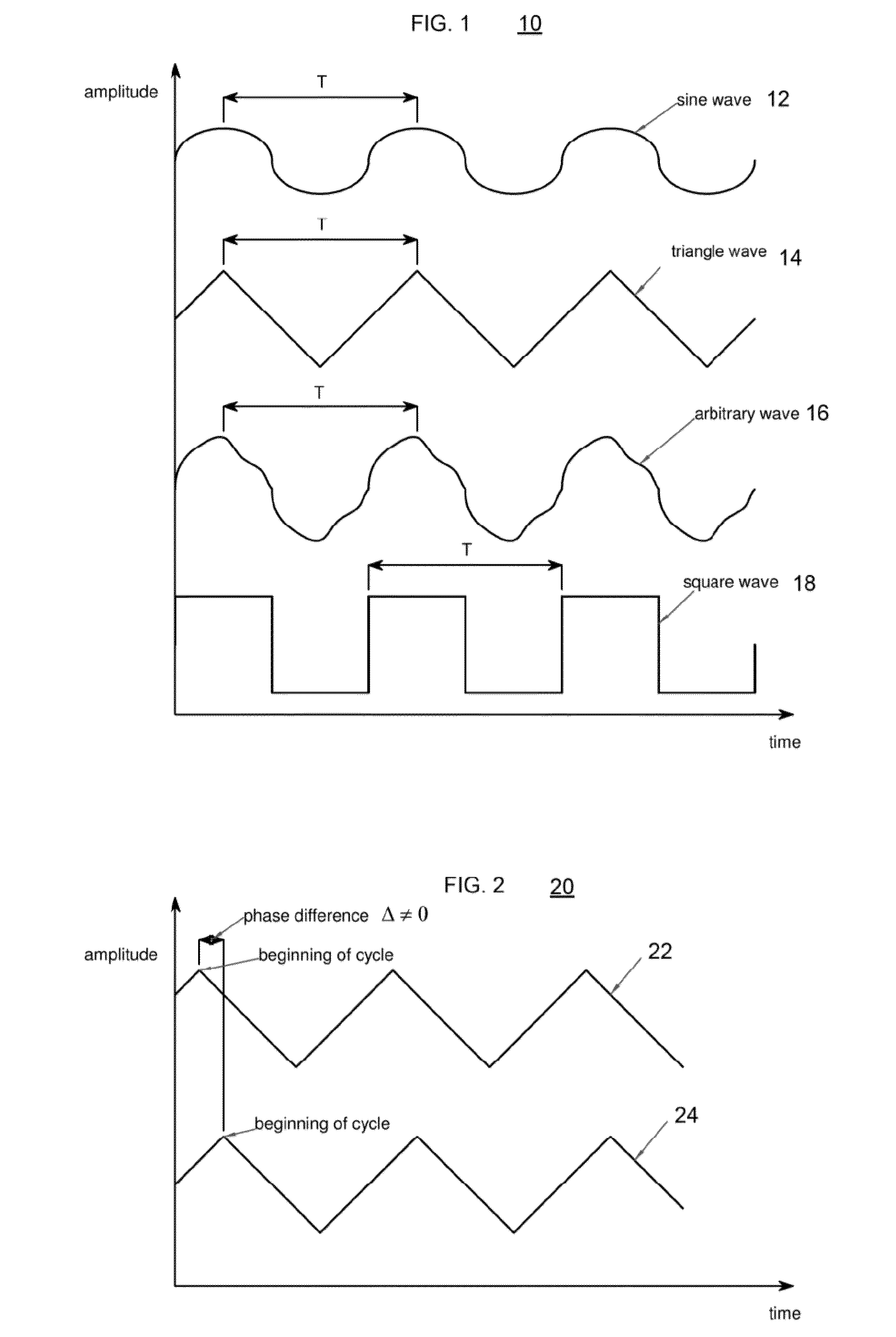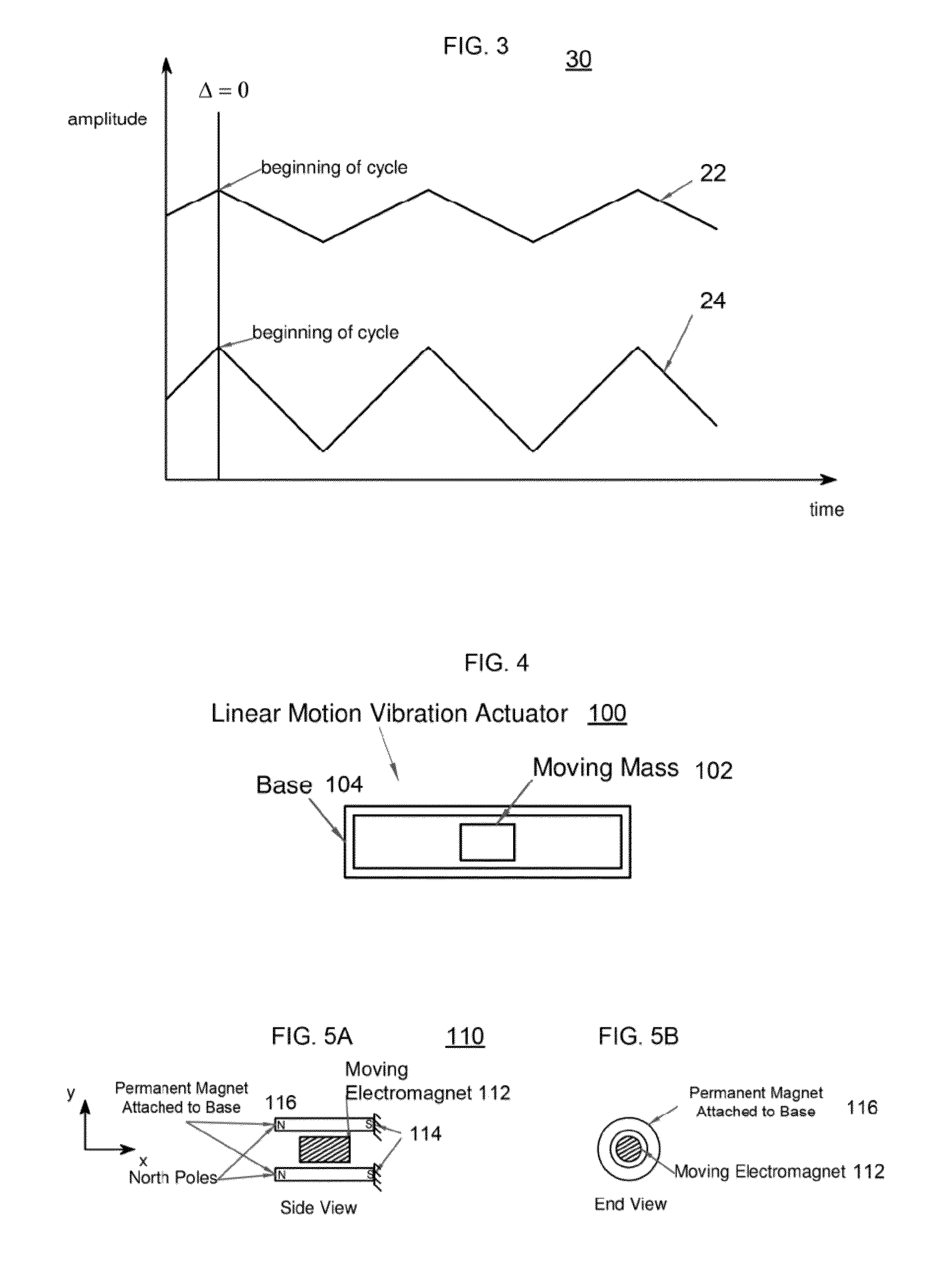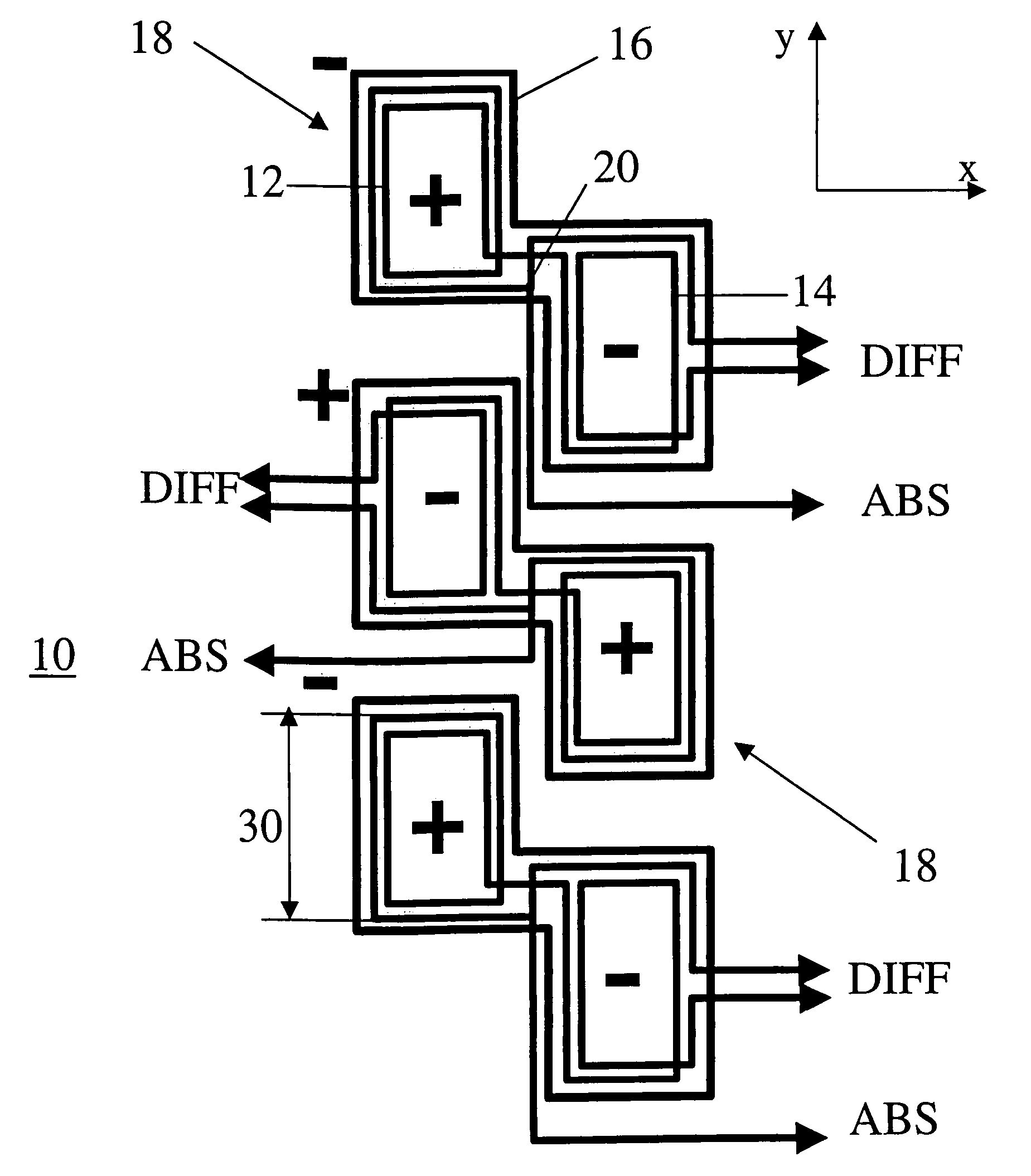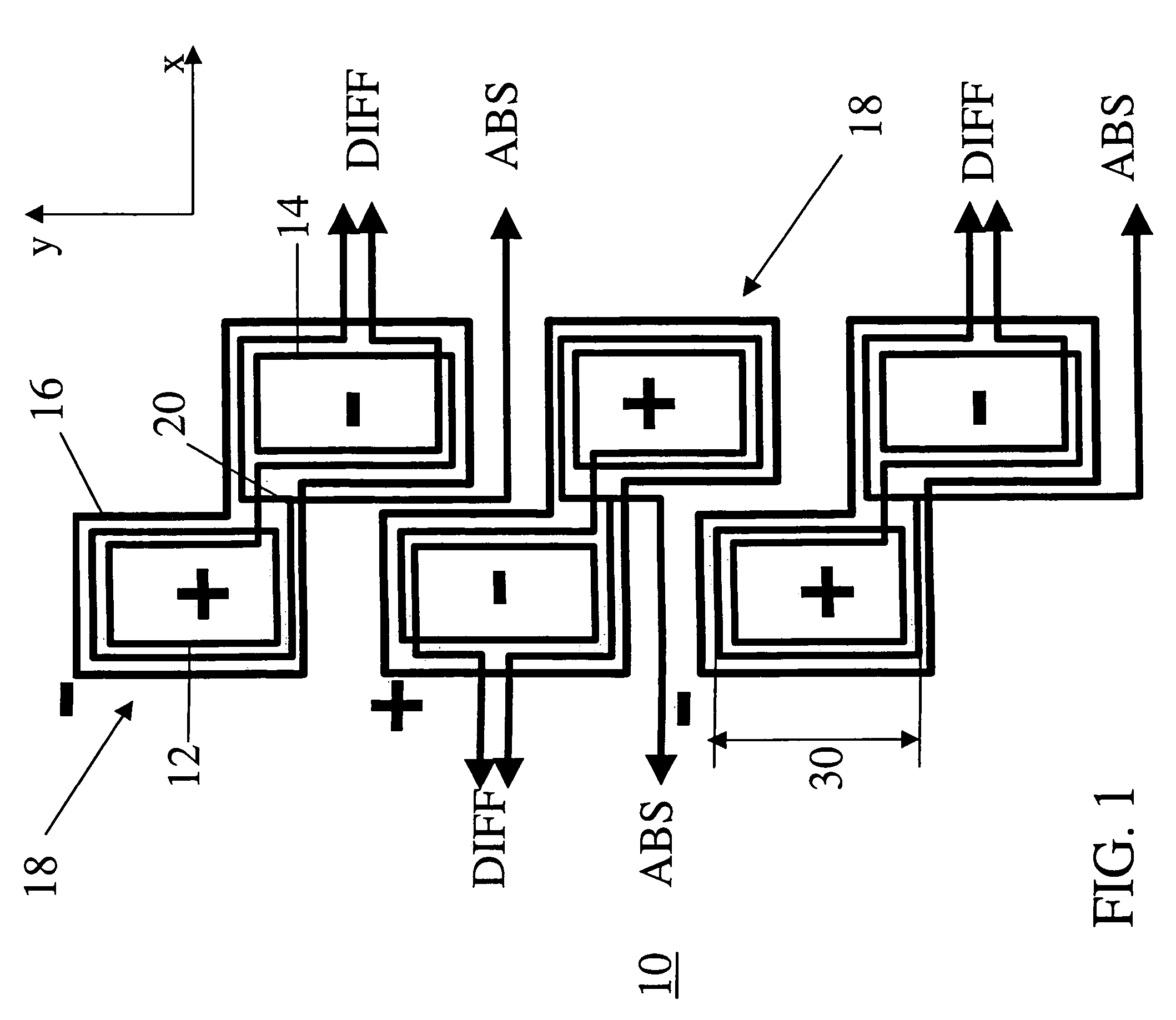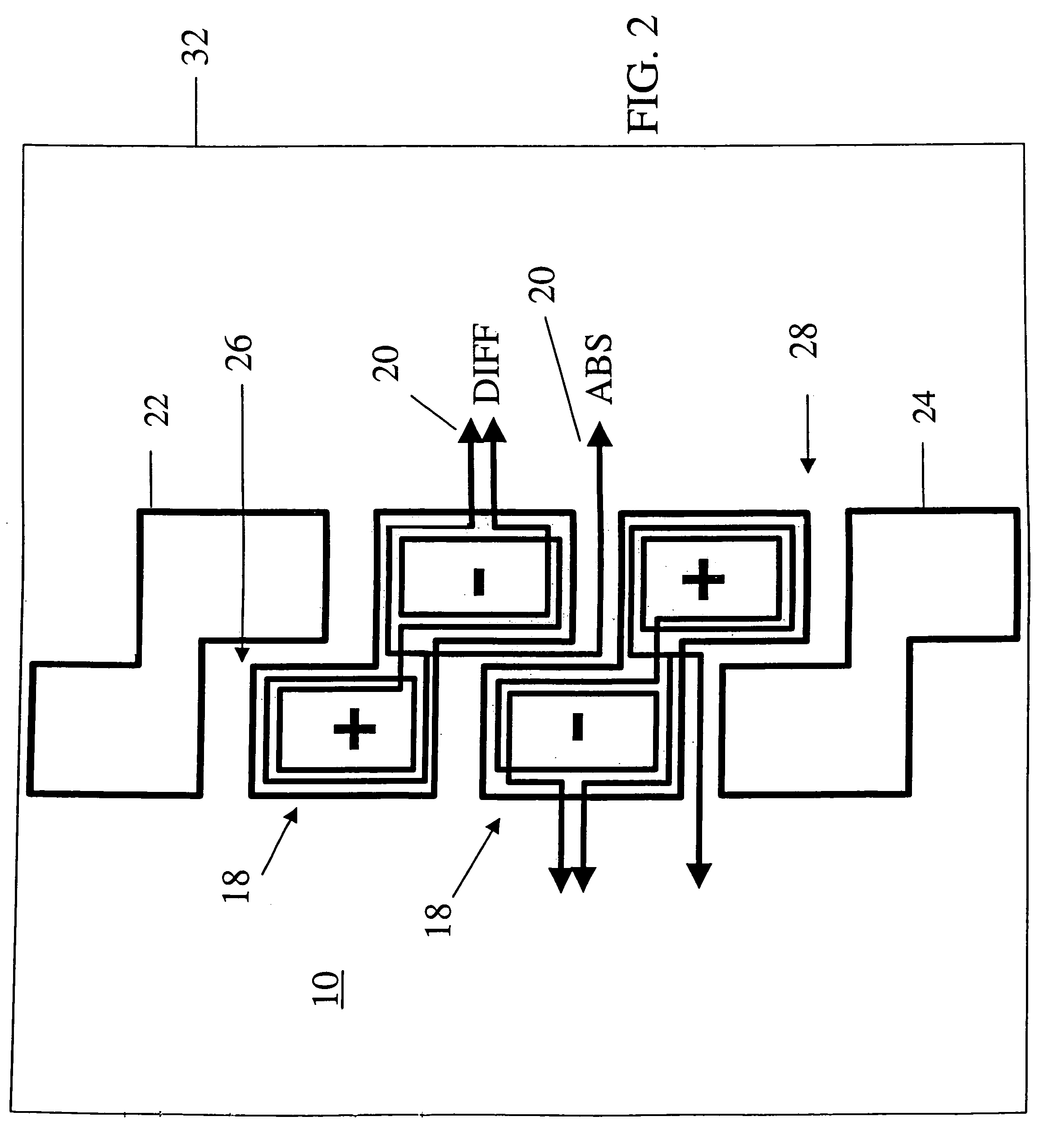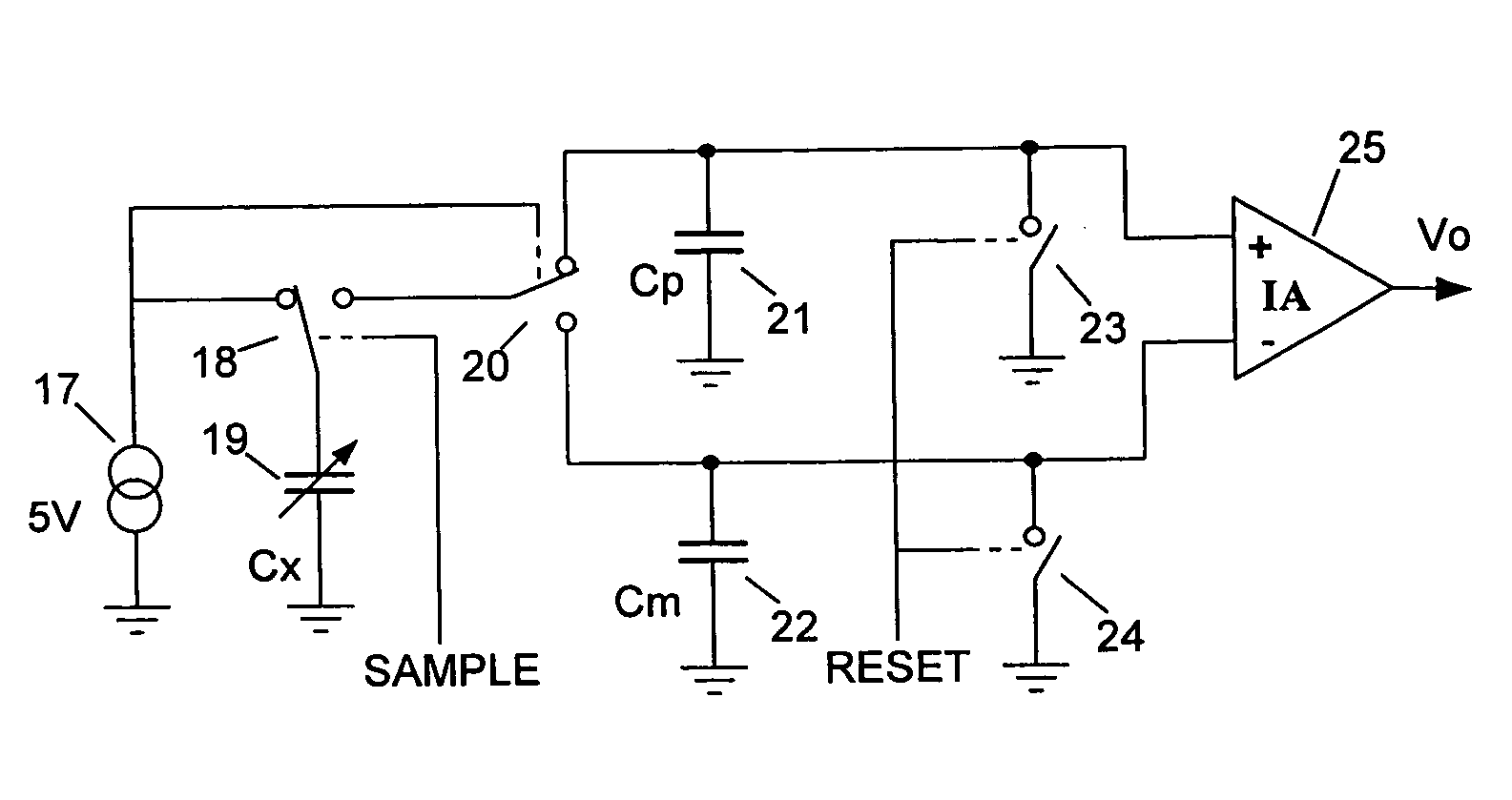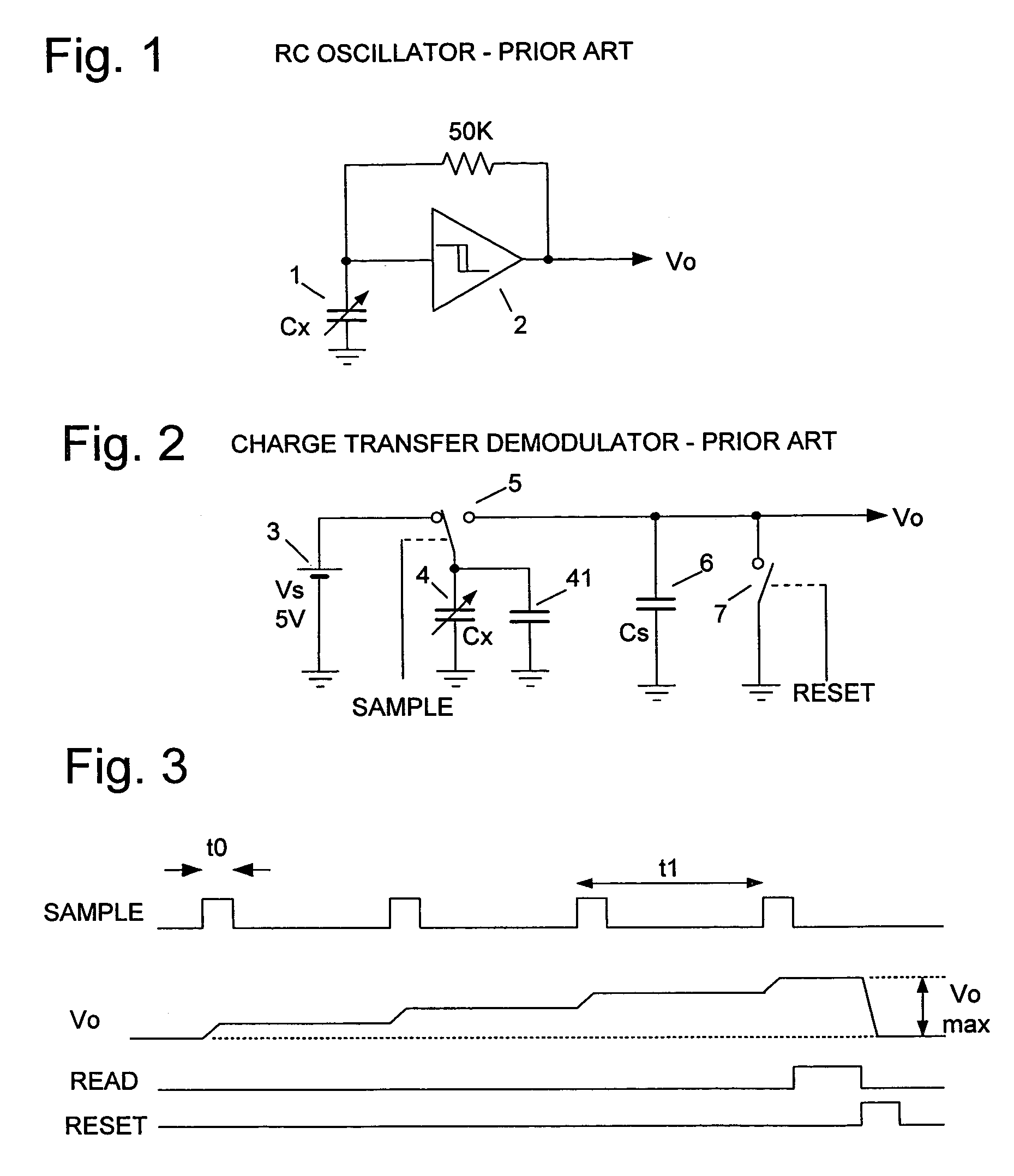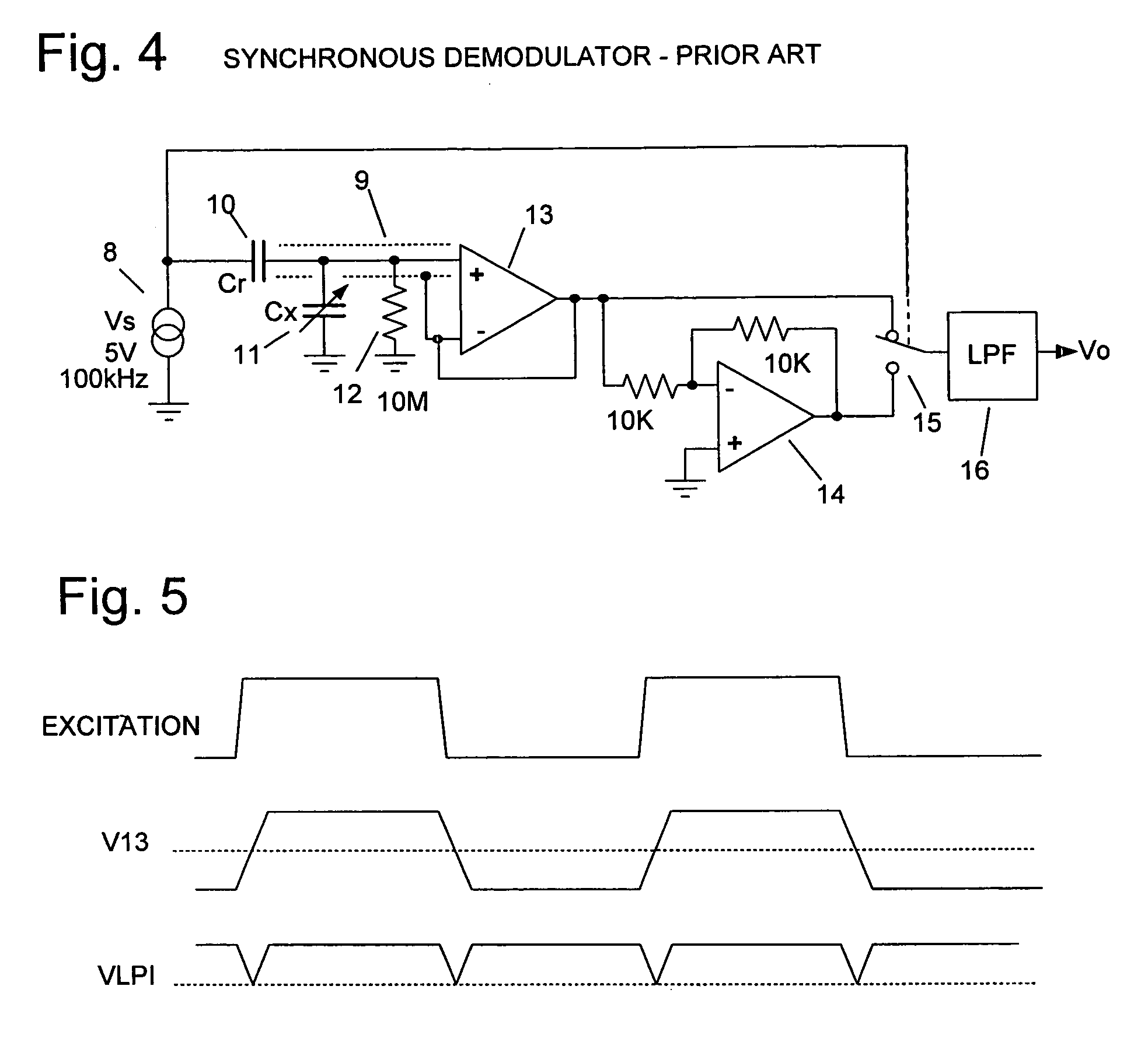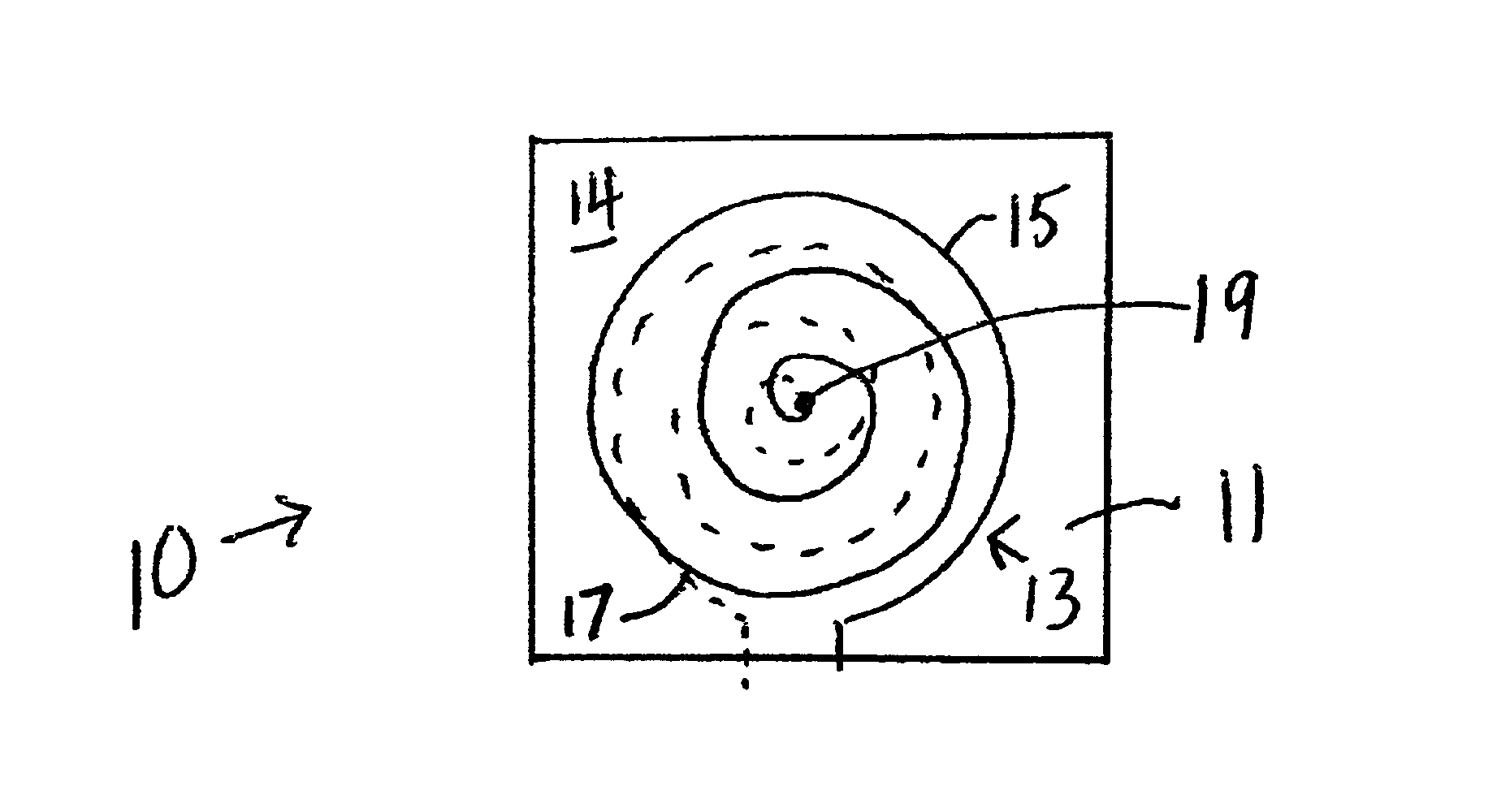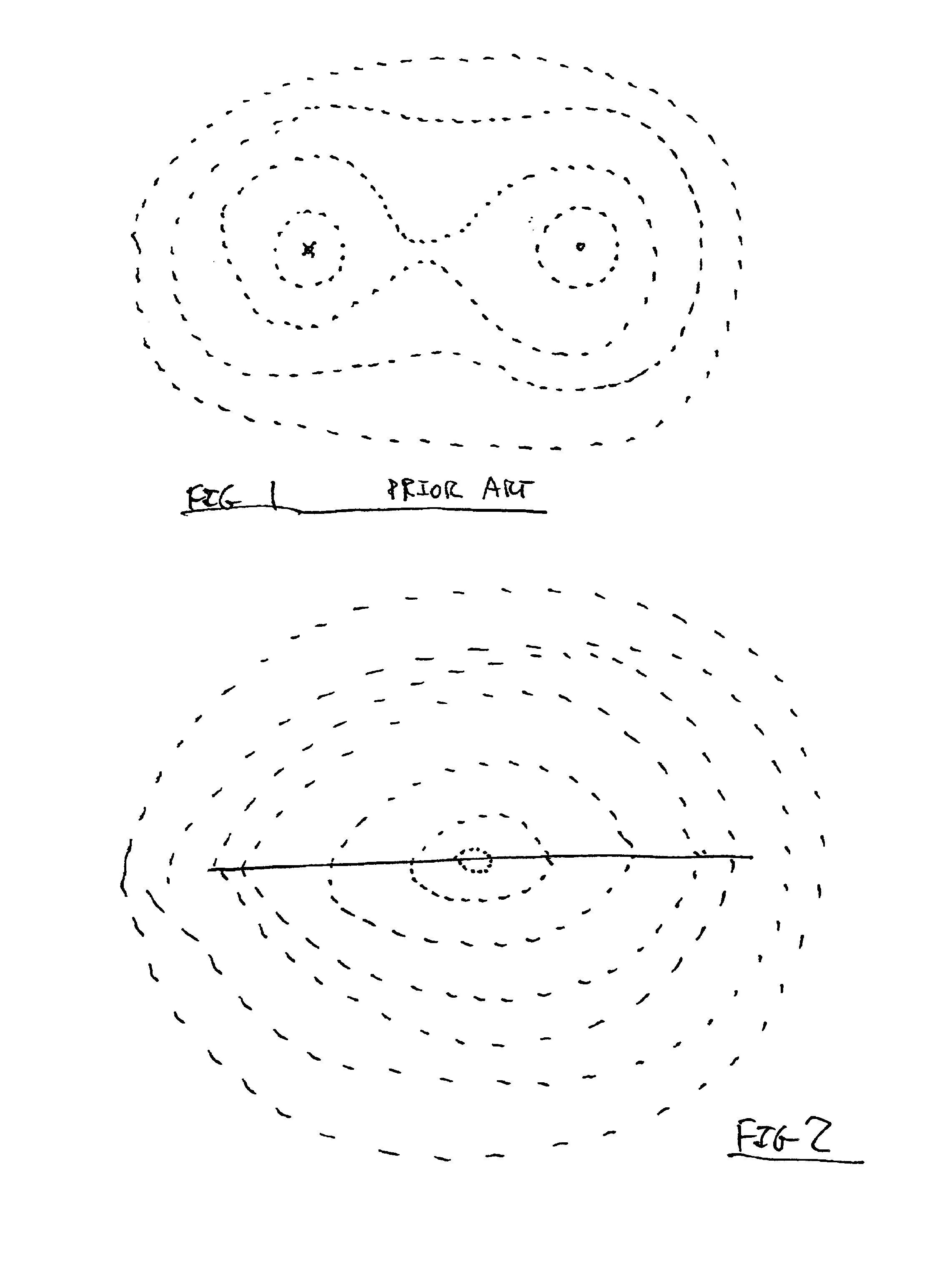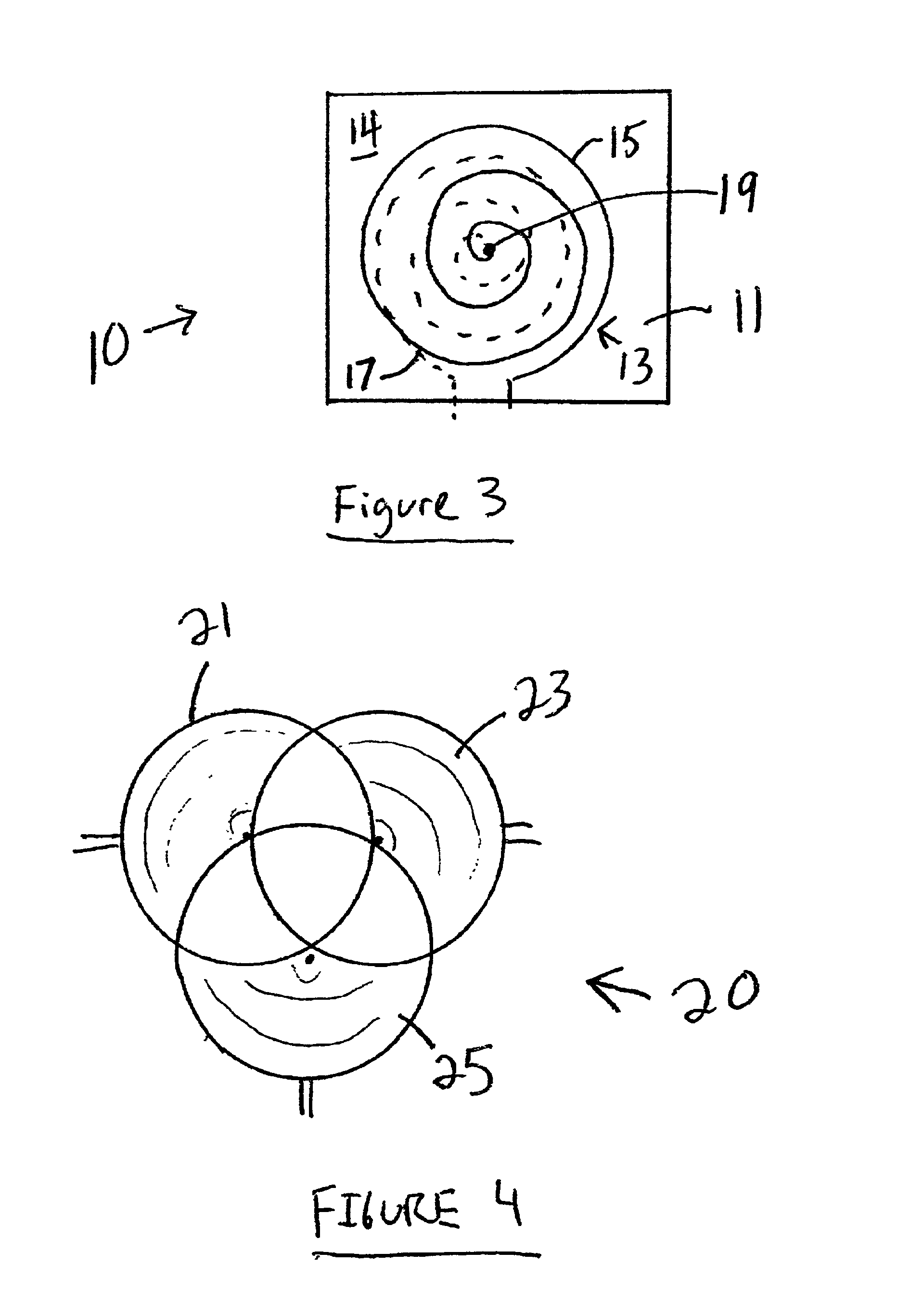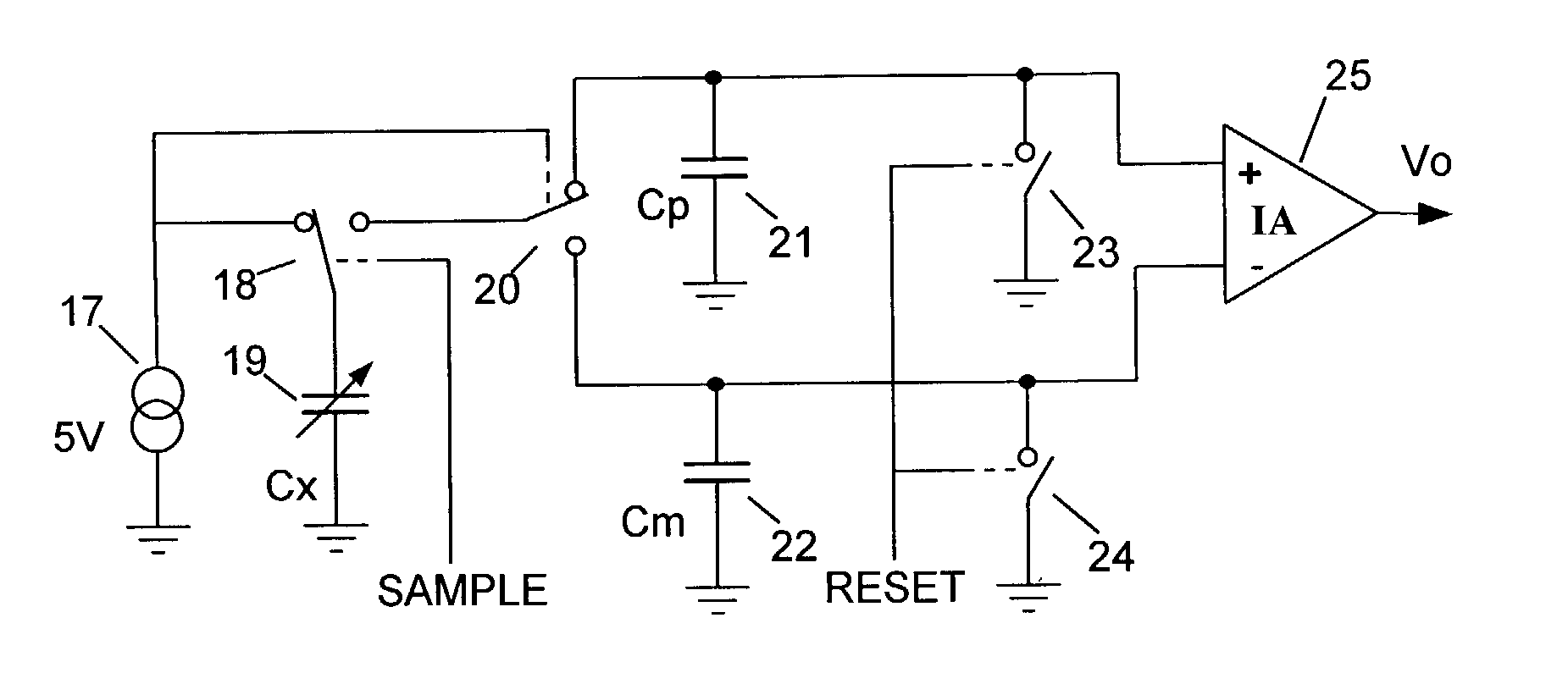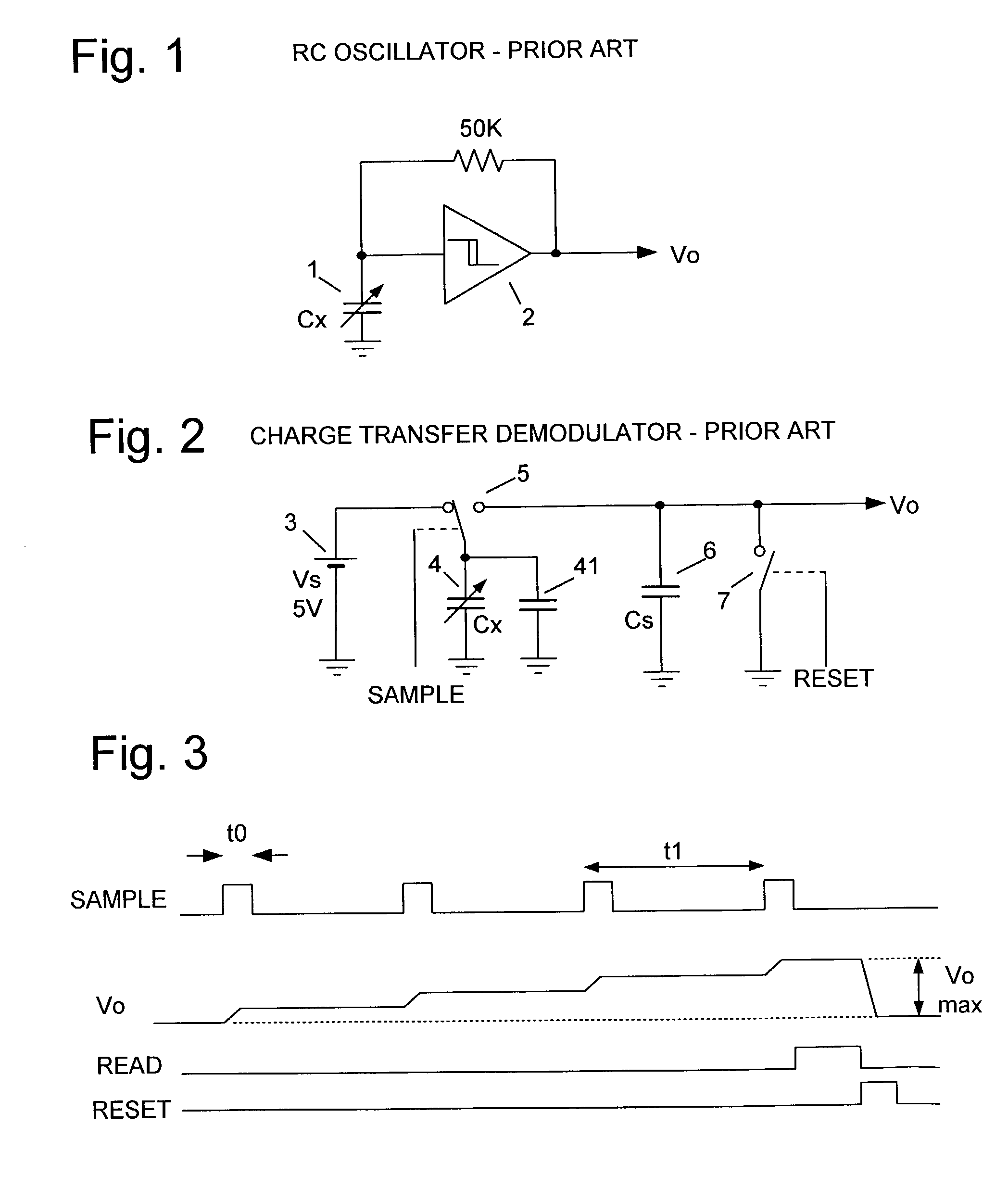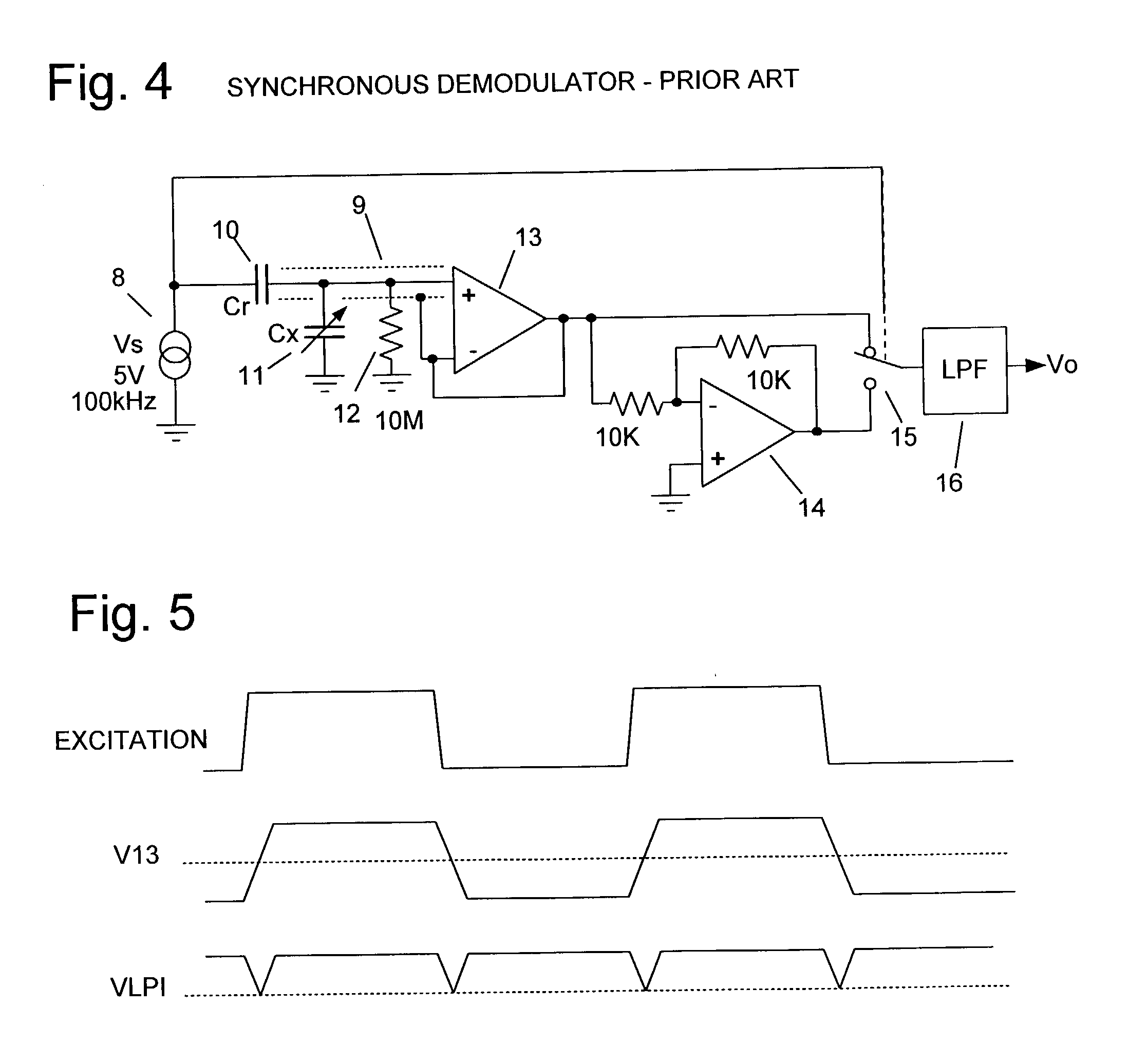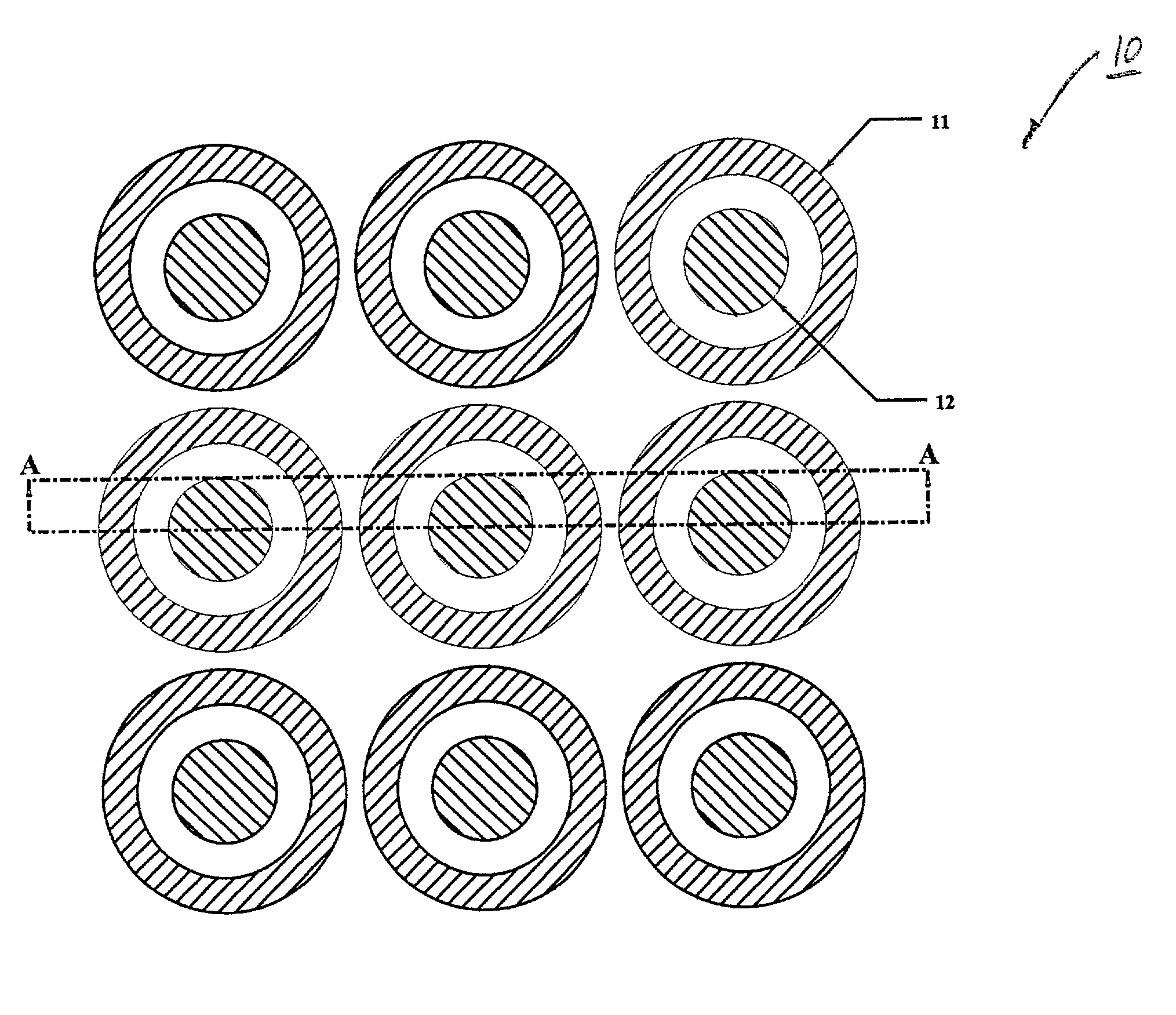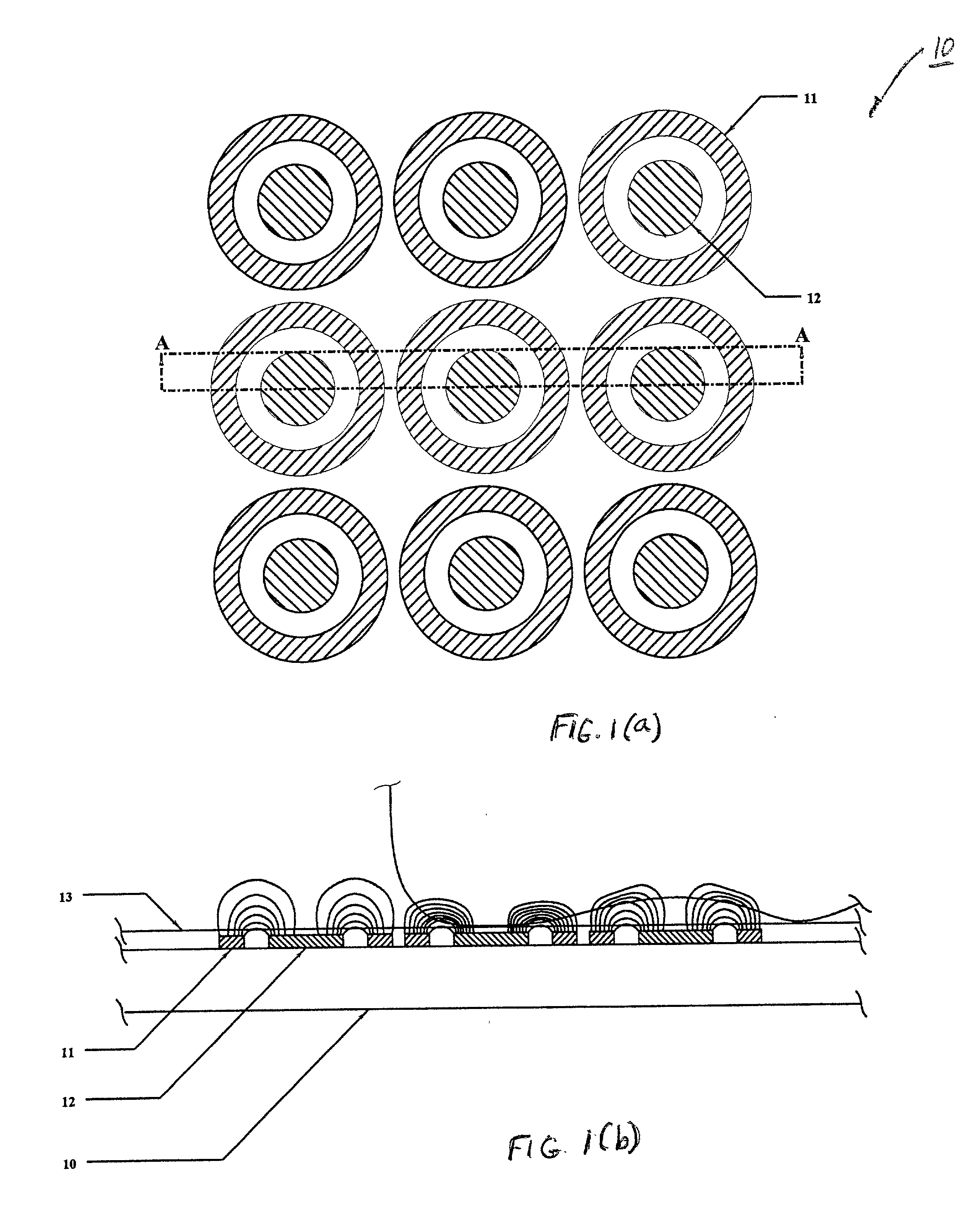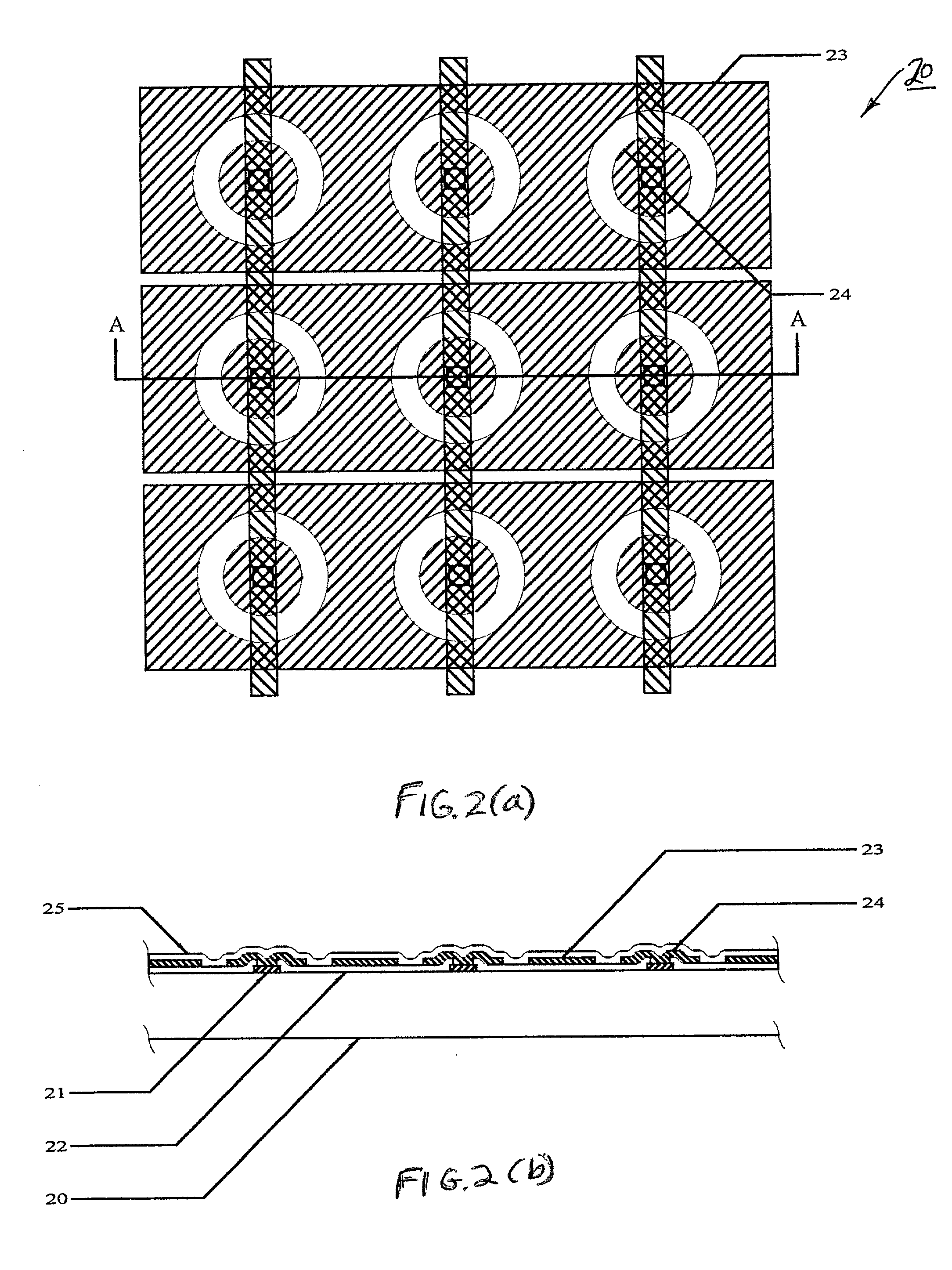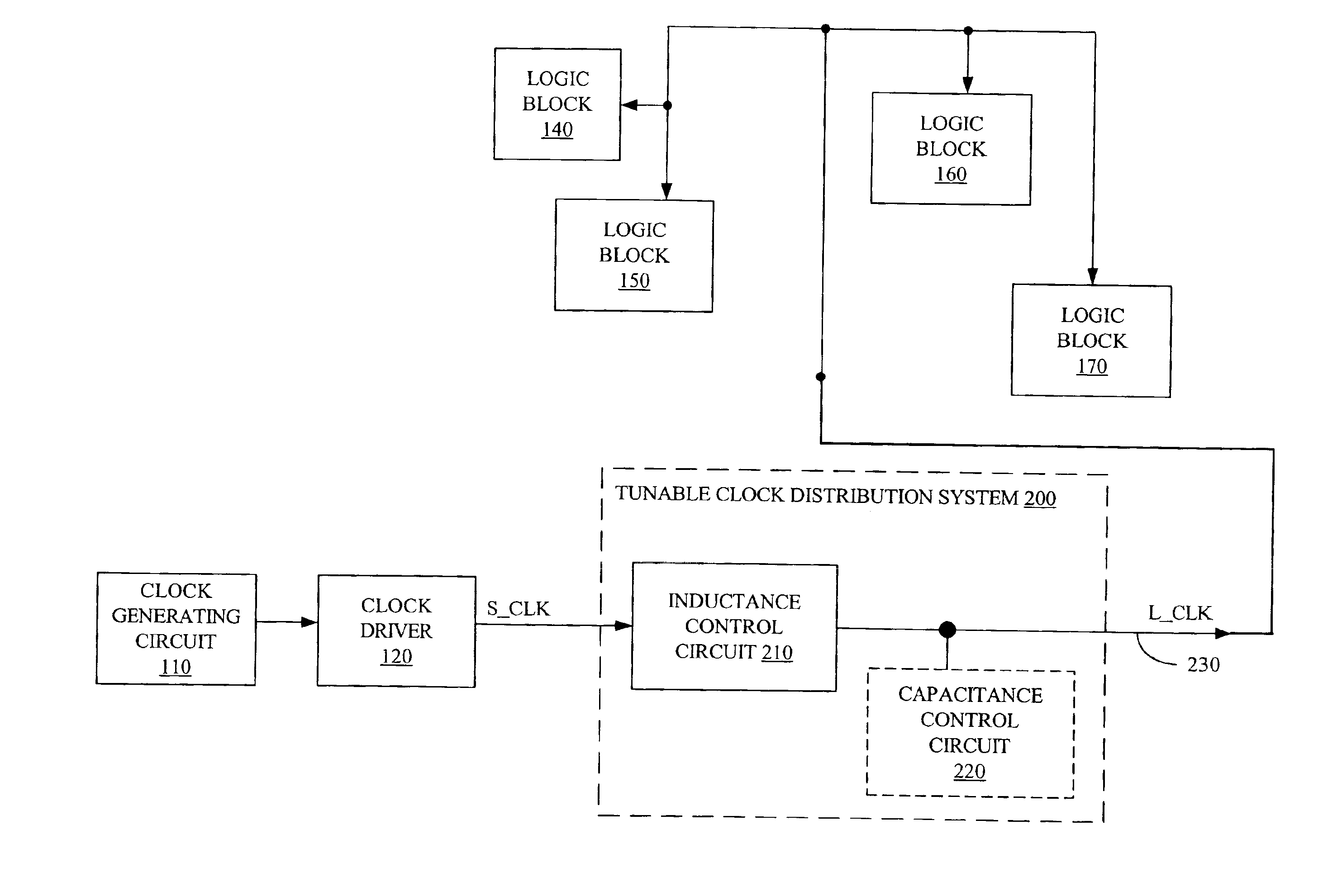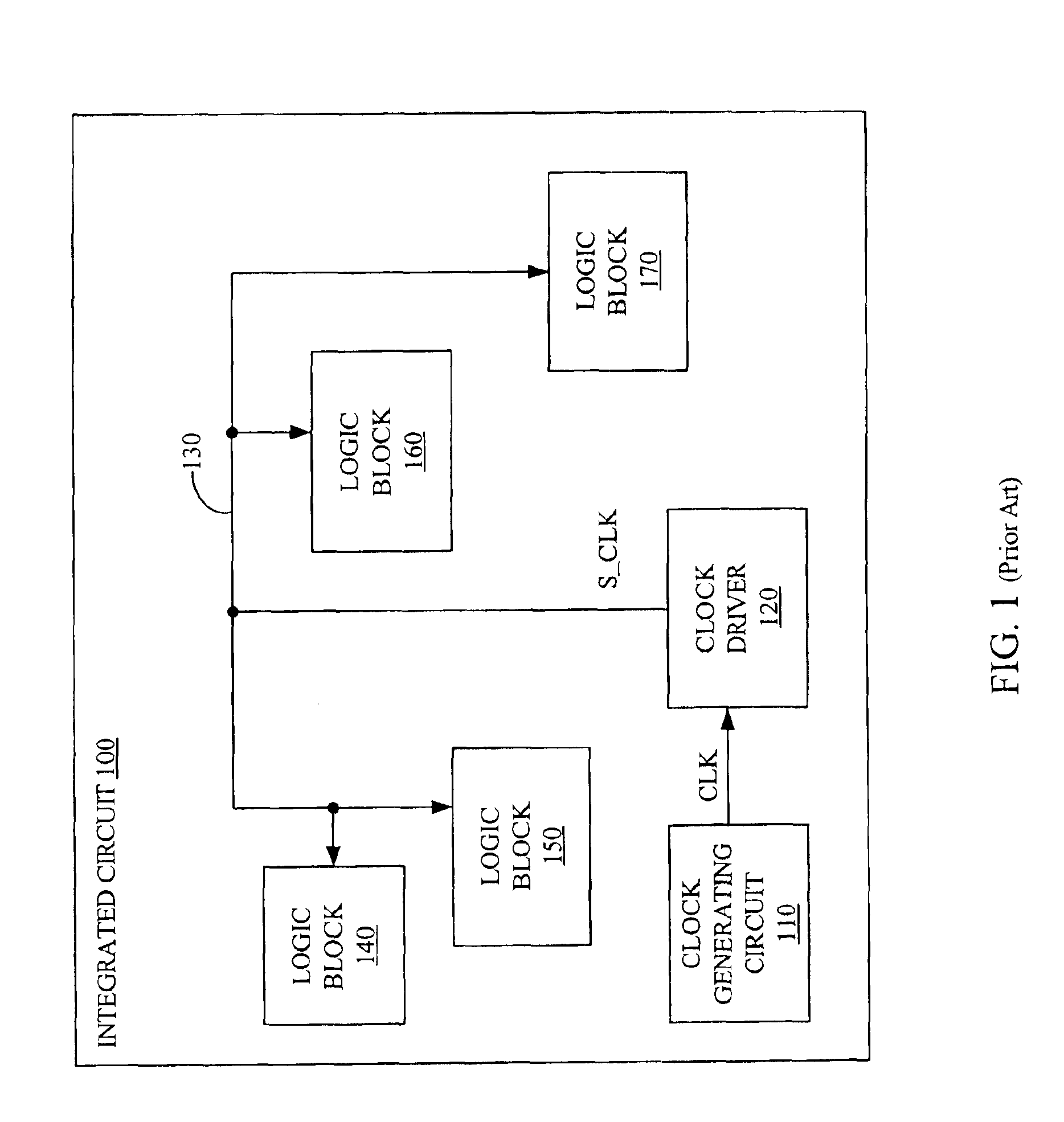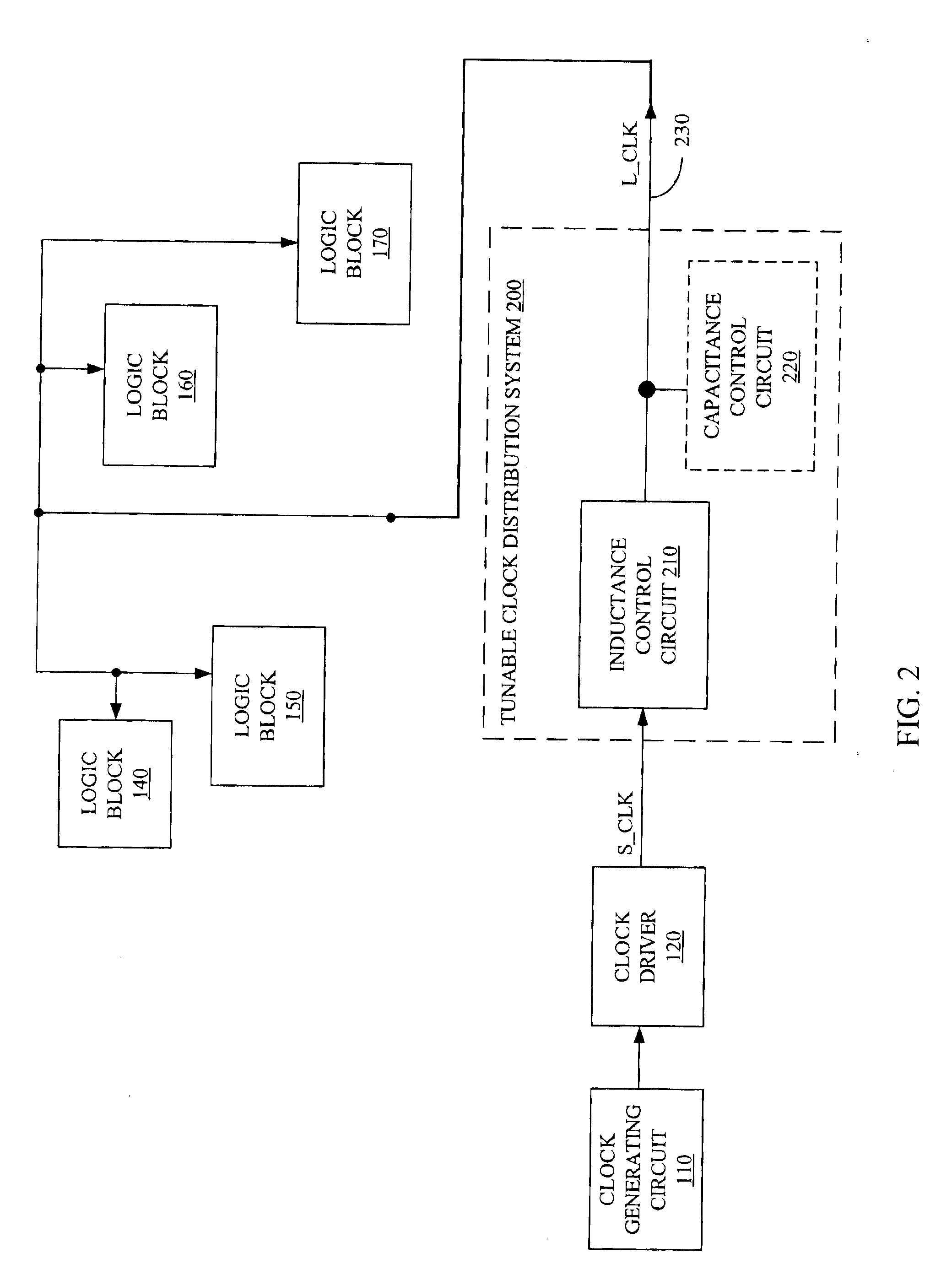Patents
Literature
Hiro is an intelligent assistant for R&D personnel, combined with Patent DNA, to facilitate innovative research.
9548results about "Converting sensor output electrically/magnetically" patented technology
Efficacy Topic
Property
Owner
Technical Advancement
Application Domain
Technology Topic
Technology Field Word
Patent Country/Region
Patent Type
Patent Status
Application Year
Inventor
Capacitive sensor systems and methods with increased resolution and automatic calibration
InactiveUS6940291B1Small capacitance changeReliable measurementResistance/reactance/impedenceElectronic switchingFiberDigital signal processing
Methods and systems for capacitive proximity and contact sensing employ one or more simple sensors (which may be a conductive fiber or pattern of conductive ink) in communication with a microcontroller. Digital signal processing executed by the microcontroller enables resolution enhancement, automatic and continuous calibration, noise reduction, pattern recognition and the configuration of virtual sensors capable of detecting how an object incorporating the sensors is being manipulated.
Owner:IROBOT CORP
Capacitive field sensor with sigma-delta modulator
A capacitive sensor includes a switching capacitor circuit, a comparator, and a charge dissipation circuit. The switching capacitor circuit reciprocally couples a sensing capacitor in series with a modulation capacitor during a first switching phase and discharges the sensing capacitor during a second switching phase. The comparator is coupled to compare a voltage potential on the modulation capacitor to a reference and to generate a modulation signal in response. The charge dissipation circuit is coupled to the modulation capacitor to selectively discharge the modulation capacitor in response to the modulation signal.
Owner:CYPRESS SEMICON CORP
Medication injector apparatus with drive assembly that facilitates reset
A medication injector apparatus such as an injection pen. The injection pen includes a resettable, cartridge plunger drive assembly including an axially floating nut, a cartridge plunger engaging screw, and a drive clutch movable with the nut and which when rotated causes the screw to screw through the nut. When a cartridge assembly is mounted to the pen base, the floating nut and drive clutch are shifted proximally such that the drive clutch is in torque transmitting engagement with a rotatable drive member of the pen, such that rotation of that drive member results in drive screw advancement through the nut in the distal direction. When the cartridge assembly is not mounted to the pen base, the floating nut and drive clutch are biased distally to disengage the drive clutch from torque transmitting engagement with the rotatable drive member and to thereby allow the drive screw to be reset proximally through the nut to a position more retracted within the pen base. The injection pen also may include an injection clicker assembly having a collar arranged coaxially on a drive sleeve and which oscillates axially on the drive sleeve that rotates during medication dispensing to provide an audible clicking sound that indicates injecting use of the pen. The injection pen also may include a doseable quantity identifier that uses a rotational matrix and a sensor for electrically sensing the arrangement of the dose setting mechanism of the pen, which identifier may be part of a therapeutic dose indicating system that utilizes a cartridge recognizer to recognize a concentration of medication so as to allow an automatic determination of a therapeutic dose. The injection pen further may include an assembly for selectively rotating a drive sleeve of the pen, which assembly has a dial that rotates out during dose setting and which translates in without rotation during dose injecting.
Owner:ELI LILLY & CO
Position sensor
A low cost x-y digitising system is provided for use in consumer electronic devices, such as portable digital assistants, mobile telephones, web browsers and the like. The digitiser includes a resonant stylus, an excitation winding for energising the resonant stylus and a set of sensor windings for sensing the signal generated by the stylus, from which the x-y position of the stylus is determined.
Owner:SINNAPTIX
Position sensor having compact arrangement of coils
InactiveUS6522128B1Easy to manufactureLow costElectric signal transmission systemsUsing electrical meansElectricityTransducer
A transducer is provided for use in a position sensor which senses the position of two relatively movable members. In one form, the transducer has a plurality of sensor windings having a number of loops arranged in succession and connected in series so that signals induced in adjacent loops by a common electromagnetic field oppose each other and an excitation winding having at least one loop super-imposed on but electrically isolated from the loops of the sensor windings.
Owner:SINNAPTIX
Charge transfer capacitive position sensor
ActiveUS20040104826A1Small sizeDistributed capacitance increasesInput/output for user-computer interactionElectronic switchingCapacitanceEngineering
Owner:ATMEL CORP
Encoding and sensing of syringe information
InactiveUS7018363B2Efficient disseminationImprove reliabilityJet injection syringesMedical devicesBiomedical engineeringInjector
Owner:BAYER HEALTHCARE LLC
Charge transfer capacitive position sensor
InactiveUS7148704B2Small sizePrecise positioningInput/output for user-computer interactionResistance/reactance/impedenceCapacitanceRelative Change
Owner:ATMEL CORP
Method and apparatus for providing information from a speed and direction sensor
InactiveUS7026808B2Resistance/reactance/impedenceUsing electrical meansEngineeringDirection information
A method and apparatus for providing information from a speed and direction sensor is disclosed. The method and apparatus detect the presence of a ferromagnetic object as it moves past a sensor. The sensor determines speed and direction information regarding the ferromagnetic object, and further provides information relating to the environment surrounding the sensor or object, such as the status of an air gap between the sensor and the moving object, and the temperature of the environment in which the sensor or object is disposed.
Owner:ALLEGRO MICROSYSTEMS INC
Ultrasonic probe
InactiveUS20060173329A1Easy to controlEasy to returnAnalogue/digital conversionElectric signal transmission systemsUltrasound probe
The ultrasonic probe of the present invention includes an ultrasonic element unit for transmitting and receiving ultrasonic waves, an oscillation mechanism for causing oscillation to the ultrasonic element unit and a detector for detecting the oscillation of the ultrasonic element unit. The detector detects the oscillation angle and the oscillation origin of the ultrasonic element unit, and when the oscillation range of the ultrasonic element unit is divided at its oscillation origin into two regions of a positive region and a negative region, the detector detects in which area the ultrasonic element unit is located. In use of the ultrasonic probe, a control of origin return for returning the ultrasonic element unit to its oscillation origin is performed on the basis of the result of the detection by the detector.
Owner:KONICA MINOLTA INC
Injection Device with a Processor for Collecting Ejection Information
InactiveUS20080188813A1Improve patient safetyHigh dexterityAmpoule syringesAutomatic syringesBiomedical engineeringInjection device
A medication delivery device comprises an injection device having a reservoir comprising a medicament to be ejected, and a sensor arranged to detect an ejection of the medicament from the injection device, the sensor being arranged to output a signal comprising ejecting information, and a processor for collecting and storing the ejection information.
Owner:NOVO NORDISK AS
Displacement detection apparatus
ActiveUS7238931B2Long rangeError minimizationProgramme controlComputer controlLocation detectionAnalog signal
The present invention provides a displacement detection apparatus uses short scales and can provide a long measurable range comparable to a single long scale with a short bed length. The displacement detection apparatus includes a scale, a first head and a second head adapted to detect periodic analog signals of a plurality of different types, a first processing section and a second processing section that detects the first differential value and the second differential value between the immediately preceding positional data and the current positional data obtained by sampling the periodic analog signals of a plurality of different types, a switching section that selectively switches from the first differential value to the second differential value or vice versa, a scale position detection section that detects the scale getting to a predetermined position relative to the first head or a predetermined position relative to the second head, a switching control section that causes the switching section to switch from either of the differential values to the other in response to the detection of the scale getting to the predetermined position, and an addition section that adds the first differential value or the second differential value selectively switched by the switching control section and outputting it as positional information.
Owner:DMG MORI CO LTD
Position detector
InactiveUS6249234B1Avoid the needSuitable and convenientElectric signal transmission systemsUsing electrical meansElectrical conductorFull Relative
A position detector is provided for detecting the relative movement of first and second members which are mounted for relative movement along a measuring path. One of the members comprises a magnetic field generator for generating a magnetic field and the other member comprises first and second conductors which are inductively coupled to said magnetic field generator. The arrangement of the first and second conductors and the magnetic field generator is such that output signals are generated in a first and second receive circuits whose position varies with the relative movement between the two members. In addition to carrying information relating to the relative position between the two members, the signals induced in the receive circuits also comprise information defining the relative orientation of the two movable members, and by suitable processing of the received signals the relative orientation of the two members can also be determined. In a preferred form of the invention, the system operates to define the relative position and orientation of the two movable members in first and second directions from which the relative orientation of the two members in a plane containing the two directions can be determined. The signals induced in the receive circuits can also be processed to give an indication of the gap between the two circuits and to provide an indication of the full relative orientation of the two members.
Owner:SINNAPTIX
Method and apparatus for refinably accurate localization of devices and instruments in scattering environments
InactiveUS6968846B2High positioning accuracyAccurately approximatedSurgical navigation systemsUsing mechanical meansElectromagnetic radiationLocation Equipment
A method of localizing a device, medical or otherwise, within a three dimensional environment, the method comprising: (a) transmitting time varying magnetic fields from at least three transmitters, (b) receiving the transmitted electromagnetic radiation as induced voltage signals from at least one receiver mounted on or within said device, and (c) a processing scheme for processing said received voltage signals in order to extract position and orientation localization information for said device, said processing scheme including correction for conducting materials in the vicinity by the use of information gathered from at least three distinct transmission frequencies for each of said transmitters.
Owner:STEREOTAXIS
Position detector
InactiveUS7030782B2Avoid the needSuitable and convenientTransmission systemsElectronic switchingElectrical conductorHemt circuits
A position detector is provided for detecting the relative movement of first and second members which are mounted for relative movement along a measuring path. One of the members comprises a magnetic field generator for generating a magnetic field and the other member comprises first and second conductors which are inductively coupled to said magnetic field generator. The arrangement of the first and second conductors and the magnetic field generator is such that output signals are generated in a first and second receive circuits whose position varies with the relative movement between the two members. In addition to carrying information relating to the relative position between the two members, the signals induced in the receive circuits also comprise information defining the relative orientation of the two movable members, and by suitable processing of the received signals the relative orientation of the two members can also be determined. In a preferred form of the invention, the system operates to define the relative position and orientation of the two movable members in first and second directions from which the relative orientation of the two members in a plane containing the two directions can be determined. The signals induced in the receive circuits can also be processed to give an indication of the gap between the two circuits and to provide an indication of the full relative orientation of the two members.
Owner:SINNAPTIX
Position encoder using saturable reactor interacting with magnetic fields varying with time and with position
InactiveUS6118271AElectric signal transmission systemsMagnetic bodiesElectrical conductorConductor Coil
PCT No. PCT / GB96 / 02560 Sec. 371 Date Apr. 17, 1998 Sec. 102(e) Date Apr. 17, 1998 PCT Filed Oct. 17, 1996 PCT Pub. No. WO97 / 14935 PCT Pub. Date Apr. 24, 1997A position encoder is provided for indicating the relative position between first and second relatively movable members. One of the members carries a multi-pole magnetic scale which generates a magnetic field whose magnitude and direction vary with position and the other member carries at least one sense conductor. A saturable magnetic element is located in the positionally varying magnetic field of the magnetic scale and an excitation winding is provided which, when energized, generates a magnetic filed which interacts with the positionally varying magnetic field to cause different portions of the saturable magnetic element to saturate and desaturate at different times. The arrangement of the sense conductor is such that as the magnetic element is driven into and out of saturation, it outputs a signal which is indicative of the position of the magnetic scale relative to the sense conductor.
Owner:SCI GENERICS LTD
Capacitance difference detecting circuit and MEMS sensor
ActiveUS7119550B2Improve accuracyAcceleration measurement using interia forcesResistance/reactance/impedenceCapacitanceMems sensors
Oscillators have capacitors, respectively, whose capacitances change according to an external force and generate first oscillating signals according to the capacitances. Each of the capacitors is disposed, for example, between a substrate and a mass body that is movably disposed to face the substrate and oscillates in a direction perpendicular to the substrate. A detecting unit detects a relative difference between the capacitances of the capacitors as a difference between frequencies of the first oscillating signals. An angular speed or acceleration applied in a horizontal direction of the substrate is calculated according to the frequency change detected by the detecting unit. Therefore, a capacitance difference detecting circuit and a MEMS sensor that detect a minute change in the capacitances of the two capacitors caused by the external force are formed.
Owner:MONTEREY RES LLC
Device for measuring the motion of a conducting body through magnetic induction
InactiveUS6850053B2Improve cooling effectReduce thermal noiseAcceleration measurement using interia forcesMagnetic-field-controlled resistorsMeasurement deviceClassical mechanics
A device for measuring a motion of a moving electrically conducting body is disclosed. A magnetic field generated by, for example, electromagnets or permanent magnets, penetrates at least a partial area of the moving body. Two or more measuring devices are arranged outside the magnetic field to measure a measurement magnetic field that is induced by electrical currents in the moving body. The measuring devices are arranged essentially symmetrically with respect to the magnetic field generating means or the moving body. The measurement magnetic field represents at least one motion variable of the moving body. The measuring device is thereby no longer subjected to the temperature-dependent variations of the exciting field.
Owner:SIEMENS AG
Method of fabricating silicon capacitive sensor
InactiveUS6465271B1Good linear sensitivityLong-term stabilityInflated body pressure measurementSemiconductor/solid-state device manufacturingCapacitive pressure sensorDiffusion
Manufacturing all-silicon force sensors, such as capacitive pressure sensors (100, 200) that have long term stability and good linear sensitivity, and can be built into of a pneumatic tire. The sensors include buried electrical feedthrough (112b) to provide an electrical connection into a sealed silicon cavity (108). The buried feedthrough consists of a conductor (112b) in a shallow groove (106) in a substrate (102), communicating between the sensing cavity (108) and an external contact area (110). The sensor designs also feature a method for forming a silicon-to-silicon fusion bond (SFB) wherein at least one of the two surfaces (152, 252) to be has a tough silicon surface unsuitable for good SFB joints because it was bonded heavily boron-doped by means of diffusion. The method of this invention includes preparing each doped surface (152, 252) for SFB by polishing the surface with a Chemical-Mechanical Polishing (CMP) process. The sensor designs can also include optional reference capacitors (141, 241) on the same chip (100, 200) as the sensing capacitor (140, 240). The reference capacitors (141, 241) are insensitive to pressure (force), but respond to ambient temperature changes in the same way as the sensing capacitor. Suitable external interface circuits can utilize the reference capacitors (141, 241) to pull out the majority of ambient temperature effects.
Owner:CASE WESTERN RESERVE UNIV
Signal-balanced shield electrode configuration for use in capacitive displacement sensing systems and methods
ActiveUS20050092108A1Convenient and economical and reliable and compactIncreased complexityForce measurement by measuring magnetic property varationWork measurementElectricityCapacitance
A capacitive encoder includes a signal-balanced shield electrode configuration that does not require electrical ground connection or active sensing and control in order to maintain the shield electrode(s) at a sufficiently constant voltage during capacitive position measurements. The shield electrode configuration is positioned in a capacitive coupling gap between transmitter electrodes and receiver electrodes during operation. The shield electrode configuration is patterned in a manner that complements the layout of the transmitter electrodes, such that the shield electrode configuration inherently floats at a nominally constant electrical potential when coupled to the signals present on the transmitter electrodes. The resulting capacitive encoder is thus more economical to build, convenient to install, and reliable during operation than capacitive encoders which use an electrical connection, compensation drive circuitry, or grounding in order to control the potential of a shield member that operates at a potential that is not inherently constant.
Owner:ANDERMOTION TECH
Capacitive two dimensional sensor
InactiveUS6525547B2Resistance/reactance/impedenceMeasurement arrangements for variableSemiconductorCapacitive measurement
A two dimensional array of electrods for sensing the presence or absence of the ridges in a fingerprint through capacitive measurements. Exciting signals are supplied from outside the array which allows the array to be fabricated from metal and insulator layers on non-semiconductor substrates such as glass or plastic using normal deposition and patterning techniques. A top protective layer consisting of hard, rigid material may be provided. The required electronic circuits are preferably located around the periphery of the array.
Owner:SENTRONICS CORP
Differential haptic guidance for personal navigation
ActiveUS20160258758A1Instruments for road network navigationNavigational calculation instrumentsClassical mechanicsActuator
One aspect of the technology involves a system for measuring the rotational position of a rotating shaft, including a field source configured to generate a measurable field, a sensor configured to measure the generated field, and a target that is configured to modify the generated field as measured by the sensor to have a shape with (a) at least one measurable feature for a zero reference point, and (b) a shape that varies throughout one or more angles such that a rotational position of the shaft is determined with a selected angular accuracy. There is also a device that receives a query for the rotational position of the shaft a device that responds to the query. Another aspect involves generating multi-frequency vibrations with a single linear resonant actuator (LRA). This LRA can exhibit a beat pattern in response to being driven by the sum of two different sinusoidal functions.
Owner:COACTIVE DRIVE CORP
Omnidirectional eddy current probe and inspection system
InactiveUS7015690B2Magnetic property measurementsConverting sensor output electrically/magneticallyElectricityElectrical connection
An omnidirectional eddy current (EC) probe includes at least one EC channel having a first and a second sense coil that are offset in a first (x) and a second (y) direction and overlap in at least one of the directions (x,y). At least one drive coil is configured to generate a probing field for the EC channel in a vicinity of the sense coils. An omnidirectional EC inspection system includes an omnidirectional EC array probe (ECAP) that includes a number of EC channels and drive coils. Each EC channel includes first and second sense coils with opposite polarities. The drive coils have alternating polarities. Electrical connections perform differential sensing for respective EC channels. Corrective drive coils are disposed at respective ends of the EC channels and generate probing fields. An eddy current instrument is connected to the omnidirectional ECAP and receives differential sensing signals from the EC channels.
Owner:GENERAL ELECTRIC CO
Capacitive measurement system
InactiveUS7129714B2Reduce and eliminate effectResistance/reactance/impedenceConverting sensor output electrically/magneticallyEngineeringCapacitor
Sensor circuits for the measurement of small variations in the value of a sensing capacitor. An alternating voltage excites the sensing capacitor a predetermined frequency whereby the voltage on the sensing capacitor reverses polarity. This voltage on the sensing capacitor is sampled each time the voltage reverses polarity. An accumulator accumulates the sampled charges from the sensing capacitor. An output signal that represents the charge in the charge accumulating means indicates the measured capacitance.
Owner:BAXTER LARRY K
Spiral magnetic transmitter for position measurement system
InactiveUS6856823B2Easy to operateEasy to useDiagnostic recording/measuringSensorsElectrical conductorUltimate tensile strength
A transmitter consists of a plurality of magnetic transmitters, each of which is substantially planar and made of a spiral shaped conductor. The result is a transmitter having a substantially uniform cross-sectional current density along the radial direction of the spiral from the center to the periphery. Near the plane of a given spiral, magnetic vectors produced by such a conductor arrangement have improved angular characteristics as compared to prior art systems. This results in a larger region with useful vector crossing angles and operation of the system is enhanced as compared to prior art techniques. The transmitters produce magnetic fields which have a monotonically increasing intensity as one approaches the center of the transmitter spiral from any given direction. This feature simplifies and increases the accuracy of sensor position determination. If desired, the turns of the spiral transmitter may become closer together as one goes from the periphery to the center thereof to thereby concentrate the magnetic field more centrally of the transmitter. Transmitters having one or two spiral coils are also contemplated.
Owner:NORTHERN DIGITAL
Magnetic position sensor having a variable width magnet mounted into a rotating disk and a hall effect sensor
InactiveUS6124709AEddy current effect is minimized and eliminatedMagnetic-field-controlled resistorsSolid-state devicesPosition sensorPhysics
A linear analog rotary 360 degree magnetic position sensor assembly for sensing the position of rotating objects. A magnet having a varying width is mounted to a magnet disc. A flux return disc is mounted on a shaft opposed to the magnet disc. The magnet generates a magnetic field in an air gap between the discs. A magnetic field sensor such as a hall effect sensor is positioned in the gap and operates to provide an output signal representative of the magnetic field density as the shaft and disc rotate. The output signal changes magnitude in relation to the relative position of the magnet with respect to the magnetic field sensor.
Owner:CTS CORP ELKHART
Position detection using a spaced apart array of magnetic field generators and plural sensing loop circuits offset from one another in the measurement direction
InactiveUS6124708AReduce manufacturing costReduce sensitivityElectric signal transmission systemsUsing electrical meansElectrical conductorEngineering
Owner:SINNAPTIX
Capacitive sensor circuit with good noise rejection
InactiveUS20040004488A1Improved noise suppressionResistance/reactance/impedenceConverting sensor output electrically/magneticallyNoise suppressionImpedance sensor
This invention describes the deficiencies of current art for sensitive impedance sensors, particularly capacitive sensors, and describes several circuits that improve measurement of small value capacitances, especially in the presence of noise. It also shows various circuit architectures optimized for different capacitive sensing tasks. The circuits also describe a novel method to linearize a conventional charge-transfer capacitive sense circuit and a novel method to eliminate the effect of stray capacitance in charge-transfer capacitive sensors.
Owner:BAXTER LARRY K
Capacitive two dimensional sensor
InactiveUS20020152048A1Resistance/reactance/impedenceMeasurement arrangements for variableEngineeringElectrode array
A two dimensional array of electrodes for sensing the presence or absence of the ridges in a fingerprint through capacitive measurements. Exciting signals are supplied from outside the array which allows the array to be fabricated from metal and insulator layers on non-semiconductor substrates such as glass or plastic using normal deposition and patterning techniques. A top protective layer consisting of hard, rigid material may be provided. The required electronic circuits are preferably located around the periphery of the array.
Owner:SENTRONICS CORP
Tunable clock distribution system for reducing power dissipation
ActiveUS6882182B1Reduce power consumptionMinimize power consumptionElectric pulse generatorGenerating/distributing signalsCapacitanceDistribution system
A tunable clock distribution system is used to minimize the power dissipation of a clock distribution network in an integrated circuit. The tunable clock distribution system provides a tunable inductance on the clock distribution network to adjust a resonant frequency in the tunable clock distribution system. The inductance is tuned so that the resonant frequency of the tunable clock distribution system approaches the frequency of the clock signal on the clock distribution network. As the resonant frequency of the tunable clock distribution system approaches the frequency of the clock signal, the power dissipation of the clock distribution network decreases. Some embodiments also provide a tunable capacitance on the clock distribution network to adjust the resonant frequency of the tunable clock distribution system.
Owner:XILINX INC
Popular searches
Features
- R&D
- Intellectual Property
- Life Sciences
- Materials
- Tech Scout
Why Patsnap Eureka
- Unparalleled Data Quality
- Higher Quality Content
- 60% Fewer Hallucinations
Social media
Patsnap Eureka Blog
Learn More Browse by: Latest US Patents, China's latest patents, Technical Efficacy Thesaurus, Application Domain, Technology Topic, Popular Technical Reports.
© 2025 PatSnap. All rights reserved.Legal|Privacy policy|Modern Slavery Act Transparency Statement|Sitemap|About US| Contact US: help@patsnap.com
